- Sunday 9, 01:05:45
Goodnight from Bergen...
That's it for another memorable Norwegian Championships as we leave the late night revellers to enjoy the Brass Party well into the small hours.
Stavanger's players and supporters may have sore heads in the morning — but congratulations to them, it was some victory.
Well done to all the winners and all the bands that made it another great weekend — and especially the NMF organisers who do such a fine job — and make the press very welcome indeed.
All we hope now is that we miss the eye of the storm that is looking to engulf the UK so that we can get back home — beer is still pretty expensive in these parts...
- Saturday 8, 22:47:41
Result:
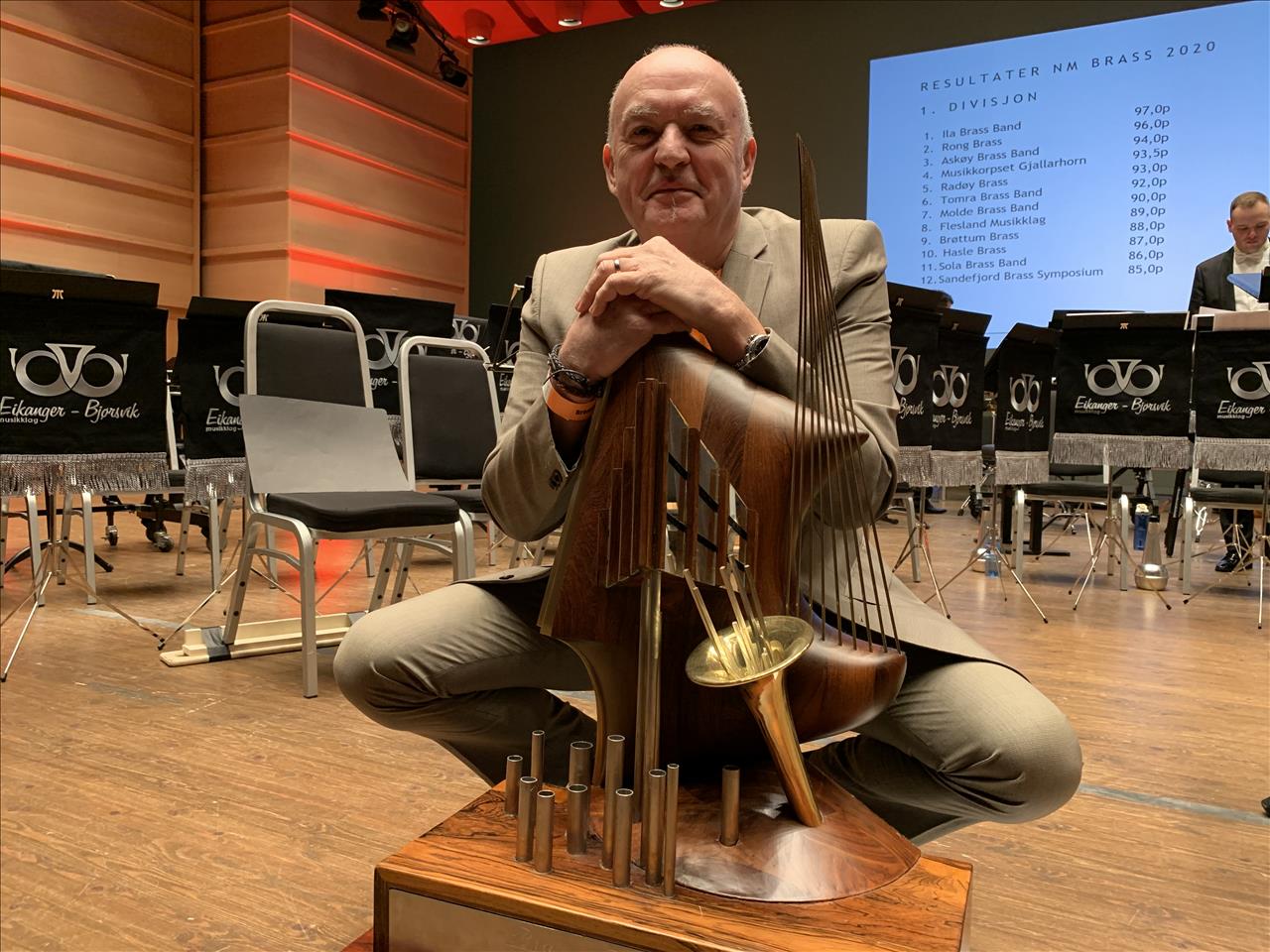
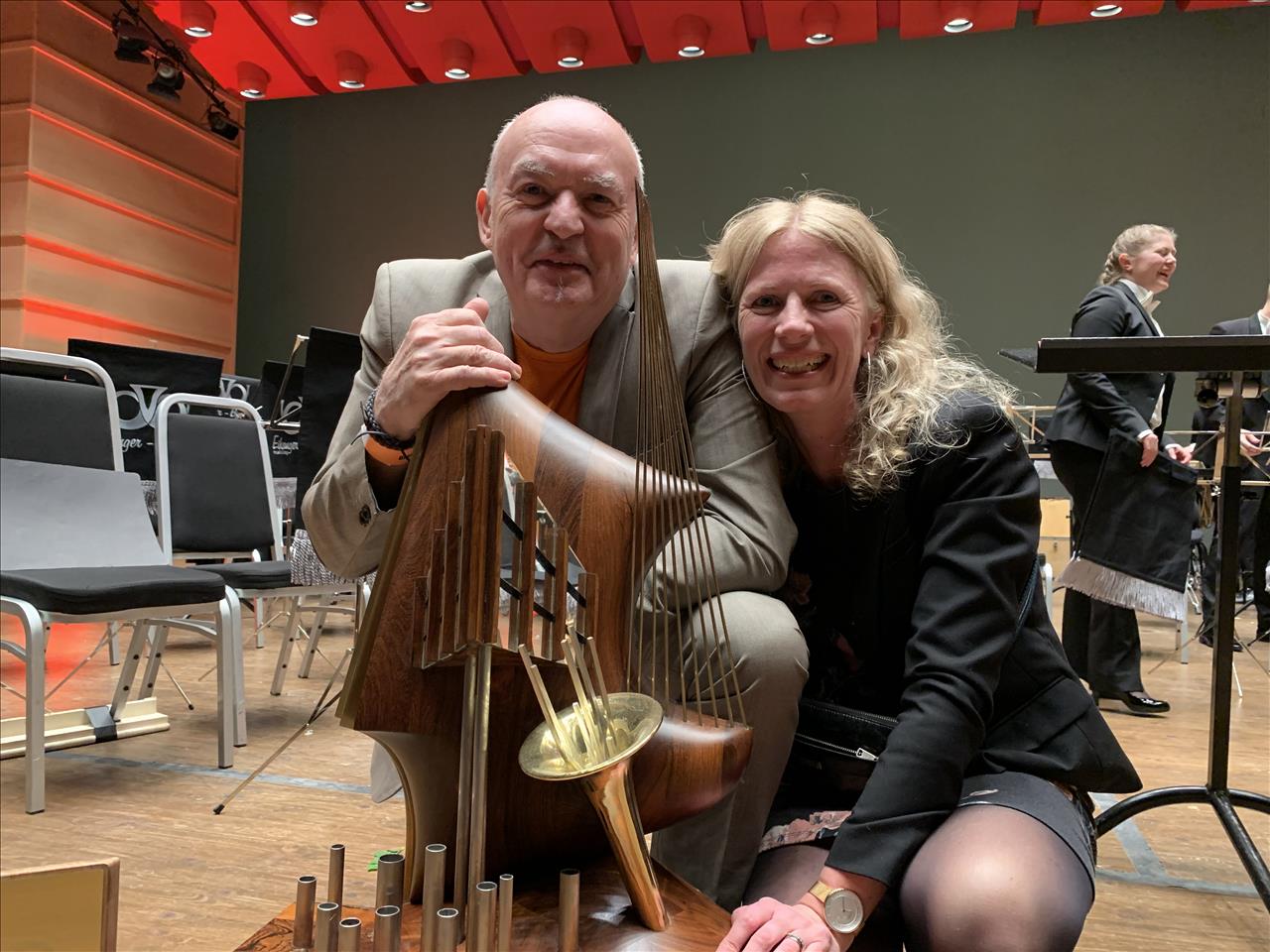
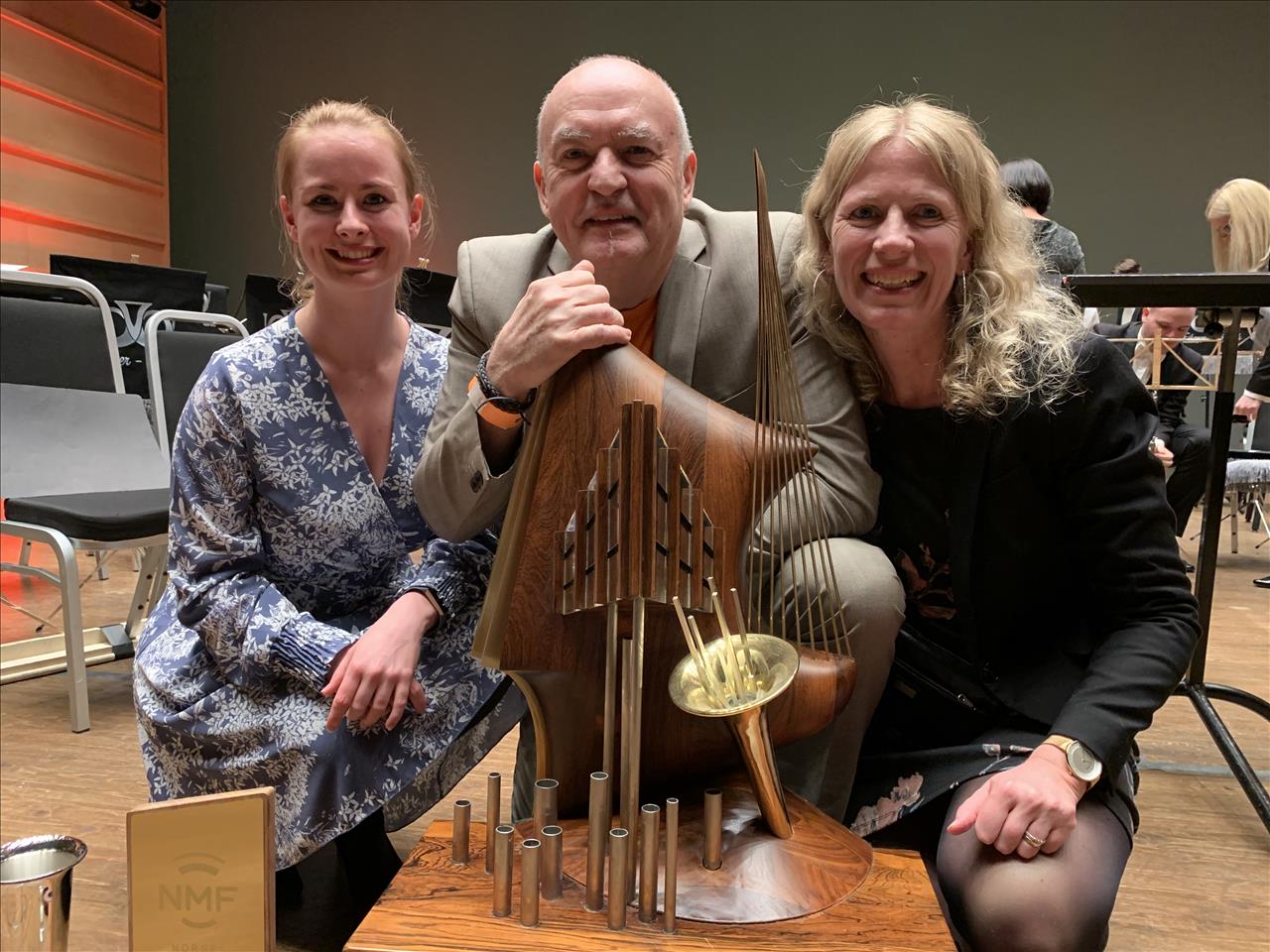
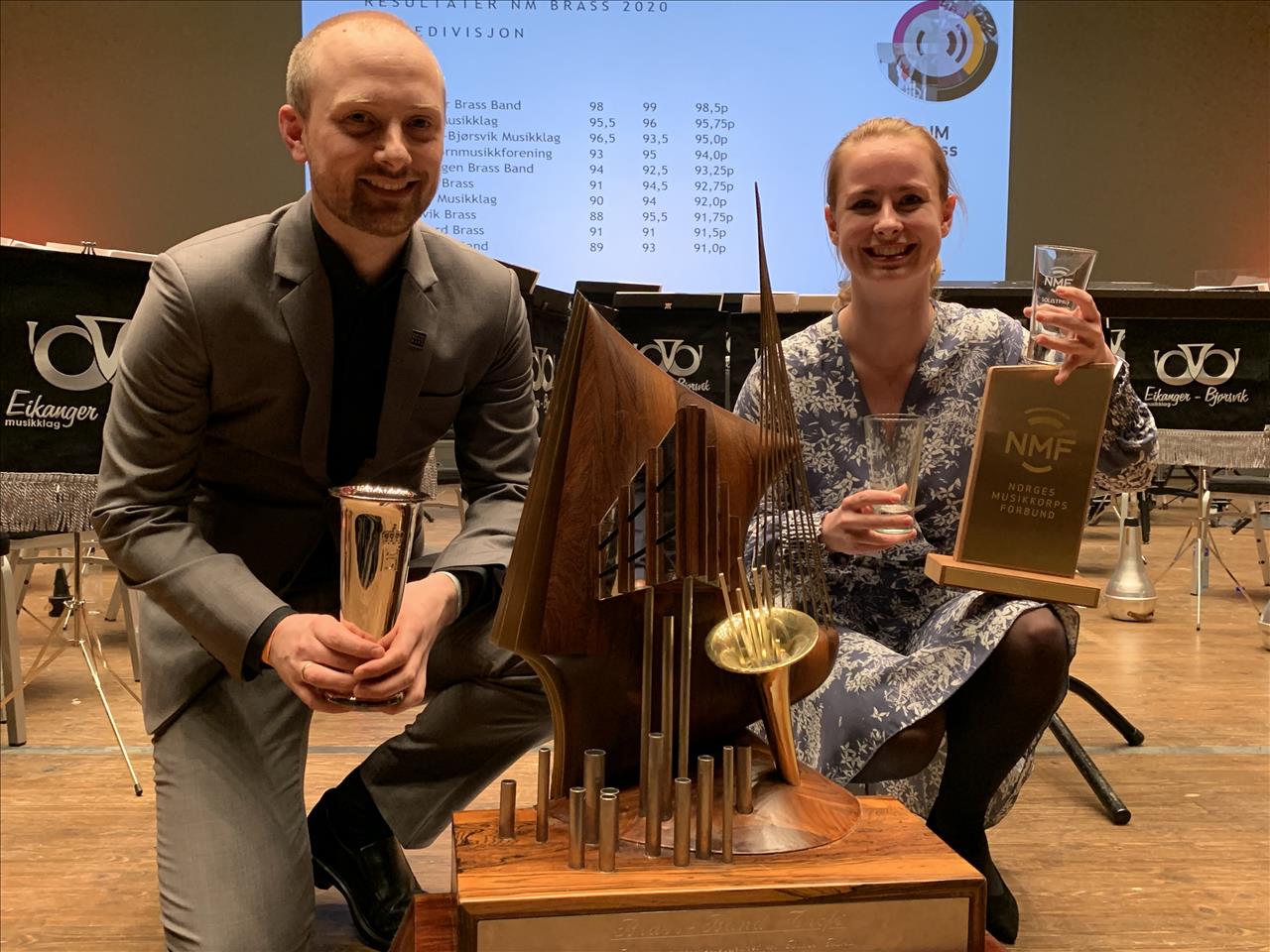
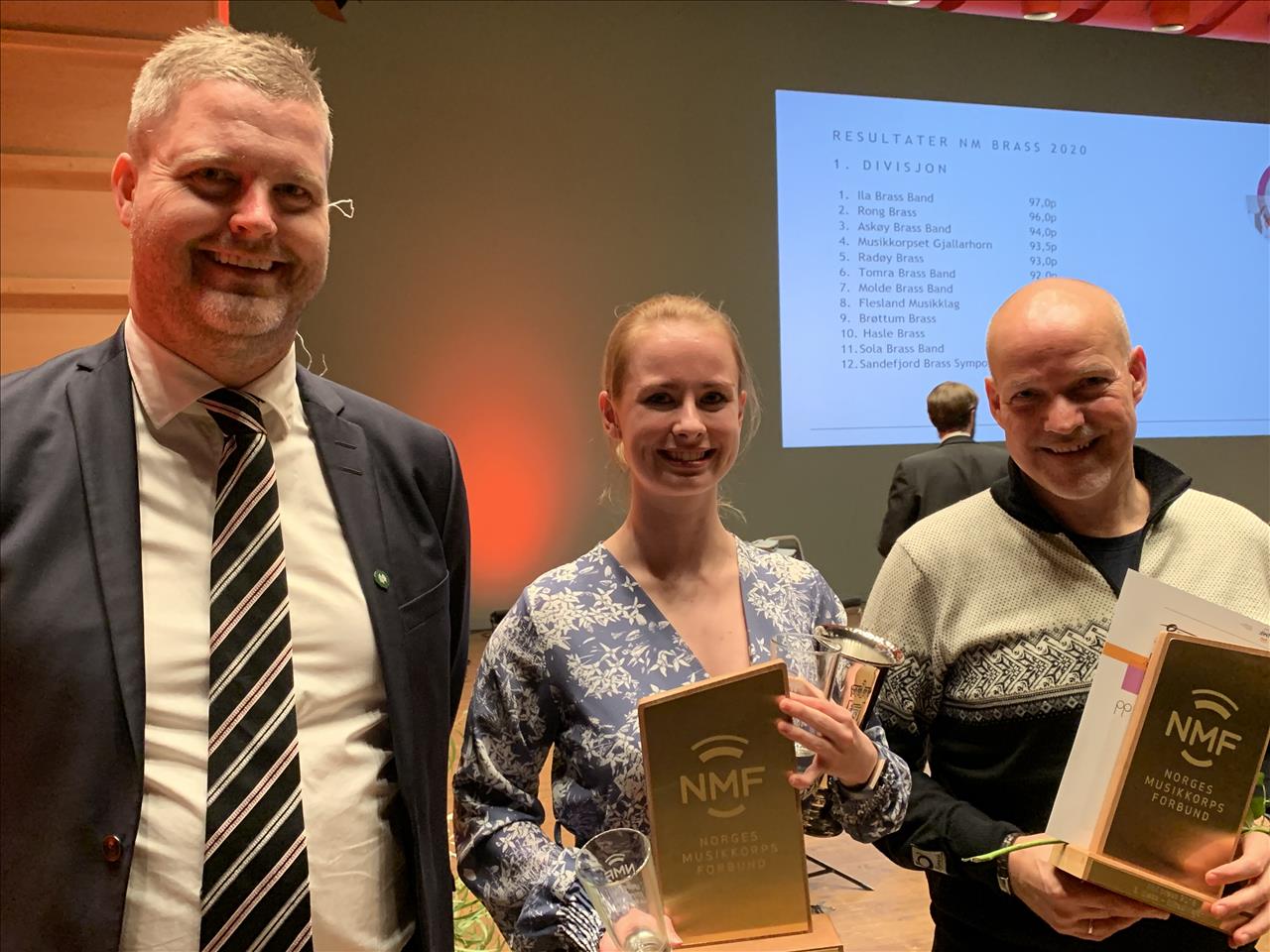
Elite Division:
Adjudicators:
Set Work: Bjorn Sagstad, Kim Lofthouse, Arsene Duc
Own Choice: Rex Martin, Lito Fontana, Sheona White
Set Work/Own Choice = Total1. Stavanger Brass (Allan Withington): 98/99 = 98.5*
2. Manger Musikklag (Peter Sebastian Szilvay): 95.5/96 = 95.75
3. Eikanger Bjorsvik Musikklag (Ingar Bergby): 96.5/93.5 = 95
4. Jaren Hornmusikkforening (Florent Didier): 93/95 = 94
5. Krohnengen (Prof Nicholas Childs): 94/92.5 = 93.25
6. Tertnes Brass (Martin Winter): 91/94.5 = 92.75
7. Kleppe Musikklag (Philip Hannevik): 90/94 = 92
8. Bjorsvik Brass (Andreas Hanson): 88/95.5 = 91.75
9. Oslofjord Brass (Frode Amundsen): 91/91 = 91.5
10. Oslo Brass (Ivan Meylemans): 89/93 = 91*Stavanger Brass receives invitation to represent Norway at the 2021 European Championships in Malmo, Sweden
- Saturday 8, 22:35:21
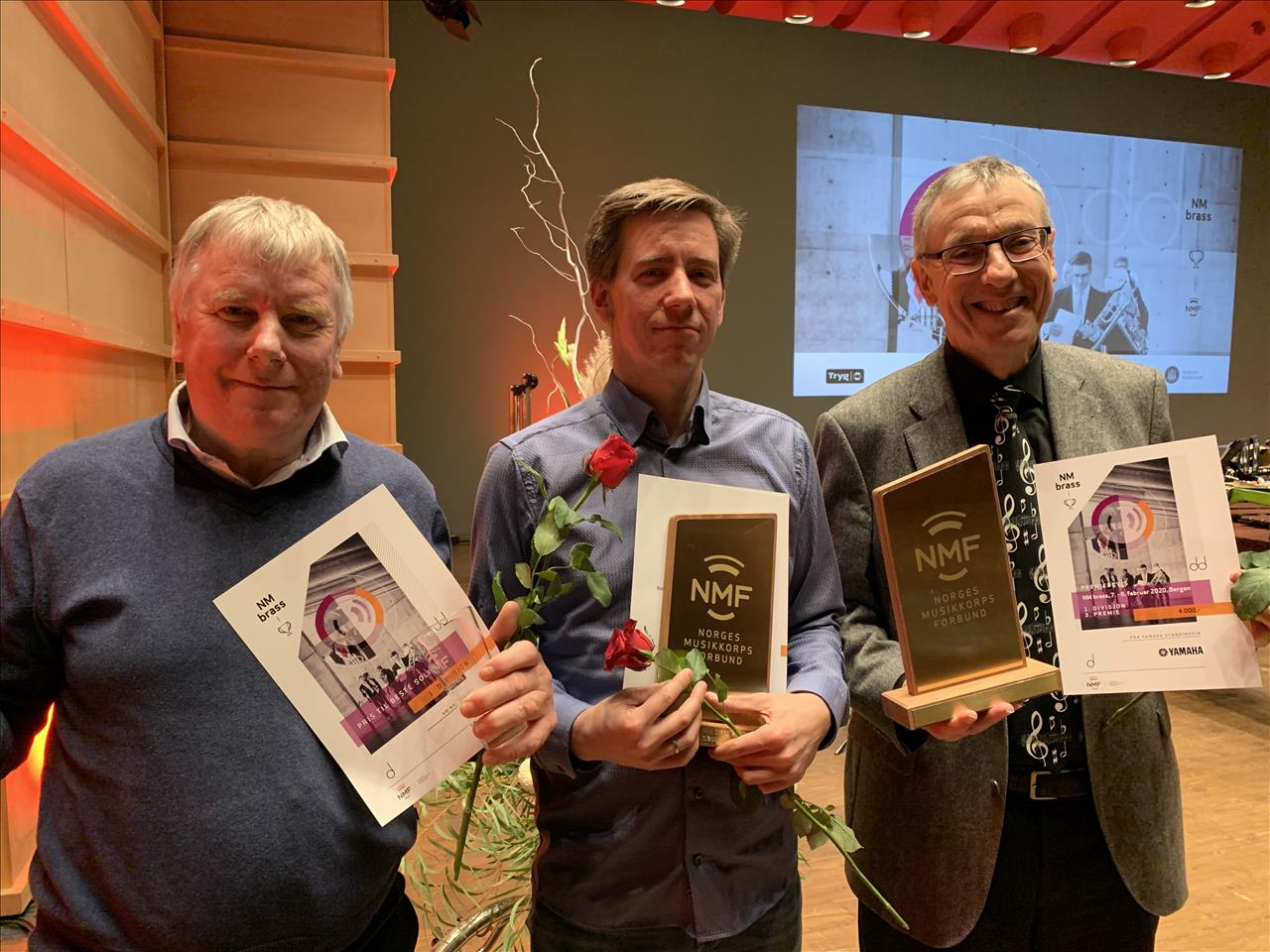
Result:
First Division:
Adjudicators: Bjorn Sagstad, Katrina Marzella, Arsene Duc
1. Ila Brass (Magnus Brandseth) — 97
2. Rong Brass (Erik Janssen) — 96
3. Askoy Brass Band (Reid Gilje) — 94
4. Musikkorpset Gjallarhorn (Adam Cooke) — 93.5
5. Radoy Brass (Bjorn Breistein) — 93
6. Tomra Brass Band (Frans Violet) — 92
7. Molde Brass (Russell Gray) — 90
8. Flesland Musikklag (Thor-Arne Pedersen) — 89
9. Brottum Brass (Ray Farr) — 88
10. Hasle Brass (Robert Solberg Nilsen) — 87
11. Sola Brass Band (Gwyn Evans) — 86
12. Sandefjord Brass Symposium (Helge Haukas) — 85 - Saturday 8, 22:34:13
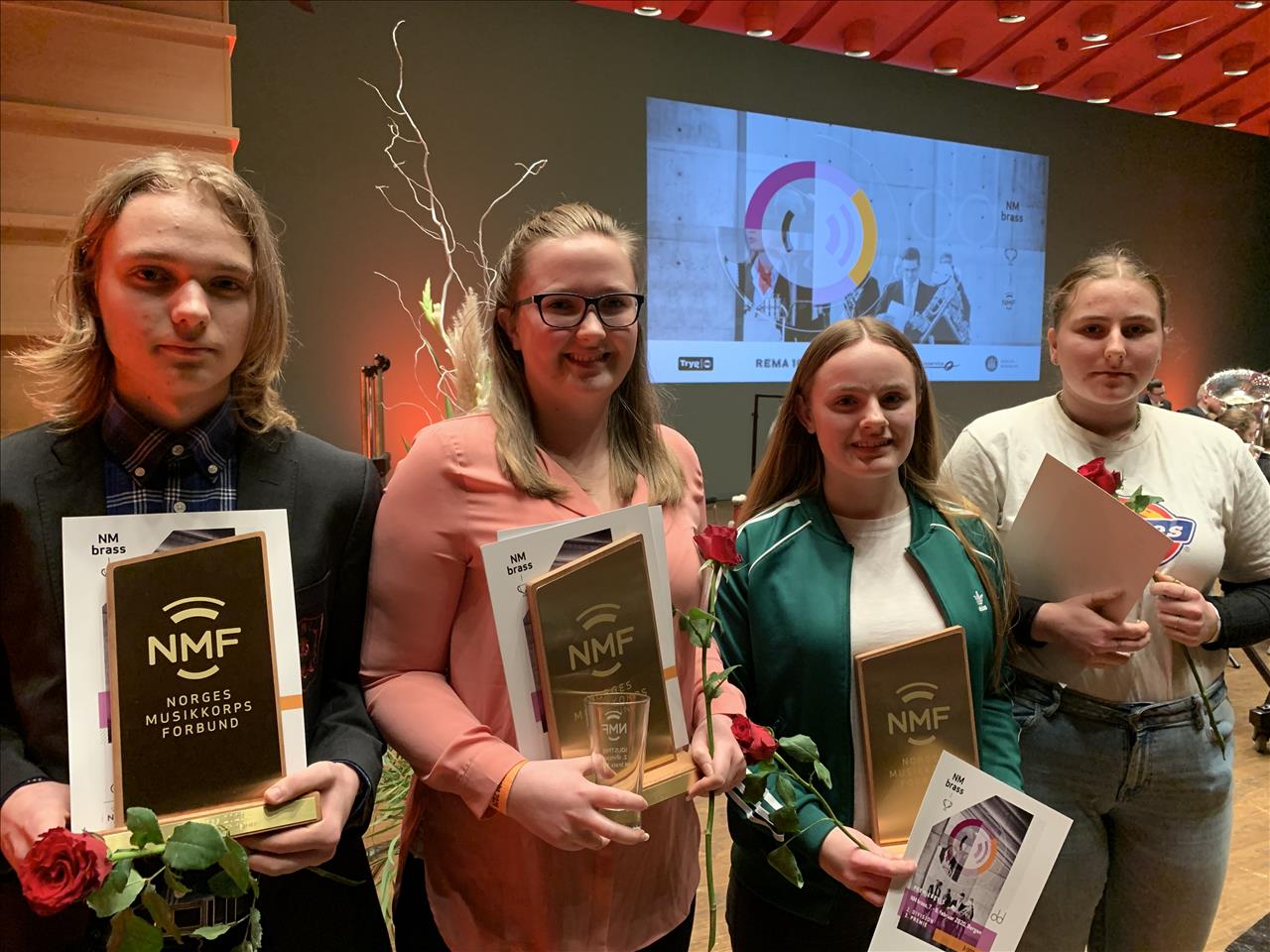
Result:
Second Division:
Adjudicators: Lito Fontana, Katrina Marzella
1. Orskog Brass (Jonathan Bates) — 97
2. Folleso Musikklag (Thorgeir Thunestvedt) — 96
3. Fjell Brass (Joseph Cook) — 95.5
4. Jolster Musikklag (Torstein Aagaard-Nilsen) — 95
5. Oster Brass (David Morton) — 94
6. Lindas Brass (Vidar Nordli) — 93.5
7. Manger Old Star Brass (Margaret Antrobus) — 93
8. Tertnes Amatorkorps (Tormod Flaten) — 92.5
9. Sorum Musikklag (Elsine Haugstad) — 92
10. Tysnes Musikklag (Yngve Nikolaisen) — 91
11. Alexander Brass Band (Morten E Hansen) — 90
12. Nes Musikkforening (Thorbjorn Lunde) — 89
13. Krohnengen Old Stars (Oyvind Raknes Nikolaisen) — 88 - Saturday 8, 22:25:28
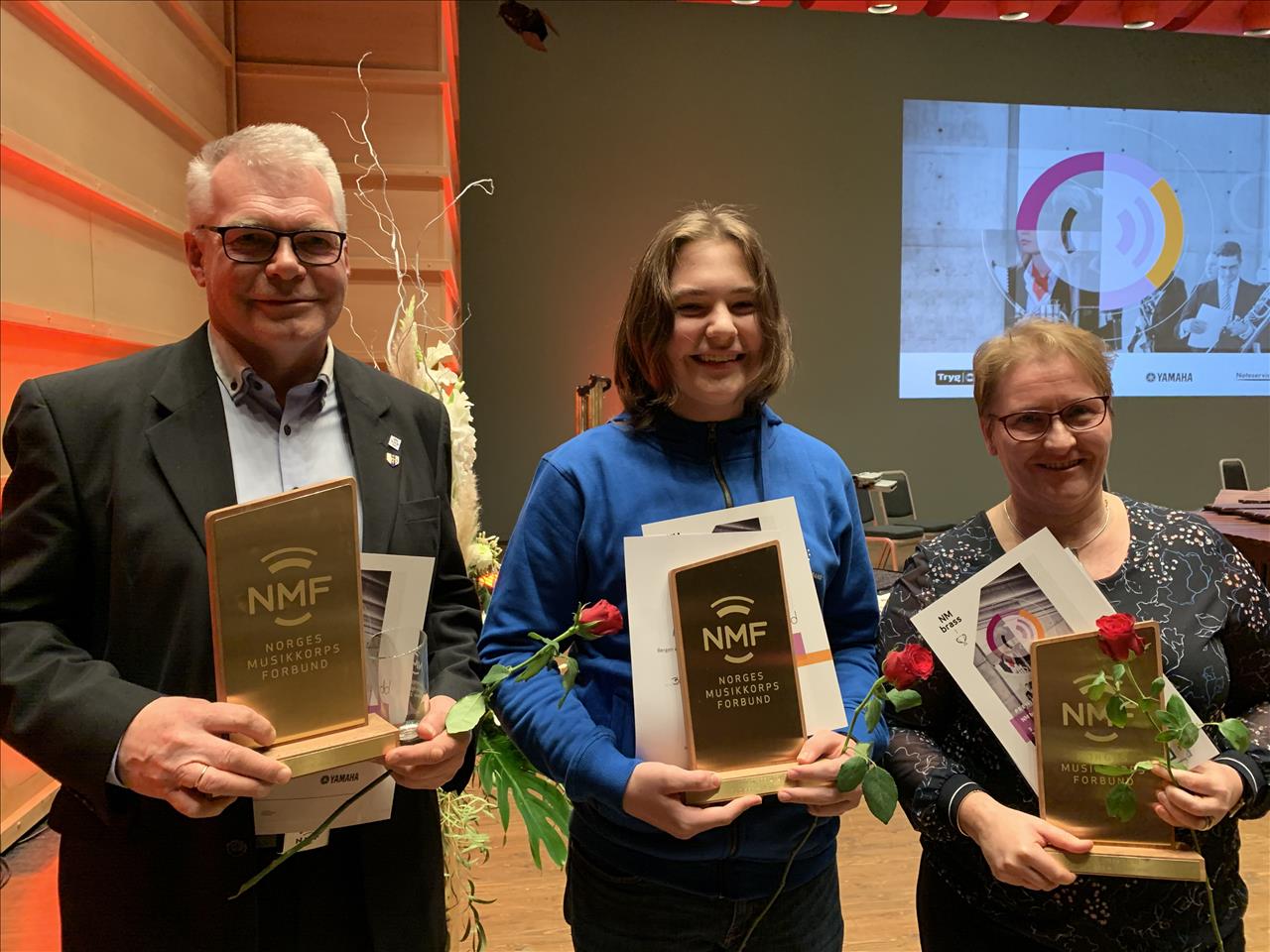
Result:
Third Division:
Adjudicators: Rex Martin, Sheona White
1. Bergen Brass Band (Thor-Arne Pedersen) — 94.5
2. Trondheim Politis Brassband (Espen Andersen) — 94
3. Stavanger Kommunes Korps (Morten Ovrebekk) — 93
4. Sagvag Musikklag (Tom Davoren) 92.5
5. Tromso Brass (Maria Nygard Molund) — 92
6. Haukas Musikklag (Yngve Nikolaisen) -91.5
7. Stangaland Brass (Paul Hughes) — 91
8. Lyshornet Brass (Oyvind Raknes Nikolaisen) — 90.5
9. Bjorvika Brass Band (Robert Solberg Nilsen) — 90
10. Laksevag Musikkforening (Frederik Schelderup) — 88
11. Valdres Brass (Rune Furoy Johansen) — 87.5
12. Skui Brassband (Hans Andreas Kjolberg) — 87
13. Agder Brass (Eirik Gjerdevik) — 86.5
14. Gjovik Bybrass (Morten Fagerjord) — 86
15. Norheimsund Musikklag (Patrik Randefalk) — 85.5 - Saturday 8, 22:16:55
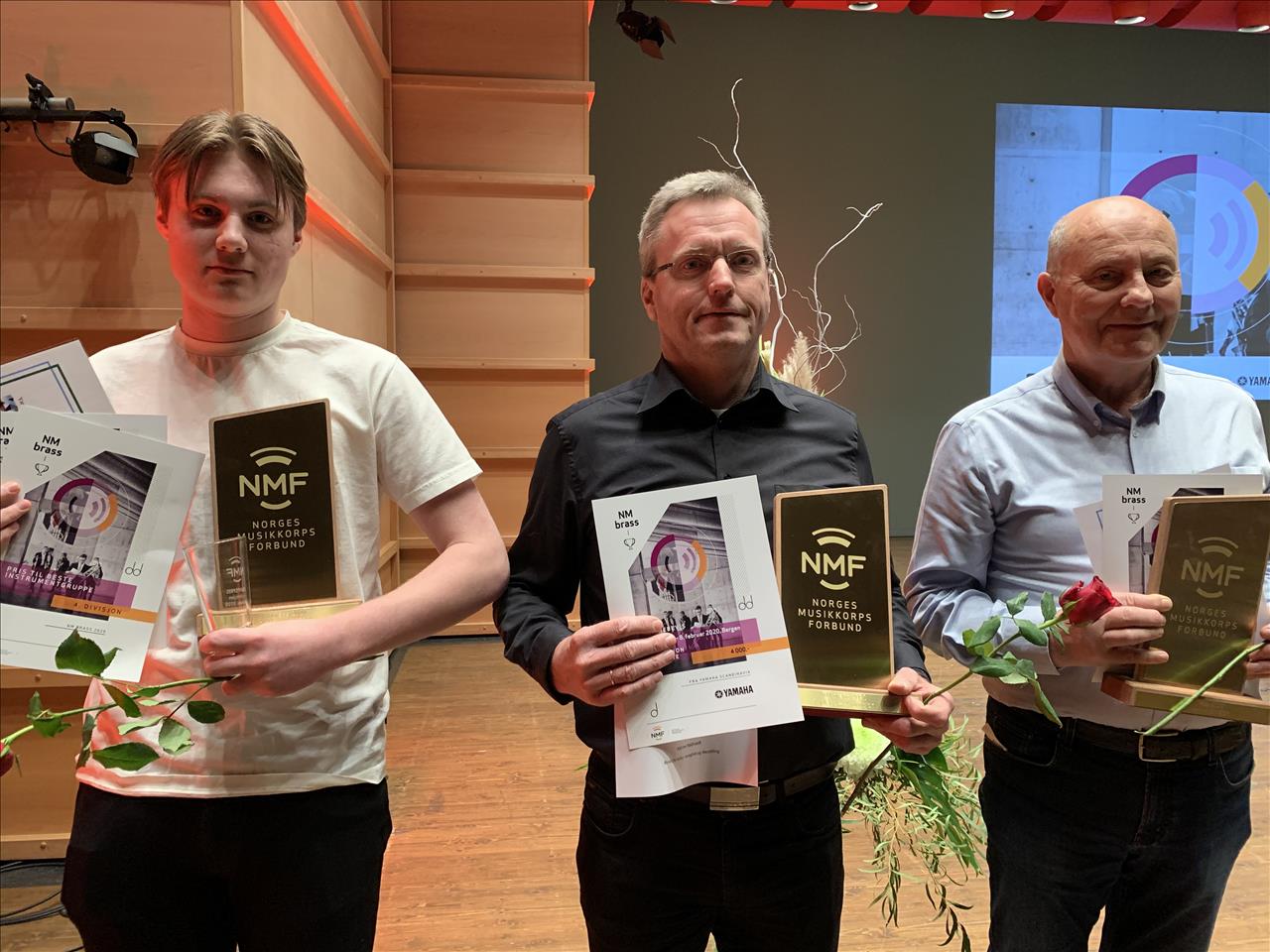
Result:
Fourth Division:
Adjudicators: Kim Lofthouse, Selmer Simonsen
1. Moen Musikkforening (Ole Kristian Egge) — 93
2. Gjesdal Brass Band (Jonas Skartveit Rogne) — 92
3. Filadelfia Hornorkester Drammen (Pal Andre G Worren) — 91
4. Flora-Bremanger Brassband (Johnny Saelemyr) — 90
5. Kjolsdalen Musikklag (Arvid Anthun) — 89.5
6. Tysvaer Brass (Martin Kinn) — 89
7. Fraena Musikkorps (Jens Kristian Mordal) — 88.5
8. Hetlevik Musikklag (Sturle Berntsen) — 88
9. Grenland Brass (Tommy Sorby) — 87.5
10. Saksumdal Musikkforening (Andres Halla) — 87
11. IMI Brass (Halvor Gaard) — 86
12. Indre Torungen Brass Ensemble (Lars Bjornar Strengenes) — 85
13. Floro Hornmusikk (Torgeir Halvorsen) — 84
14. Frei Hornmusikk (Stein Age Sorlie) — 83 - Saturday 8, 22:10:24
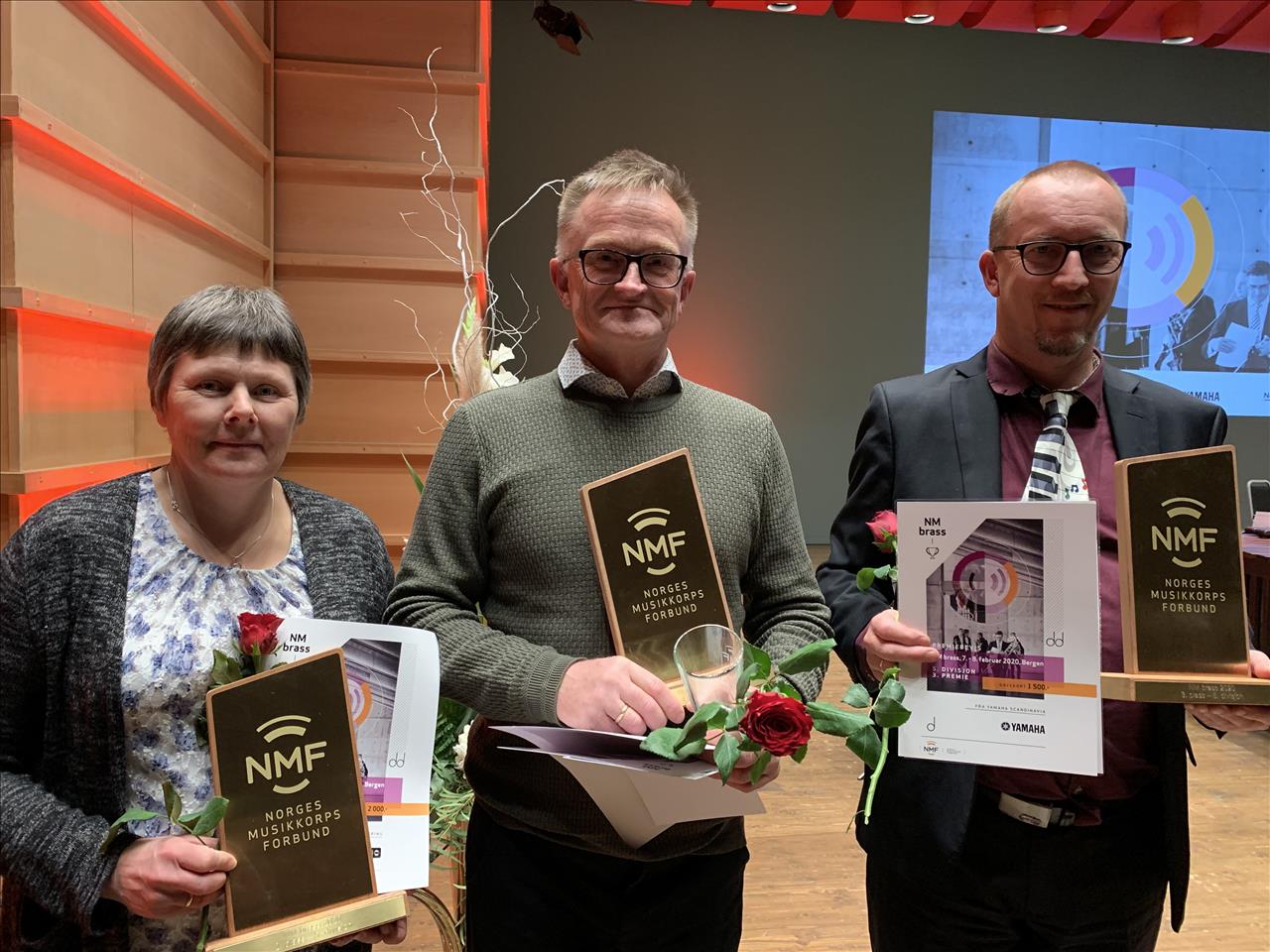
Result:
Fifth Division:
Adjudicators: Bengt Florvag, Svein Henrik Giske
1. Fla Musikkorps (Odd Steinar Morkved) — 93
2. Sotra Brass (Ben Hirons) — 91.5
3. Skeie Brass (Nigel Fielding) — 91.0
4. Holmestrand Ungdomskorps (Arild Ovrum) — 90
5. Randaberg Musikkorps (Pal Magne Austernes-Underhaug) — 89
6. Langhus Brass (Tomas Austestad) — 88
7. Fjordbrass-Lavik (Jason Burn) — 87
8. Riska Brass Band (Espen Westbye) — 86
9. Lismarka/Mesnali Brass (Andres Halla) — 84
10. Brumunddal Brass (Gunnar Roen) — 83
11. Otta Musikkforening (Per Kritian Syversen) — 82 - Saturday 8, 21:06:45
Gala Concert...
The Norwegians enjoy their brass band playing so much that there is now a gala concert featuring the defending champion Eikanger Bjorsvik before the results are announced.
As soon as we get them we will post them up on 4BR.
- Saturday 8, 20:48:25
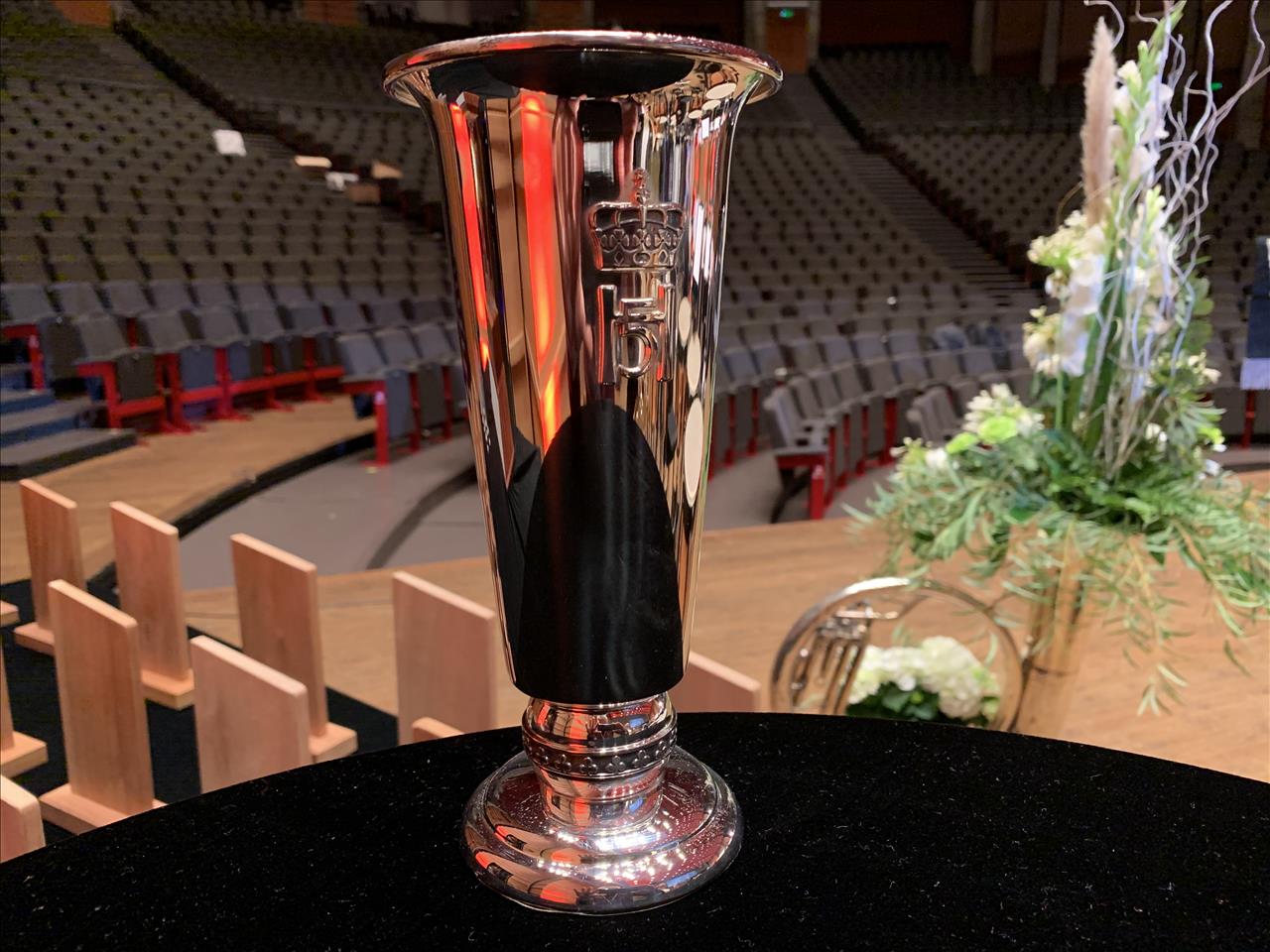
Own-choice and overall round up and prediction...
We think the destination of the King's Cup (which is awarded every two years) and the great National Trophy could be one of the closest run things here after a day in which things at the top end of the table turned a bit upside down for us.
Manger was utterly sensational with their moth inspired brilliance — with their MD conducting with bolts of electricity coming out of his hands. We've got them ahead of Stavanger who were almost in the very same bracket of high octane fusion, but just relied a bit more on control in their rendition of 'The Turing Test'.
That leaves yesterday's clear winner (for us that is), Eikanger in third today — after a brilliant 'Spiriti' that just had occasional moments of unease and was dynamically thermo-nuclear powered.
Behind the top three comes some immensely impressive performances — from Bjorsvik, Kleppe and Tertnes from dark horse Jaren.
Own Choice prediction
1. Manger Musikklag
2. Stavanger
3. Eikanger Bjorsvik
4. Bjorsvik
5. Kleppe
6. TertnesDark Horse: Jaren
Set Work prediction:
1. Eikanger Bjorsvik
2. Stavanger
3. Manger
4. Tertnes
5. Krohnengen
6. OsloDark Horse: Kleppe
All this means that we think that Eikanger may well make it five wins in a row — but by the narrowest of margins depending on just how far ahead they were on the set-work.
Stavanger and Manger could be breathing down their necks though — making them feel very sweaty indeed until the final announcement is made. Tertnes may just get the squeeze on Kleppe for fourth and fifth with Bjorsvik in sixth.
Whatever the result, it has been a huge pleasure to listen to the playing this weekend.
Overall prediction:
1. Eikanger Bjorsvik
2. Stavanger
3. Manger
4. Tertnes
5. Kleppe
6. BjorsvikDark Horse: Krohnengen
- Saturday 8, 20:01:28
Elite Division:
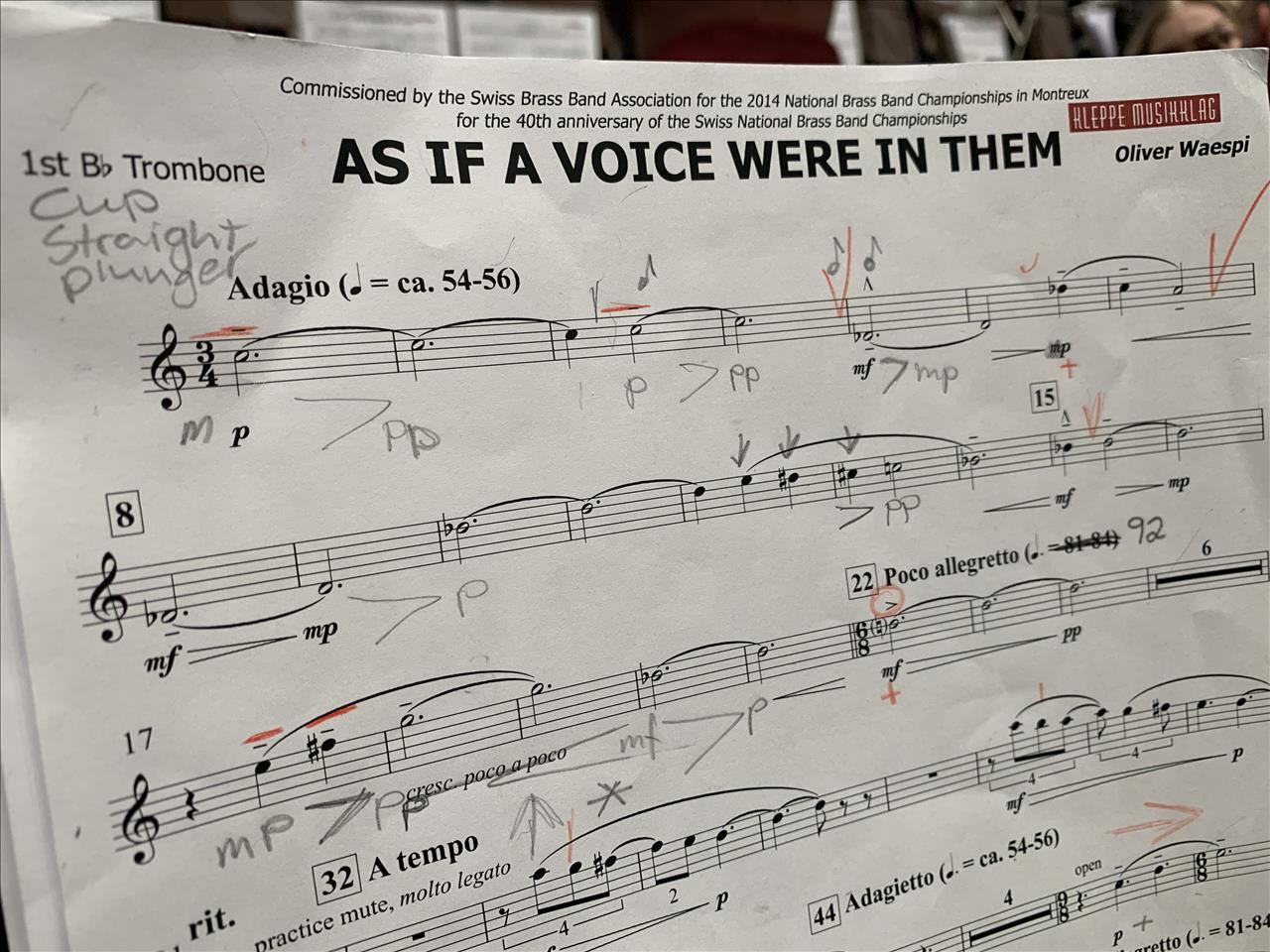
10. Kleppe Musikklag (Philip Hannevik)
As if a voice were in them... (Oliver Waespi)
Oliver Waespi has written a number of works that reflect the majesty of nature and its connection to man — both geographically as well as historically.
'As if a voice were in them...' is the third in a series that started with 'Audivi, Media, Nocte' and was followed by 'Traversada' — all three of which place man's thoughts, inspirations and aspirations at their core.
This work is inspired by William Wordsworth's poem evoking the beauty, majesty and dark, imposing power of the force of nature as he saw it when visiting the Simplon Pass high in the Alps in 1790.
It's complex, powerful, technically brilliant and musically uplifting music, evoking the poem to perfection from the simple folk tune on leaving the Swiss village in which he stayed before his trek, to the imposing vistas that he enjoyed on reaching the top of the Simplon Pass itself.
As if a voice were in them, the sick sight
And giddy prospect of the raving stream,
The unfettered clouds and region of the heavens,
Tumult and peace, the darkness and the lightIwan Fox
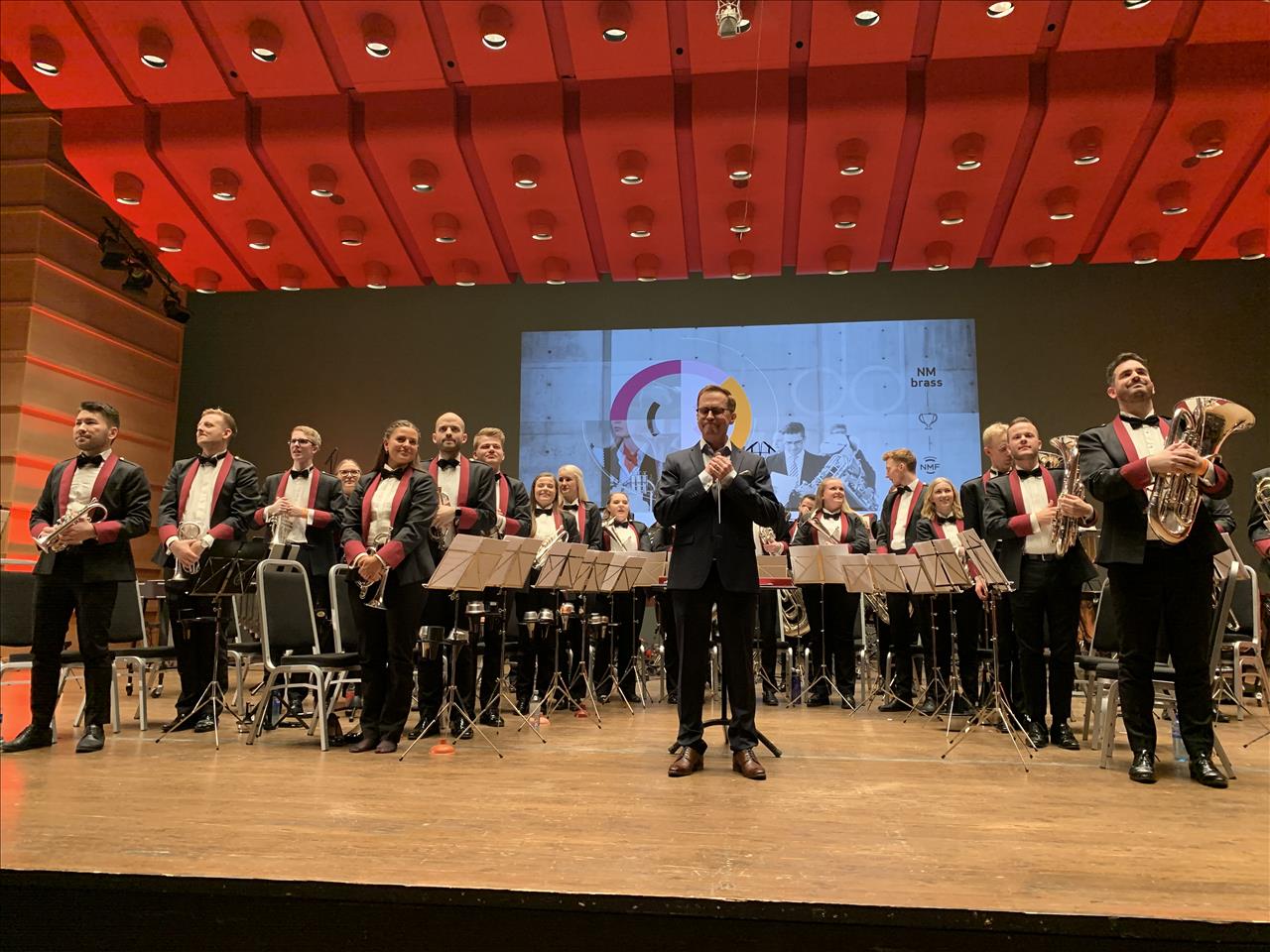
A full-on concentrated effort this (even the MD opted away from his usual freestyle no score stance) — and there was no distillation in the overall quality.
Some moments of niggling unease and clips, but the opening was played with security and followed by that pulsating, hypnotically repeating undercurrent motif. Bluesy jazz meets an old poet's classic meter — and its so well done.
MD has commanded this so well — paced neatly and without artifice to allow the music to flow. The standing choirs work a treat too — proper antiphonal stuff on such a wide expanse of stage.
Then its lead socks on to clamber up the rocky face to the summit — heavy footsteps all the way — pounding and pounding, quicker and quicker to a great close. Bravo.
- Saturday 8, 19:22:57
Elite Division:
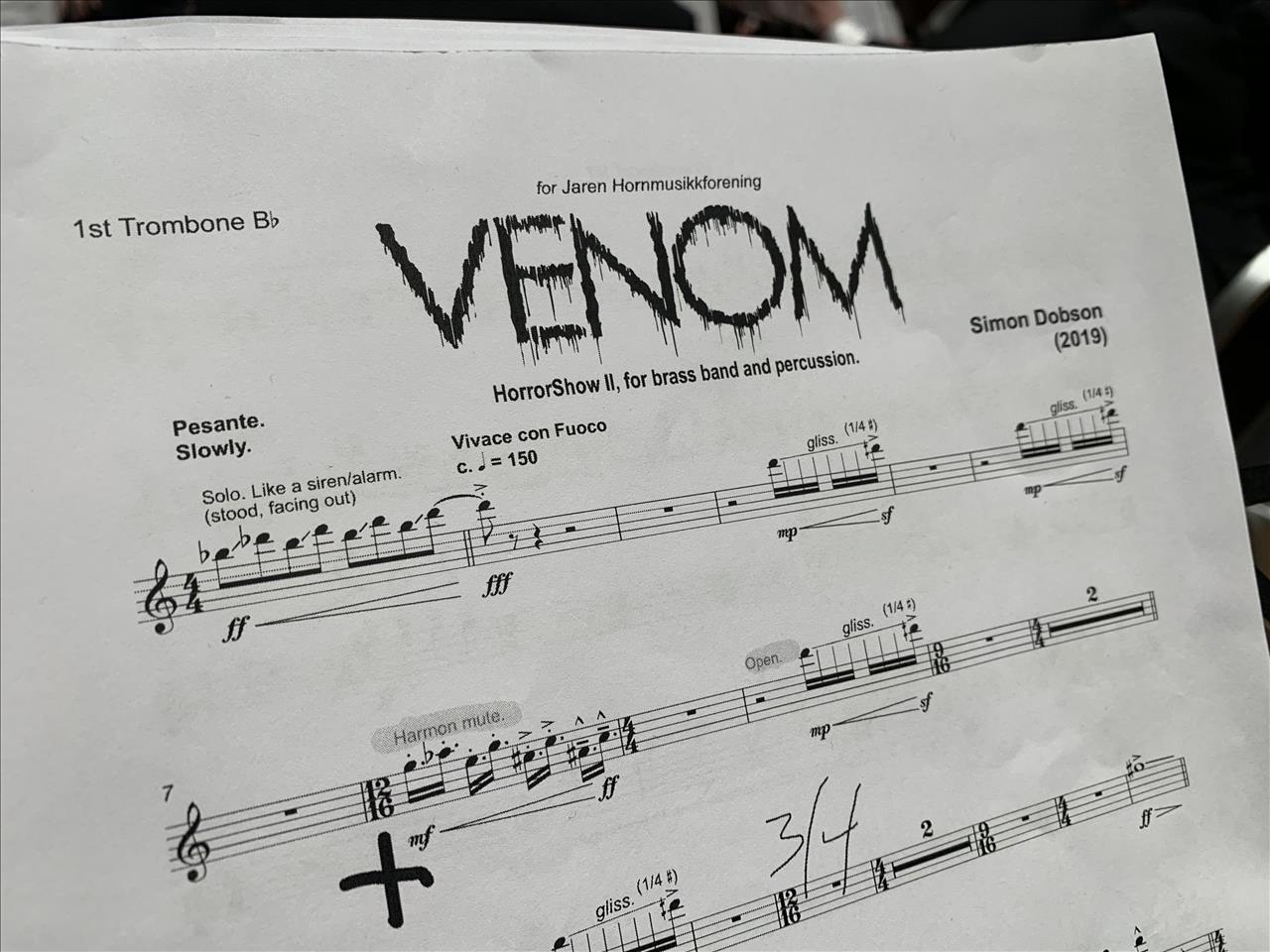
9. Jaren Hornmusikkforening (Florent Didier)
VENOM — HorrorShow II for brass band and percussion (Simon Dobson)
Completed in October 2019, VENOM is the composer's personal reaction to the evils of the world.
In particular it reflects on an agenda that in recent years has been dominated by the use of the media in all its forms by politicians to promote their own distorted views — ones that Simon Dobson feels are filled with false news, lies and both racist and fascistic rhetoric.
The composer believes he has seen the phenomena emerge across the world — a horror which has also resulted in the country he loves tearing its self apart; falling prey to nationalistic rivalries and suffering at the hands of divisive and money hungry liars.
As he says: "It is my reaction to the continuing greed of politicians and corporations alike, which threatens to fundamentally change the way we live our lives on the only planet we can call home."
The non-programmatic music tries to provide context to what he calls 'these bad things' — his hallmark intensity of purpose, colourful, highly textured writing, marked dynamics and rhythmic pulse recalling the never ending stream (the work is in one continuous movement) of unregulated social media comment and analysis, vicious discourse and unfounded opinion.
VENOM is both his portrayal of the political/environmental situation the world faces and his reply to those causing it — the moments of serenity and beauty showing his optimistic belief that there is still good in the world still and that by harnessing it, it can provide a very different and more enlightened future
Iwan Fox
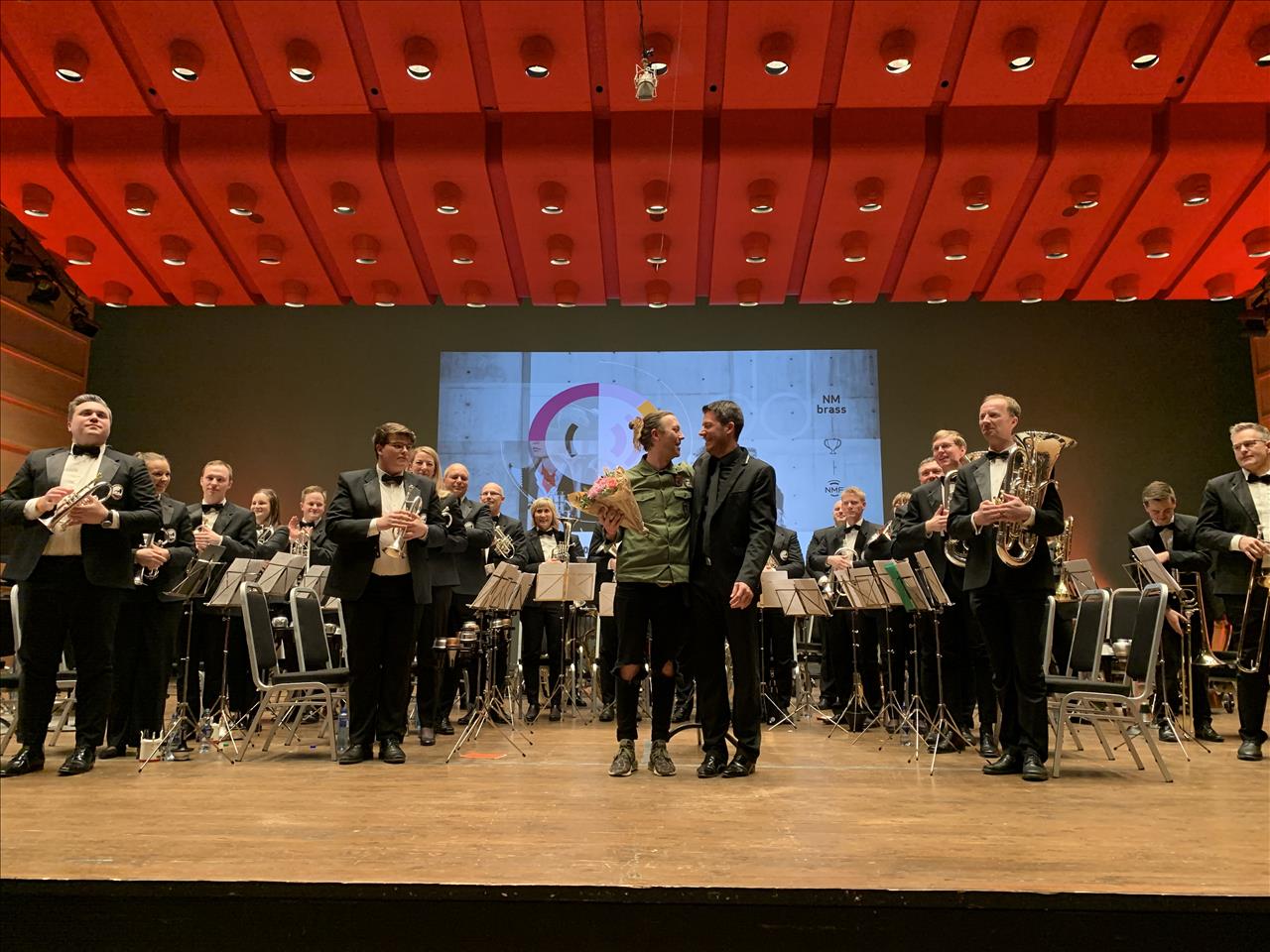
Despite the title and the underlying sardonic, edgy undercurrents — right down to the depths of the raw blooded tubas — the piece had a sense of hopefulness about it — although it did take its time to appear from the deliberate deep fog of the music.
That was due to the cleverness of the writing, which had a wonderful subversive quality (as if written by Armando Ianucci with the cornet as a Malcolm Tucker lead) — and the MDs ability to bring out the internal balances and deep set textures.
Not everything quite melded together at times in the linking lines and ensemble, but the music had such a enticing drive (almost Russian operatic), dripping with acidic delivery — mean spirited and devoid of feeling with its great perc effects.
Then it found a gloriously soul to close — lifting from the poisonous swamp of the reprise opening, finally drained to reveal a better future. Liked that — really liked that.
- Saturday 8, 18:46:41
Elite Division:
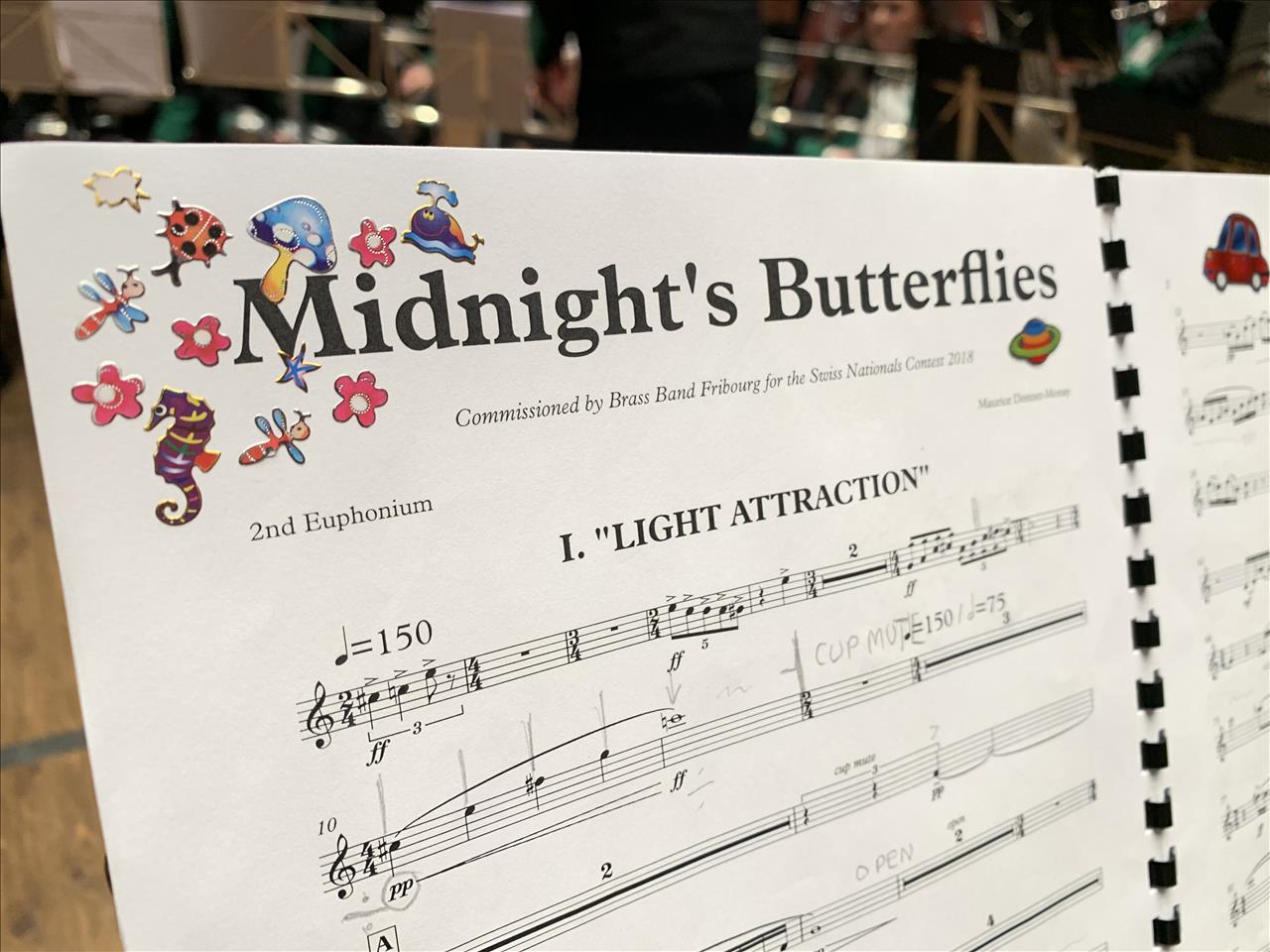
8. Manger Musikklag (Peter Sebastian Szilvay)
Midnight's Butterflies (Lars Nygard)
Composed in 2017, Nygard's work paints an elegant picture of the somewhat mystical and much misunderstood figure of the moth.
It is musical lepidopterology — a case study of its various strengths, colours, elegance, fragility and mystery (the work is also written under a pseudonym).
The harmony throughout is built on a personal modal structure and open, tonal aesthetics, allowing for a combination of 271 various harmonic colours to emerge from the score — like the different patterns found on a moth's dusty wings.
This technique is inspired by the work of Olivier Messiaen on his investigation of the various sounds and colours of nature.
The five linked movements present the characteristics of the moth and its behaviour that has long fascinated the composer.Iwan Fox
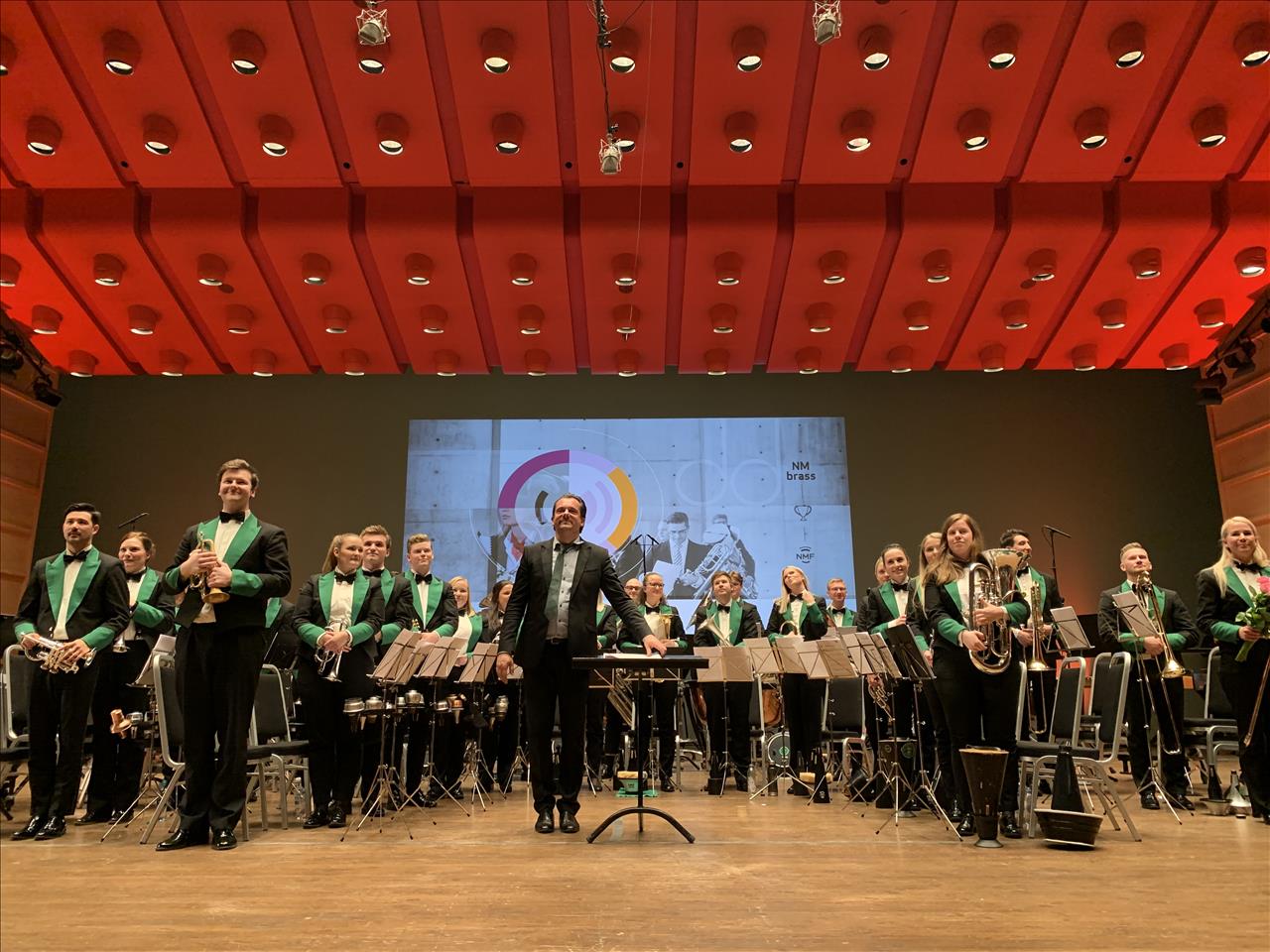
The MD was up to his old tricks again here — like a well greased rat up a drainpipe to wallop the opening before the audience had time to settle their buttocks. Then it was an all out assault on the senses.
Amid the frenzy of percussion and dynamic overload there was sheer beauty, such tenderness and delicacy — as fragile as a moth's dusty wings leaving a powdery imprint on the mind. The little motif playing in lead lines throughout the band was superb — as was the moth seemingly ending up in Stravinsky's pocket.
It literally went like the clappers at one point — then into a languid bluesy jazz led by wonderful trombone. The dynamic contrasts were so well defined and shaped — sounding like a ghostly mandolin.
The flight path to the climax contained so much drama, detail and delicious playing — driven on by the MD to the thrill your pants off climax and last chord of roof raising epicness. Wow.
- Saturday 8, 18:14:04
Elite Division:
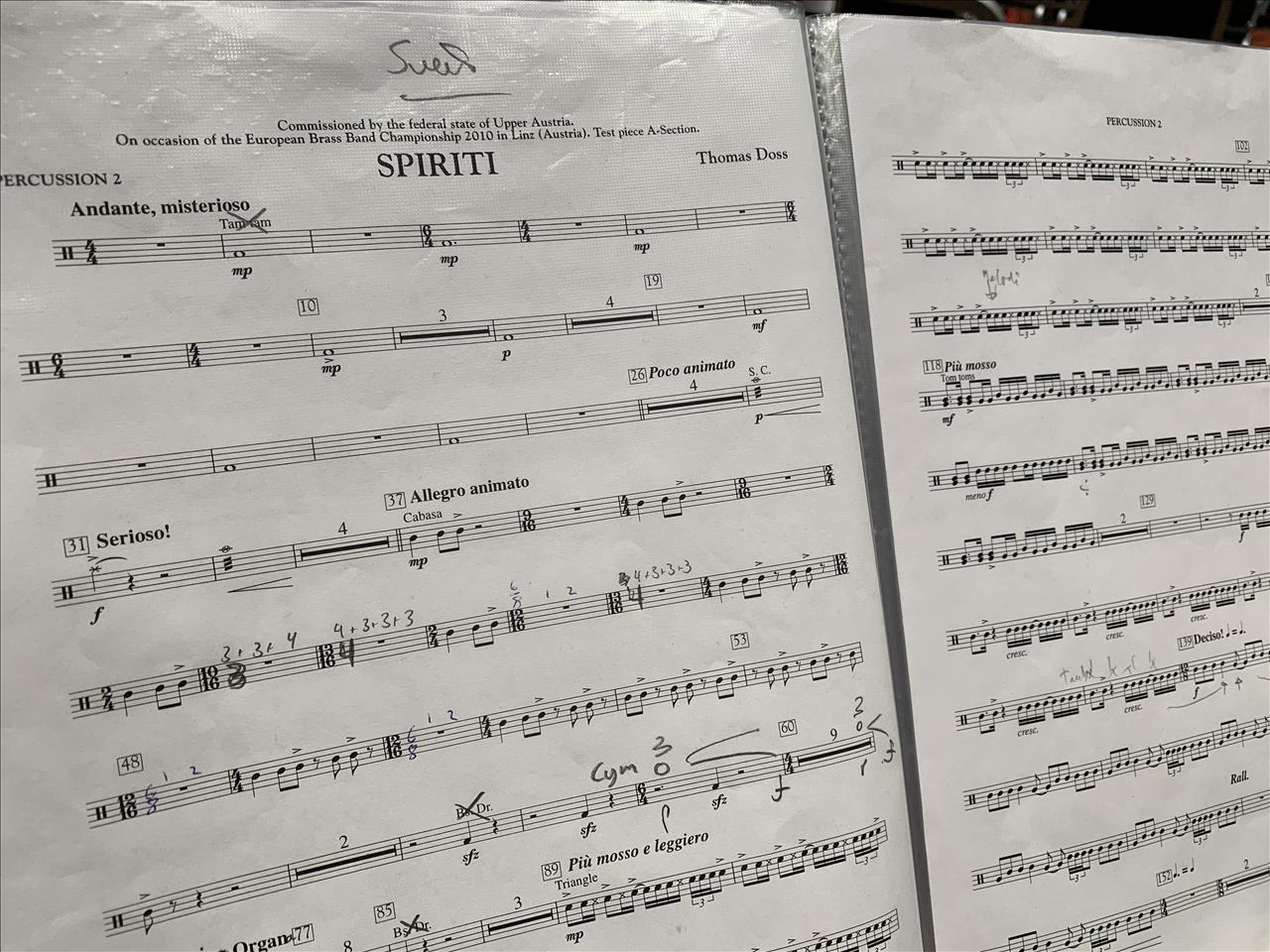
7. Eikanger Bjorsvik Musikklag (Ingar Bergby)
Spiriti (Thomas Doss)
'Spiriti' is a work that is ostensibly inspired by Lutheran theological notions of God's omnipotent power over all people who dwell on his good earth.
Then again, given that it's written by Thomas Doss, it's also is a fantastical soundscape world of hellish nightmares and magic Jesus biscuits. At one point it becomes the Old Hundredth gospel according to James Brown.
'Spiriti' is one of the composer's earlier works (written in 2010) — one that brought his now readily identifiable trademarks effects and evocative nuances burrowing into listener's minds. It combines elements of Bach, Bruckner, Blues and sheer ballsy bravura by the bucketful — at times sparse and frugal, at others as rich as a Mary Berry fruit cake.
Bach's famous chorale; 'Fur deinen Thron tretich hiermit' (better known as 'All people that on earth do dwell') is readily quoted, but it is not until seven bars before the very end that the one direct quote from Bruckner's 'Fifth Symphony' is heard.
Bach it seems is easier to pin down than Bruckner from behind the velvet curtain of the spirit world.
Doss creates illusions of sound at times surreal as the music builds to a glorious climax through edgy blues, gypsy dance and minimalist evocations to an all bells and organ whistles finale. Played well and everyone will be looking to the heavens — 'et spiritus sancti' but with tongues perhaps placed firmly in their cheeks.
Iwan Fox
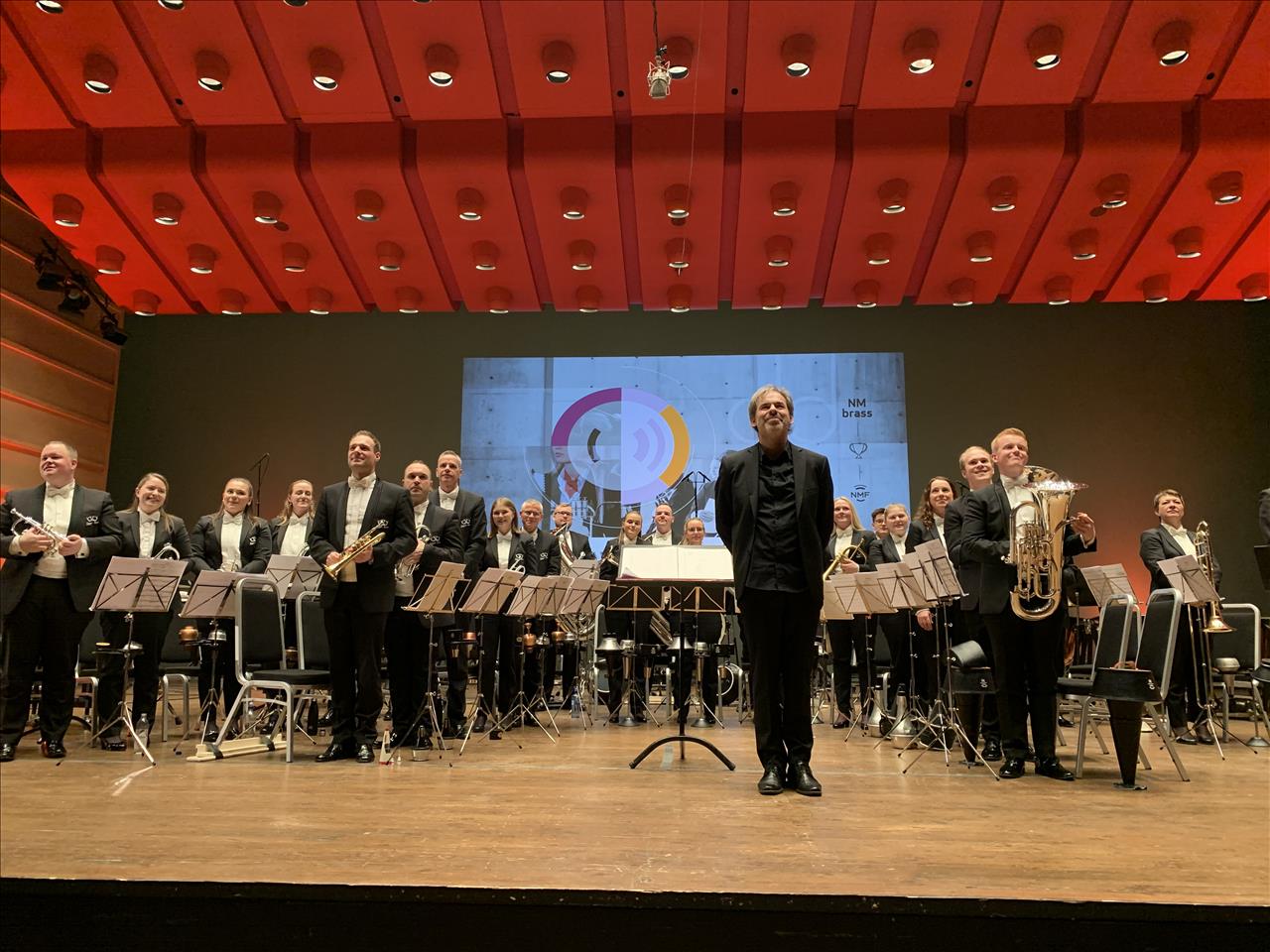
Another immense display of supple musicality linked to cast-iron technique — all washed down in an exotic cocktail of White Lightening cider and Absinthe in a pint of Thomas Doss super bendy surrealism.
This was like going on an LSD trip with the spirits of the underworld — my word it grabbed you by the throat like a rabid hound of Lucifer and then ripped your spine out of its moorings. Huge power reserves were employed to the full — sometimes to the very edge.
The trip to the back street Ali Baba bazaar had just hints of solo line discomfort and was perhaps in need of more dynamic contrast and tenderness — but by heck it was impressive.
The surge for home was nuclear reactor playing — throbbing with intensity and ensemble brilliance as clear as a nun's conscious. All that was left was to empty the dynamic tanks and bask in the tsunami of the applause from an audience indoctrinated by the Eikanger spirit.
- Saturday 8, 17:34:23
Elite Division:
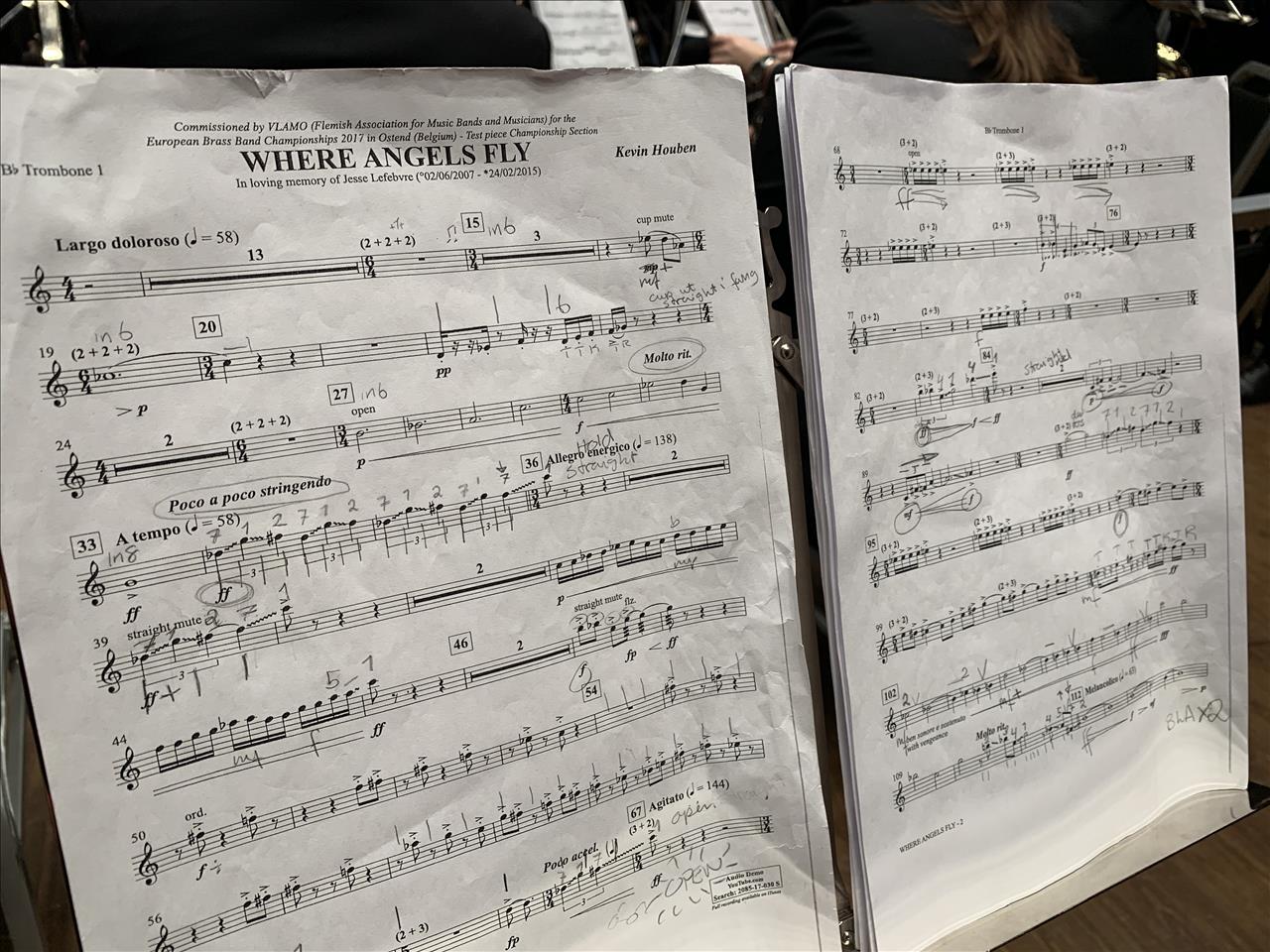
6. Oslofjord Brass (Frode Amundsen)
Where Angels Fly (Kevin Houben)
'Where Angels Fly' was commissioned for the 2017 European Championships and is dedicated In loving memory to Jesse Lefebvre, who was the son of the composer's best friend, and who died suddenly while he was working on the piece.
It is a very personal, emotive expression that encompasses both the celebration of life as well as that of its seemingly unexplained loss. It is prefaced by his quote: 'How do you say goodbye to what is not, cannot and never will be?'
Houben uses musical inspiration from diverse sources — principally from a cipher drawn from his own name: H (B) — B(Bb) — E — (N), and a beautiful, melancholic chorale written by Belgian composer Paul Gilson. It is the almost transparent glue that binds the work together.
Houben also allows the thematic material to develop organically; building and releasing tension from contrasting moving and static elements that contain detailed rhythmic pulses and muted timbres. The music moves forward with bubbling energy and enticing invention (a nod of unconscious appreciation towards Gilbert Vinter with a hint of red tinged 'Spectrum').
It is followed by two sections of contrasting ensemble writing — the first a powerful grand tutti, the second, after a short, startling break, a finale of increasingly powerful driven power and darkly chorded torque that finds its own way to an immense climax.
Iwan Fox
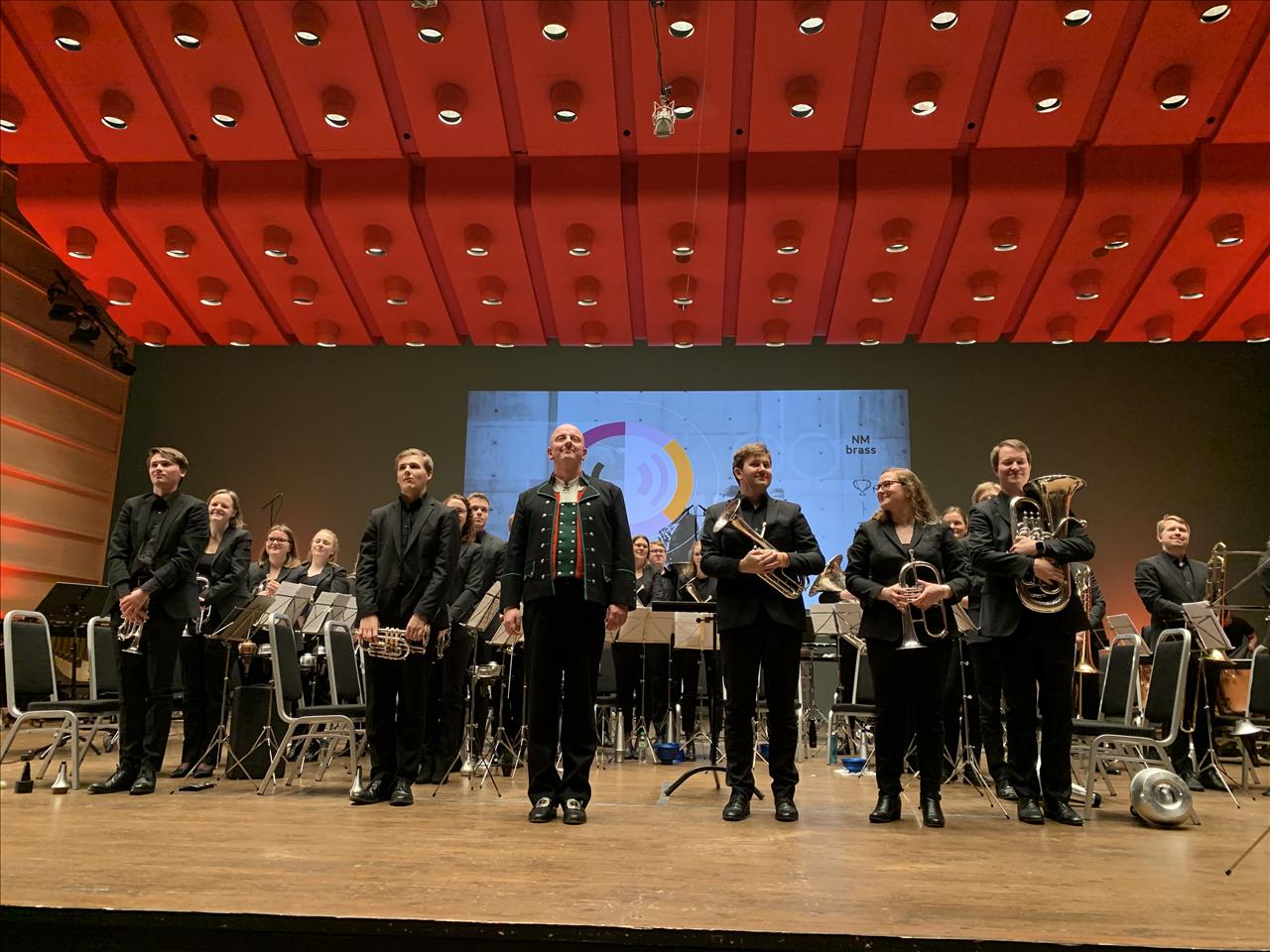
A timely reprise of a test-piece that is a powerful and emotive combination of the technical and musical.
The MD and his band certainly delivered without a hint of having their wings clipped in any way to set them soaring into the Bergen skies — with super featured soloists (led by uber-confident principal cornet standing without music).
All the way through the lead lines were shaped with care and attention whilst the ensemble had a supple muscularity that was judiciously used. Neat little nods to Vinter, Gilson and Bernstein were so well handled as the focused drama built in intensity.
The oddly placed lacuna before the final section rather stopped the flow in its tracks, but it soon gained its dramatic mo-jo and headed into the dynamic stratosphere.
Fly my little angels, fly...
- Saturday 8, 16:47:30
Elite Division:
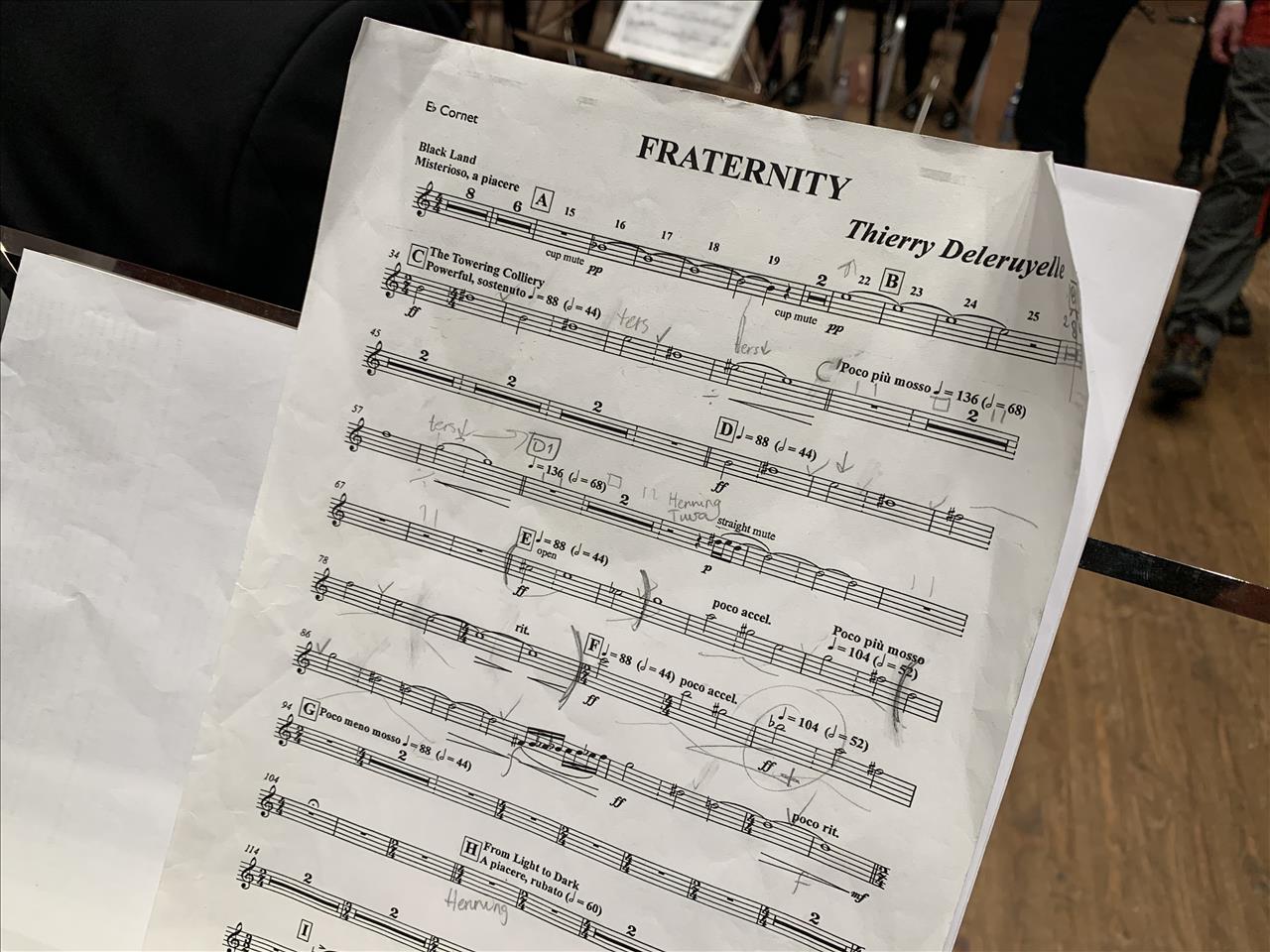
5. Krohnengen (Prof Nicholas Childs)
Fraternity (Thierry Deleruyelle)
Thierry Deleruyelle's work was originally commissioned as the set-work for the 2016 European Championship in Lille, and was received with widespread popular and critical acclaim.
It is inspired by the tragic circumstances of a 1906 mining disaster in Douai in France that claimed over 1,000 lives, and is written in an open, tonal fashion — eschewing high-energy injections of volume and speed for more considered pacing and texture, subtly scored balances and lengthened lyrical lines.
The musical narrative, with nods of Gallic appreciation to the likes of composer Paul Dukas sets the scene; telling the tale and recalling the aftermath in seven linked sections; from the 'Black Land' and 'Towering Colliery' above ground, to the journey to the face to extract the coal.
The catastrophe is ignited by a fractured, frenzied forcefulness, the prelude to which is the ghostly on-rush of air through instruments; life or death a matter of luck.
The solemn task of bringing out the dead leads to a bleak paean of reflection, before the piece ends in uplifting fashion in the form of a 'Fraternity Prayer' that pays tribute to those lost.
Iwan Fox
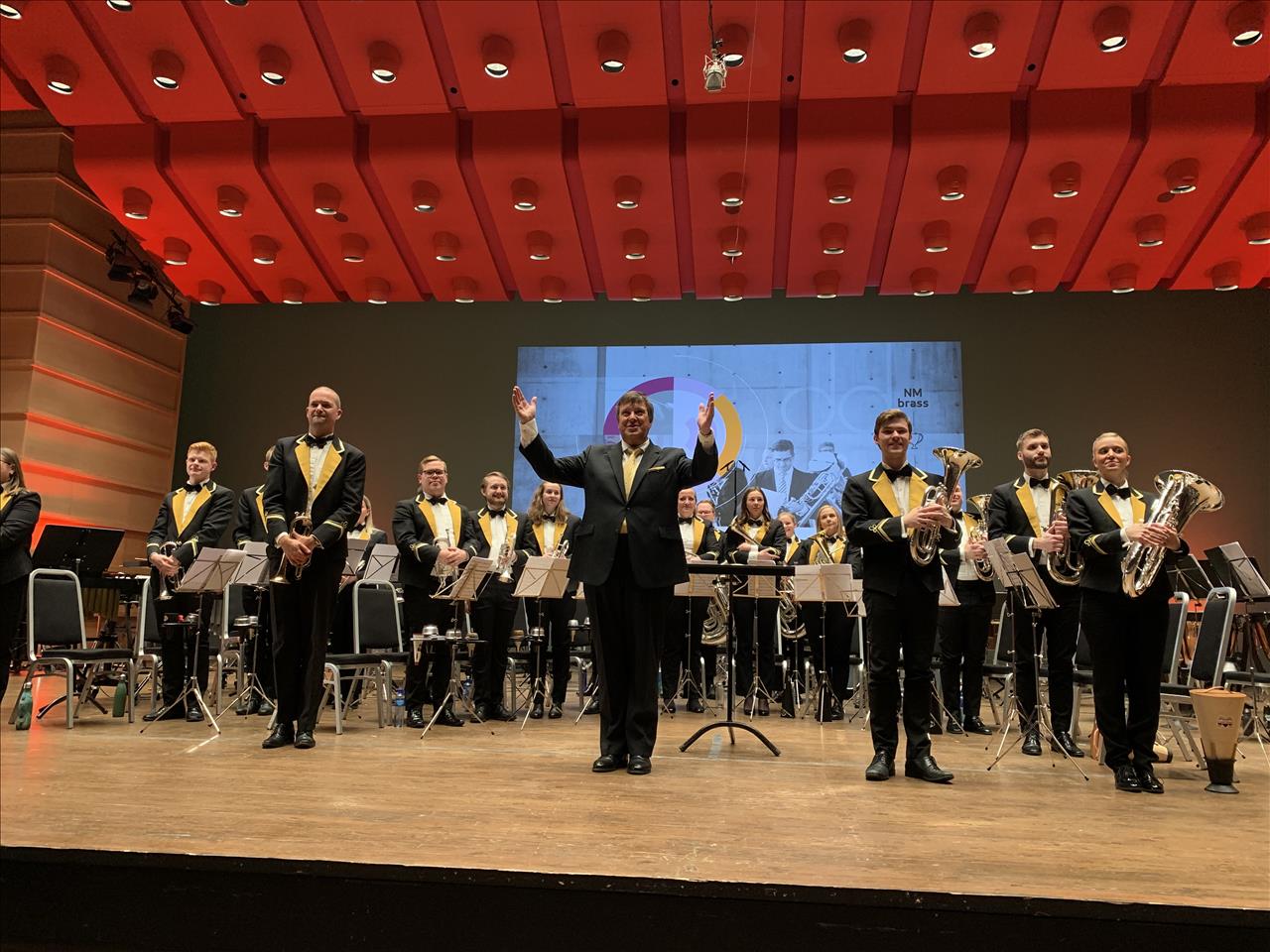
There was something deeply primal about this performance — dug out of the musical earth by the MD and his band.
It was such emotive playing — not without its moments on unease in the solo and ensemble lines, but it had such a menacing air of impending doom — the Dukas inspired industry soon giving way to the explosive catastrophe, the fear and dread — led by vicious percussion.
The aftermath seeped with poignancy and raw, empty loss — tenderly shaped by the MD with a soothing almost chorale warmth as hope emerged from the darkness. Little moments just robbed the picture, but what a measured build there was to the prayer — layered like the seams of coal beneath the ground — all the way to an organ-like denouement.
- Saturday 8, 16:11:18
@StavangerBrassB gives it their all in a mighty rendition of the "Test". The sound is amazing. The ending a bit OTT, but the overall impression is excellent. Maybe a winner, this.
— GrumpyBrassBander (@BanderBrass) February 8, 2020
MVS: Tubas#nmbrass #nmbrass2020Elite Division:
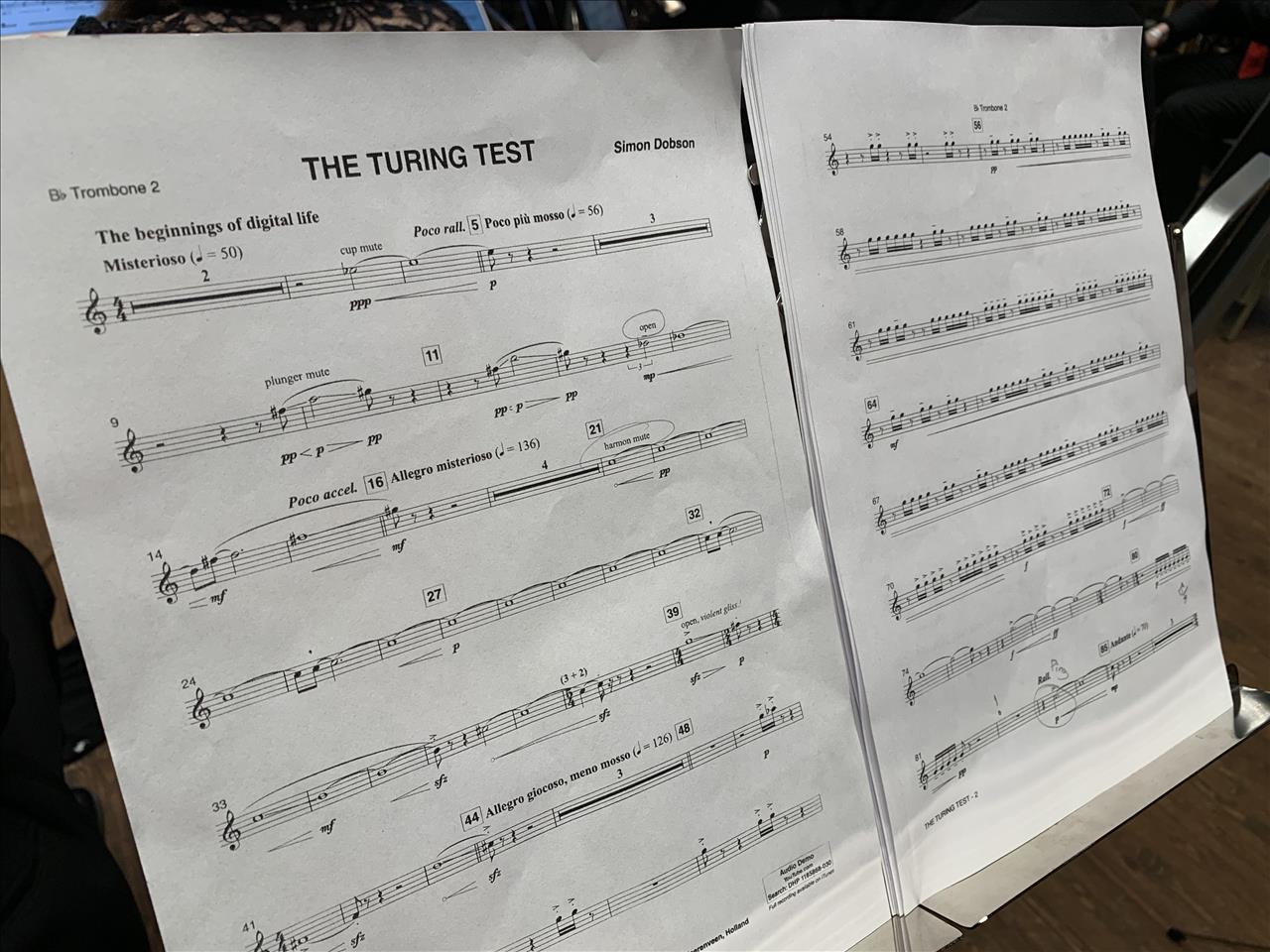
4. Stavanger Brass (Allan Withington)
The Turing Test for Brass Band and Percussion (Simon Dobson)
Alan Turing is considered the father of modern computational science; mankind owing a immeasurable debt of gratitude to a truly great, but deeply troubled soul.
His pioneering work on mathematical theories ultimately led to the cracking of the Nazi Enigma Machine code, yet his life ended in lonely tragedy with his apparent suicide — a victim of intolerance and ignorance towards his homosexuality.
Simon Dobson's work, although non-programmatic, seeks to detail something of the emotion and colour of Turing's life.
from his imagined beginnings into bio-digital life forms (AI) and his entry into the scientific community, to his ever more complex solutions to ever more deadly war time problems.
His 1952 arrest for indecency leading to the choice between imprisonment or the unbearable punishment of chemical castration (which he chose) so that could continue his work, is explored in sombre reflection.
The last section tells of his eventual posthumous pardon and the sense of chaotic sadness rather than triumph, that one of the greatest minds had been treated with such abject cruelty at a time when his own work was on the verge of reaching a remarkable resolution.
Iwan Fox
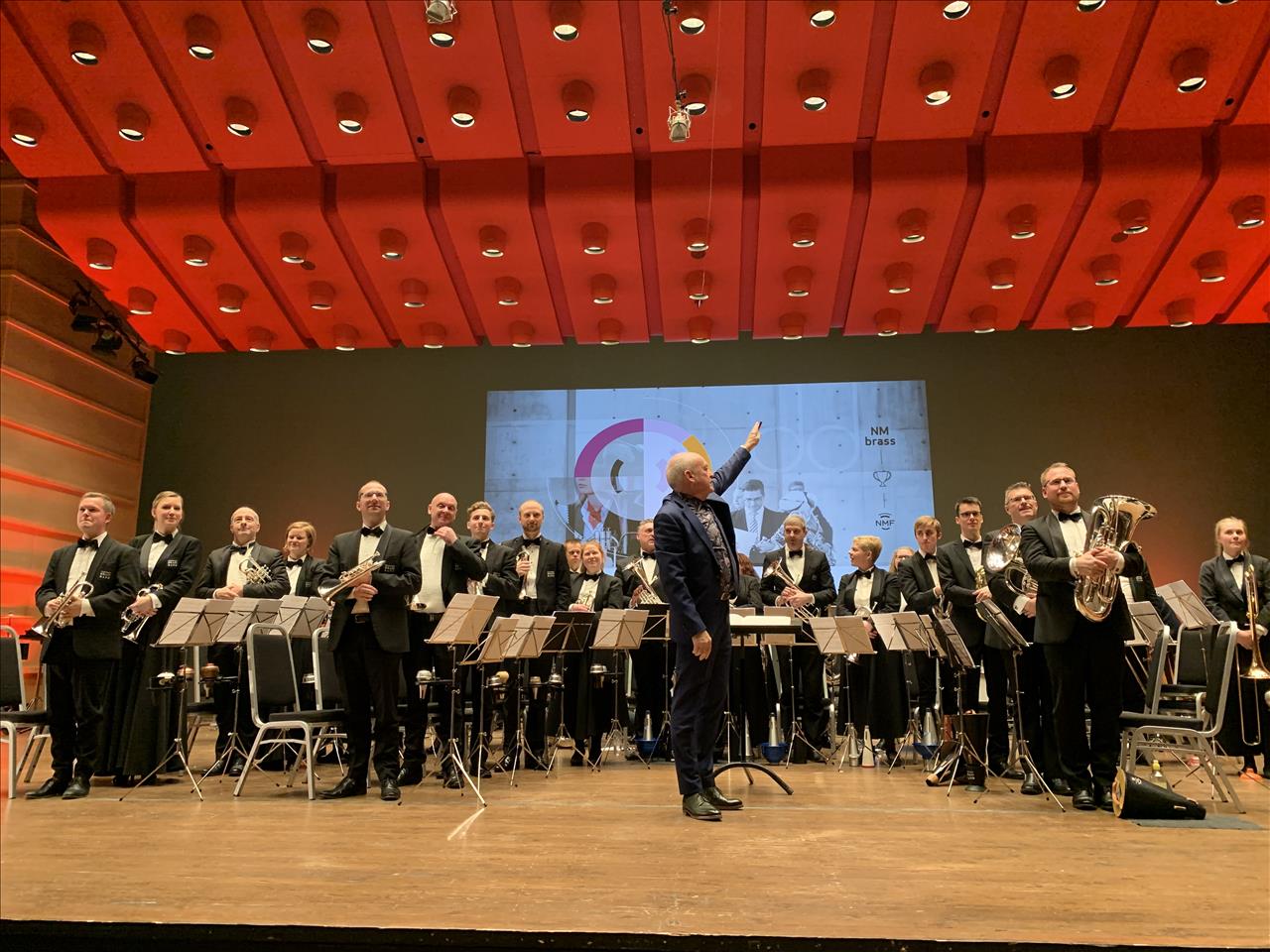
An immensely powerful, deeply characterful portrait of a man blessed by genius but cursed by ignorance — destined to fear repression and despair, despite his immensely humane qualities in understanding the binary logic of the emerging computer age for mankind.
The music pulsated with energy — electric in its surges of power and detail — a voltage that never lost its grip on the senses; relentless in that turmoil and triumph. The darkness of the melancholia was overwhelming — sinking ever deeper into despair led by plaintive cornet and euph of singular beauty.
No such emotion with the mechanics to close — never ceasing in industry or precision — each ensemble note an algorithm of musical effectiveness and clarity right to the pyrrhic triumphalism of the close.
A superb performance — inspired by Alan Turin, engineered with complete understanding by Allan Withington.
- Saturday 8, 15:39:32
Elite Division:
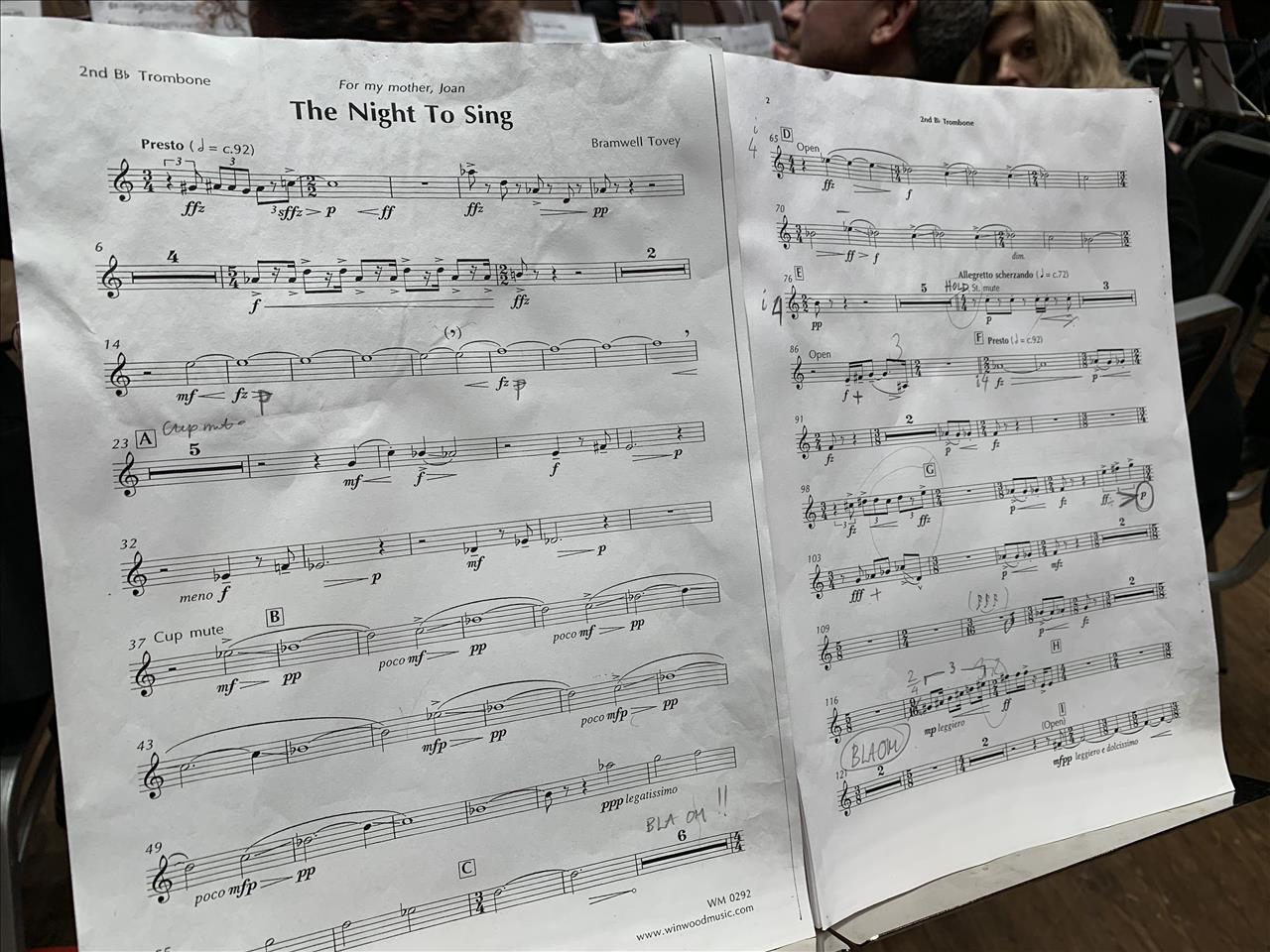
3. Bjorsvik Brass (Andreas Hanson)
The Night to Sing (Bramwell Tovey)
History is marked by time, place and date: In the case of Bramwell Tovey's 'The Night to Sing' it is the heart of London on the 8th May 1945 — V.E. Day.
The defeat of Nazi fascism brought mixed emotions — elation, joy, hatred, revenge and loss — unimaginable loss. For Tovey the link is through his mother, Joan, for whom the work is dedicated (the composer was born in 1953).
She would have experienced, like the quote that gives the work its title, 'the night to sing' when street parties and services of thanksgiving were mixed with the singing of ballads and the dancing of the latest craze, the Conga.
However, the shadow of that night cast a huge shadow over the years that followed — austere, grey and unforgiving — victory paid for in blood and tears, ruins and refugees.
'The Night to Sing' asks searching questions of conductors to interpret and for an audience to appreciate; its dichotomies and tensions defined in a beautifully opaque manner of writing; from the hustle and bustle of the celebrating crowds in Piccadilly to the lopsided meander of the lonely drunk, the sombre reflections of widows and mothers who have lost their children to the memories of time happier times past when middle aged people recalled the certainties of Victorian life.
It is writing full of pathos, dark humour and even slapstick; a warm and affectionate musical portrait of a night of all nights,
Iwan Fox
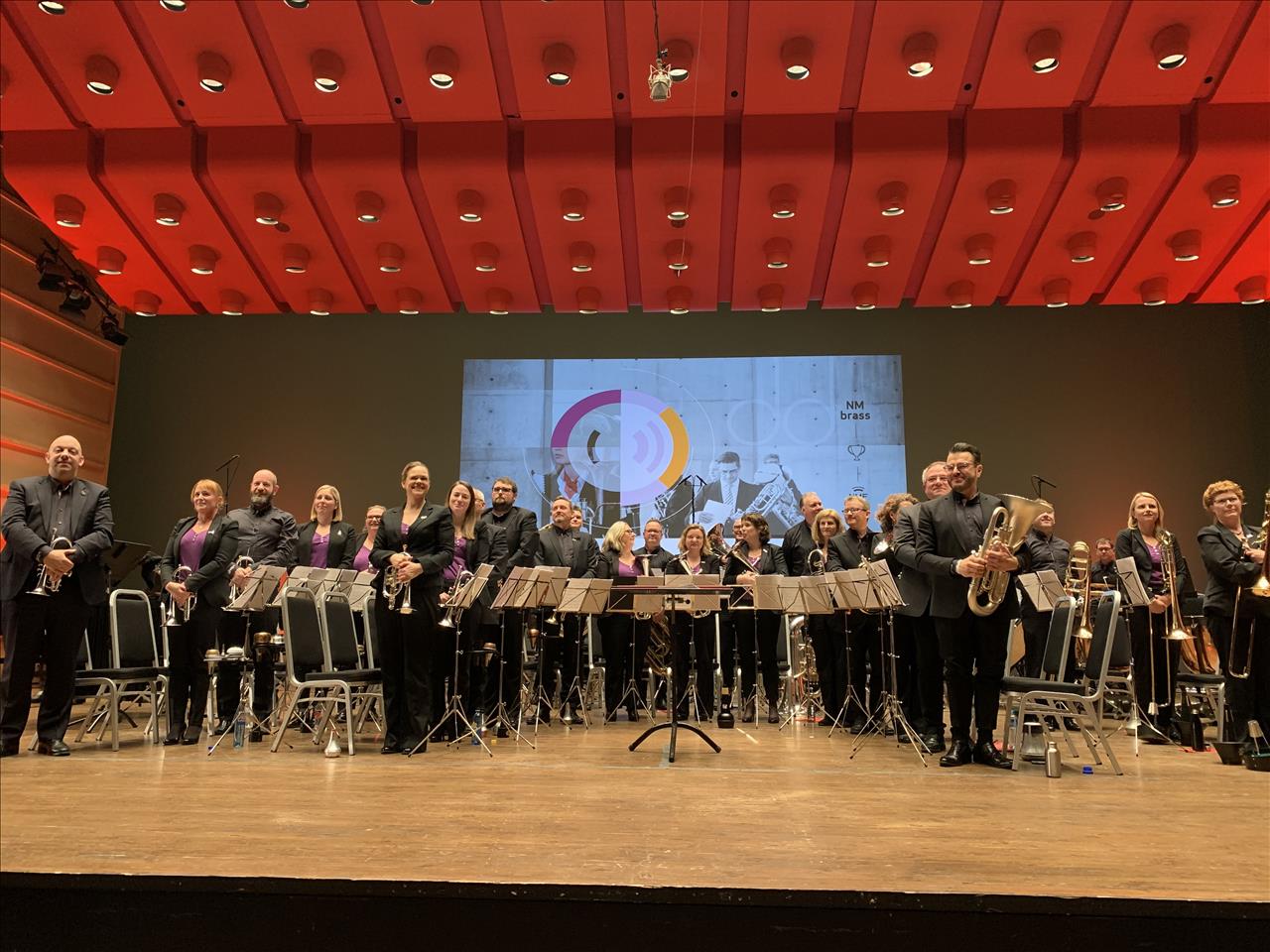
A recall of a very specific moment in history with an edgy, pacy momentum from the start — as if overcome by the excitement of the news of the downfall of Nazism.
More considered and even playful characterisation followed — the lopsided gait of the drunken old soldier walking home from the pub and the sense of aching loss of a grieving mother — all drawn with acute stylistic appreciation by the MD.
Dynamically bold, but the playing had such a heart on sleeve quality — led by superb euph. The MD expertly brought this to life — like an old black and white newsreel recoloured. The finale had finesse to go with the flamboyance — the American salute to the Conga dance — all drawn together for a night never to be forgotten for a multitude of reasons.
Perhaps not quite up there in those stakes, but a very fine performance nonetheless.
- Saturday 8, 15:09:31
Elite Division:

2. Oslo Brass (Ivan Meylemans)
The Turing Test for Brass Band and Percussion (Simon Dobson)
Alan Turing is considered the father of modern computational science; mankind owing a immeasurable debt of gratitude to a truly great, but deeply troubled soul.
His pioneering work on mathematical theories ultimately led to the cracking of the Nazi Enigma Machine code, yet his life ended in lonely tragedy with his apparent suicide — a victim of intolerance and ignorance towards his homosexuality.
Simon Dobson's work, although non-programmatic, seeks to detail something of the emotion and colour of Turing's life.
from his imagined beginnings into bio-digital life forms (AI) and his entry into the scientific community, to his ever more complex solutions to ever more deadly war time problems.
His 1952 arrest for indecency leading to the choice between imprisonment or the unbearable punishment of chemical castration (which he chose) so that could continue his work, is explored in sombre reflection.
The last section tells of his eventual posthumous pardon and the sense of chaotic sadness rather than triumph, that one of the greatest minds had been treated with such abject cruelty at a time when his own work was on the verge of reaching a remarkable resolution.
Iwan Fox
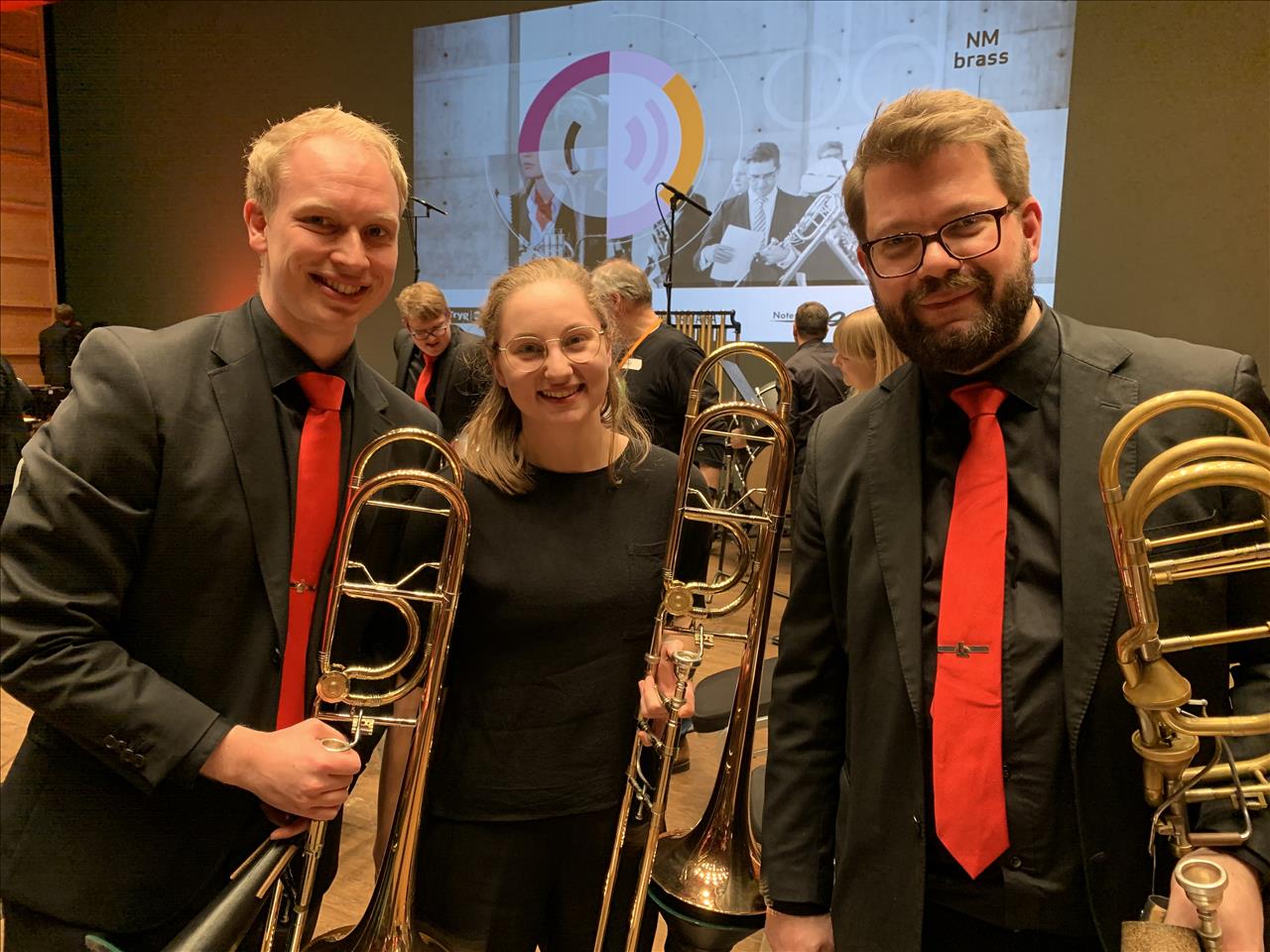
There was an authentic feel of repression and despair, as well as enlightened, inventive thought processes pulsating through this performance like the electrical current powering old valves and circuitry in a 1940s computer.
Precise, detailed and vital in execution — all with that voltage flow that at times reached an overload point but at others seemed to ebb away — liked Turing's will power. It was deliberately relentless in both aspects, turmoil and triumph — the ensemble compact, the lead lines persuasive.
The MD realised the very humane core of sentiment at the heart of the music — dark and melancholic, yet all the while, the mechanical cogs whirled and connected together without a hint of emotive passion.
A performance of great thought and understanding this from both the MD and his band.
- Saturday 8, 14:38:03
Elite Division:
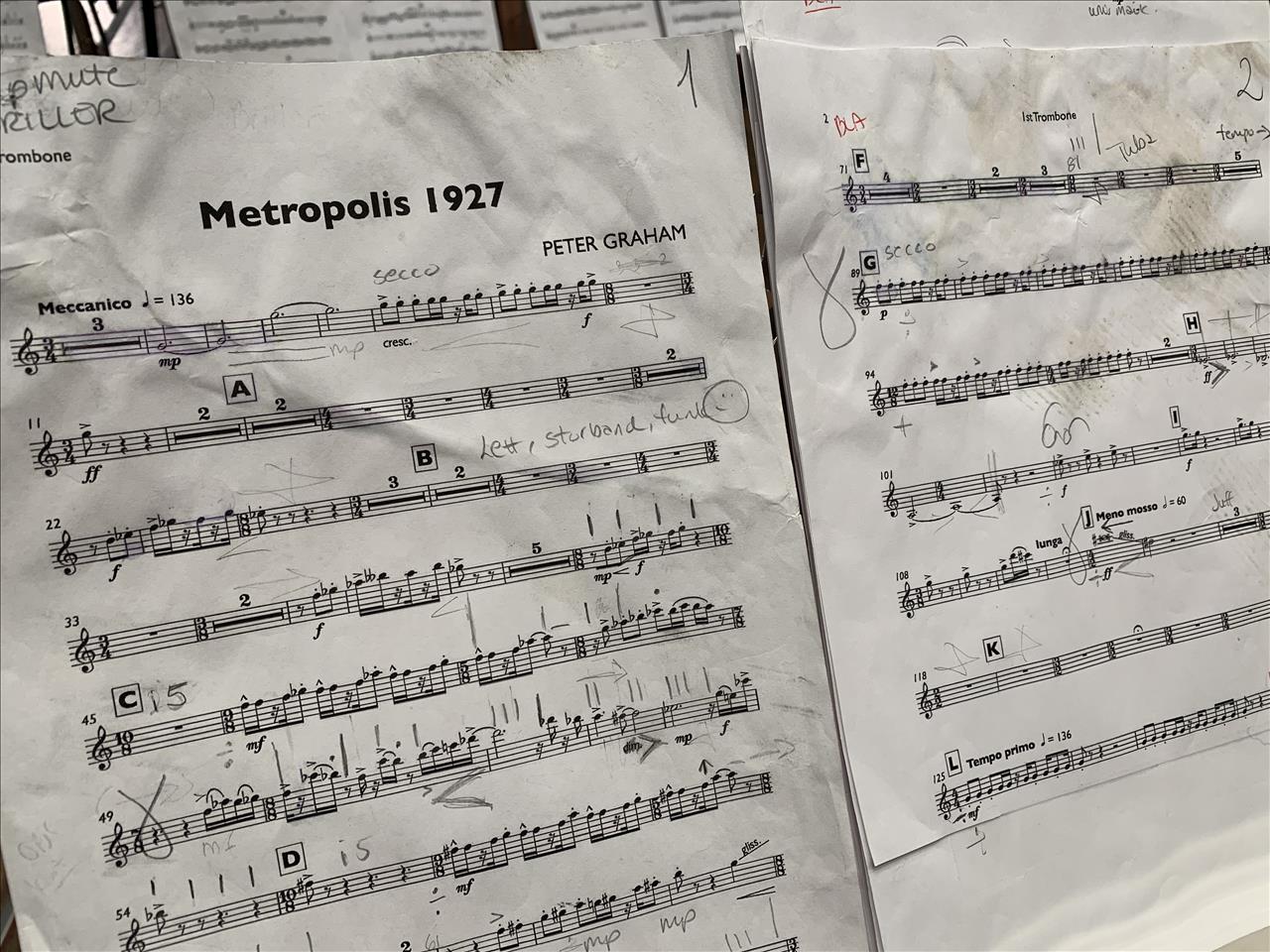
1. Tertnes Brass (Martin Winter)
Metropolis 1927 (Peter Graham)
Fritz Lang's 1927 science fiction film epic Metropolis is considered to be a masterpiece of cinematic vision.
Set in a future dystopian world, it highlights the lives of two contrasting communities living in the vast city landscapes: Those above ground living a life of privilege and pleasure serviced by the underground-dwelling drone workers whose role is to maintain and operate the banks of machines which provide the city's power.
Although Lang's film can be considered a type of 20th century morality play with its famous female 'Maschinenmensch' robot, it has also been seen as a Marxist/Leninist critique of the corrosive underbelly of the inter-war German Weimer Republic.
Although the work does not attempt to precis the plot, such as it is, or promote the message of the original, it does reflect the composer's appreciation of Lang's noirish visual style and set designs — from the brooding machine rooms, decadent nightclubs and gothic cathedral to the paradoxically beautiful creations such as the famous robot.
'Metropolis 1927' — is a theatrically brilliant take on that inspiration, with its slightly acidic, dark tonality and clever snapshot imagery — from air-raid sirens to Dixie jazz combo leading the listener through the urban landscape to what is hoped is a triumphant conclusion of lasting happiness.
Iwan Fox
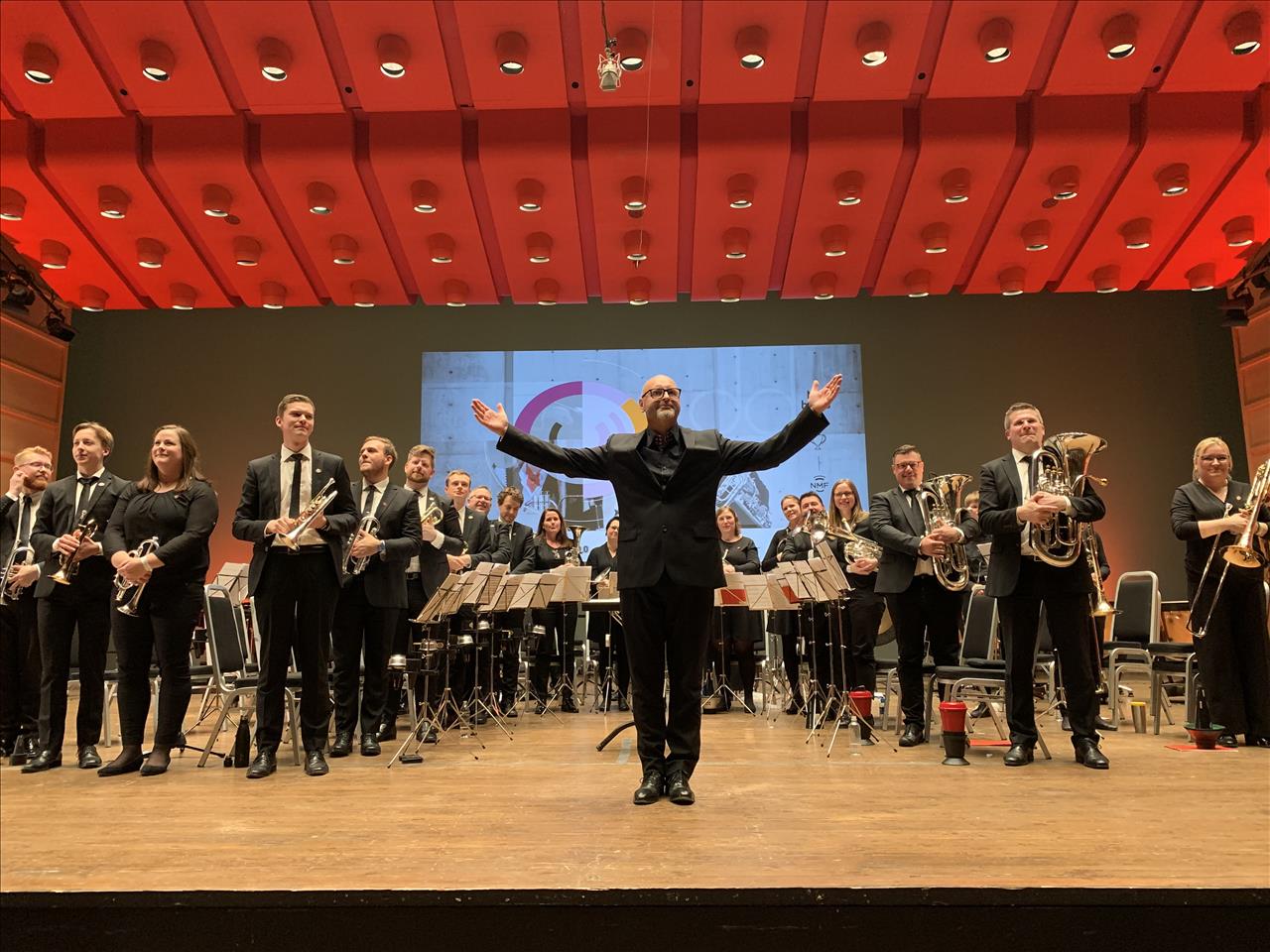
A performance that dripped with noirish sentiment — dark, gothic and imposing in its mechanical drive and sense of decadence, allied to the tenderest heart-felt emotion beneath it all.
Great effects (the siren nearly heralded a Viking assault — but not too sure the split euph worked) but with the MD keeping the music flowing with a very humane musicality.
Lots of lovely moments — nothing saccharin coated either. Sop sent a shiver down the nuts and bolts spine of the 'Maschinenmensch' robot for sure to get her oily juices flowing.
It was followed by a wicked build to the reprise and climax — full bodied and triumphant to round off another high quality performance from an impressive band and MD in best Fritz Lang mode.
- Saturday 8, 14:34:26
Draw:
Elite Division:
Adjudicators: Rex Martin, Lito Fontana, Sheona White
1. Tertnes Brass (Martin Winter)
2. Oslo Brass (Ivan Meylemans)
3. Bjorsvik Brass (Andreas Hanson)
4. Stavanger Brass (Allan Withington)
5. Krohnengen (Prof Nicholas Childs)
6. Oslofjord Brass (Frode Amundsen)
7. Eikanger Bjorsvik Musikklag (Ingar Bergby)
8. Manger Musikklag (Peter Sebastian Szilvay)
9. Jaren Hornmusikkforening (Florent Didier)
10. Kleppe Musikklag (Philip Hannevik) - Saturday 8, 12:28:24
People are enjoying the action...
Fantastic standard of playing in first section this morning! Hard to pick a leader but just heard an absolute fabulous performance by @BrassRong that will hard to beat today. @tomrabrassband still up there as well. #nmbrass2020
— Morten E. Hansen (@MortenEHansen) February 8, 2020 - Saturday 8, 12:25:31
Meanwhile, back at the ranch...
The music making has been taking place in the First and Fourth Divisions this morning.
Over the years the First Division bands have really stretched themselves with their own-choice selections — some putting ambition before reality it must be said.
Not so this year, with a host of choices so far that have certainly suited their skills sets. We started the day with a finely worked 'Titan's Progress' from Molde, followed by a cracking 'Earthrise' by Sola, an effervescent 'Destination Moon' by Askoy and lyrically engaging 'Dynasty' by Tomra.
Radoy brought us the great sounds of 'Brass Blot!' and Brottum the contrasting elegance of 'Elgar Variations'. Now we have just enjoyed a premiere performance of Stijn Aertgeerts' 'Bipolar(ity)' and Hasle' colourful 'Sinfonietta No 3'.
All very good choices — right within the band's limits — and all played very well. This could be a hard contest for the judges to sort out come the results.
- Saturday 8, 12:16:00

Mr Benn and brass bands in Bergen
I don't know if there has ever been a Norwegian version of the 1970's children's programme Mr Benn, but they could do a NM banding version here at the Grieg Hall given that quite a few players seem to appear 'as if by magic' dressed in a different uniform.
Nothing sinister about that (Mr Benn used to come from work dressed in his bowler hat and walk into a shop where he asked a man if he go in the back and dress as a Red Indian for 5 minutes...) and as long as the players are members of the bands involved its allowed.
It's part of the banding culture here — and it isn't abused just to use local 'ringers' — although the usual caveat applies for 'illness' etc which does see Mr Benn dressed as a form of brass band overseas contest aid worker.
- Saturday 8, 11:16:10
Other Elite Division opinions are available...
Halfway prediction
GrumpyBrassBander (@BanderBrass) February 7, 2020
1. @TertnesBrass
2. @Jarenhmf
3. @OsloBrassBand
4. @Kleppemusikklag
5. @BjorsvikBrass#nmbrass #nmbrass2020 - Saturday 8, 11:11:51
All inclusive music making
The Norwegians have certainly got the right idea when it comes to developing strong grass roots banding. Not only do they invest in youth music and teaching, but the contesting here at the National Championships is all about inclusion and participation.
Much like the Fifth Division yesterday, the Fourth here this morning is all about communal enjoyment.
The test pieces are own-choice, enabling bands to pick something that suits them or just tickles their fancy (we have had everything from 'Viking Age' by Thierry Deleruyelle to 'Resurgam' by Eric Ball), the registration rules are relaxed so players can help their local bands out, and there is open adjudication.
The judges are trusted to make the decisions and the audience packs the hall looking forward to hearing good music played well.
It's a blueprint for better banding that works, and works well.
- Saturday 8, 09:42:50
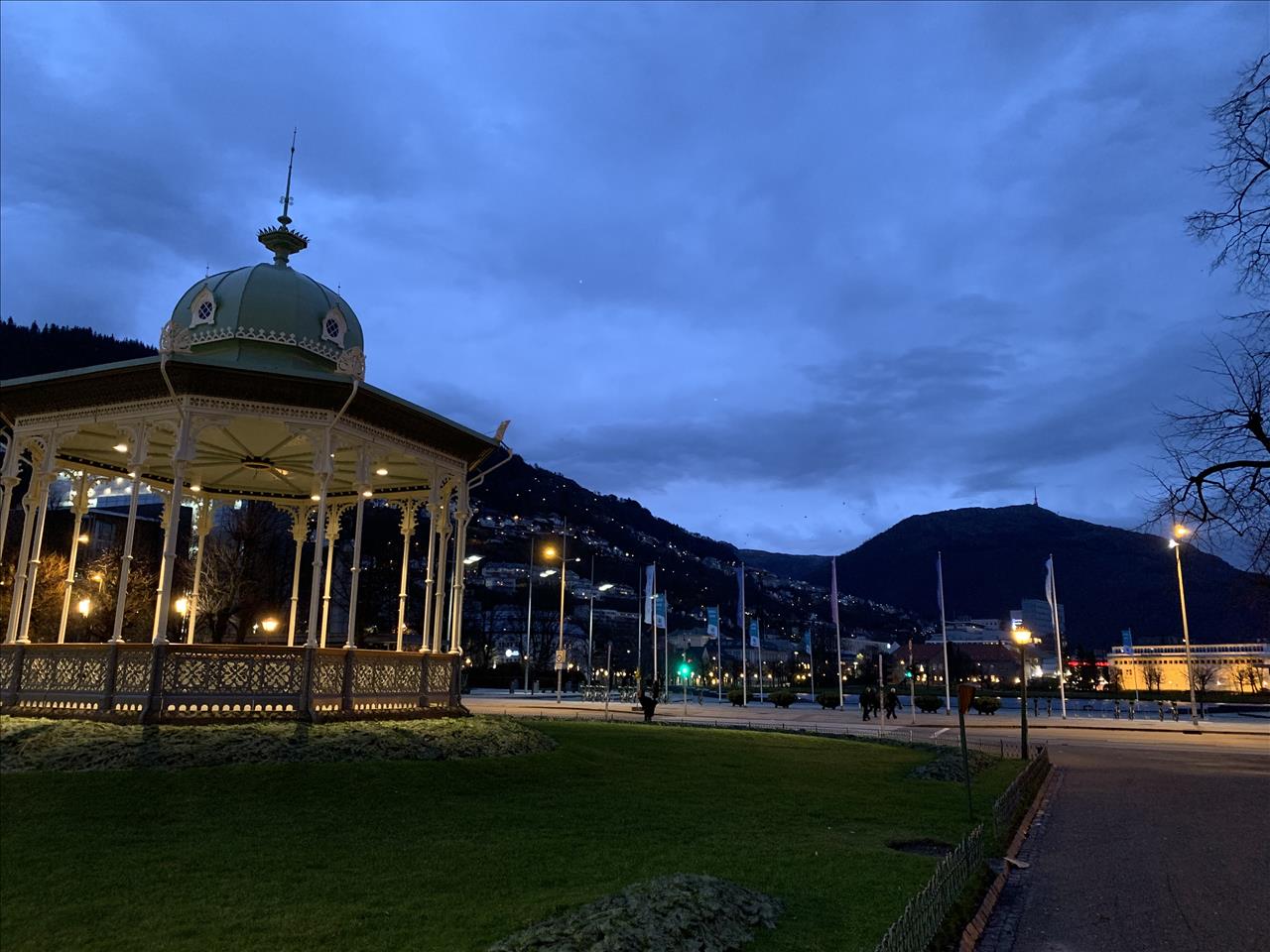
Good morning from Bergen...
It's been an early start as the action kicked off at the Grieg Hall on the stroke of 8.30am.
As you can see, the city looks very picturesque in the emerging morning light — although for the next 12 hours or so we will be inside the hall bringing you a taste of the action as it unfolds, and our live coverage of the own-choice performances in the Elite Division.
Plenty to look forward to then — and we have already enjoyed a super rendition of 'Titan's Progress' and the blast off 'Earthrise' to start the day.
Much, much more to come though...
- Friday 7, 21:58:34
See you tomorrow...
More action to come on Saturday where we will bring you a flavour of the day followed by live coverage of the own-choice top section.
Time now for a quick snifter before bed...
- Friday 7, 21:53:32
Round up and halfway prediction:
We have heard a very, very fine piece of brass band writing given a number of equally outstanding performances today — led by a quite sublime interpretation and delivery of their conductor's intent by Eikanger.
It is sometimes easy to write in superlatives about this band, but today they lived up to them all — and more, inspired it must be said by the man in the middle. Ingar Bergby is some talent — deeply intuitive and responsive to both the needs of the score and of his players.
No shame in coming second to this today — and Stavanger produced a superb account themselves alongside Manger. Next to nothing to choose between them for us — followed by Tertnes, Krohnengen, Oslo and Kleppe.
Halfway point prediction:
1. Eikanger Bjorsvik
2. Stavanger
3. Manger
4. Tertnes
5. Krohnengen
6. OsloDark Horse: Kleppe
- Friday 7, 21:09:37
Elite Division:
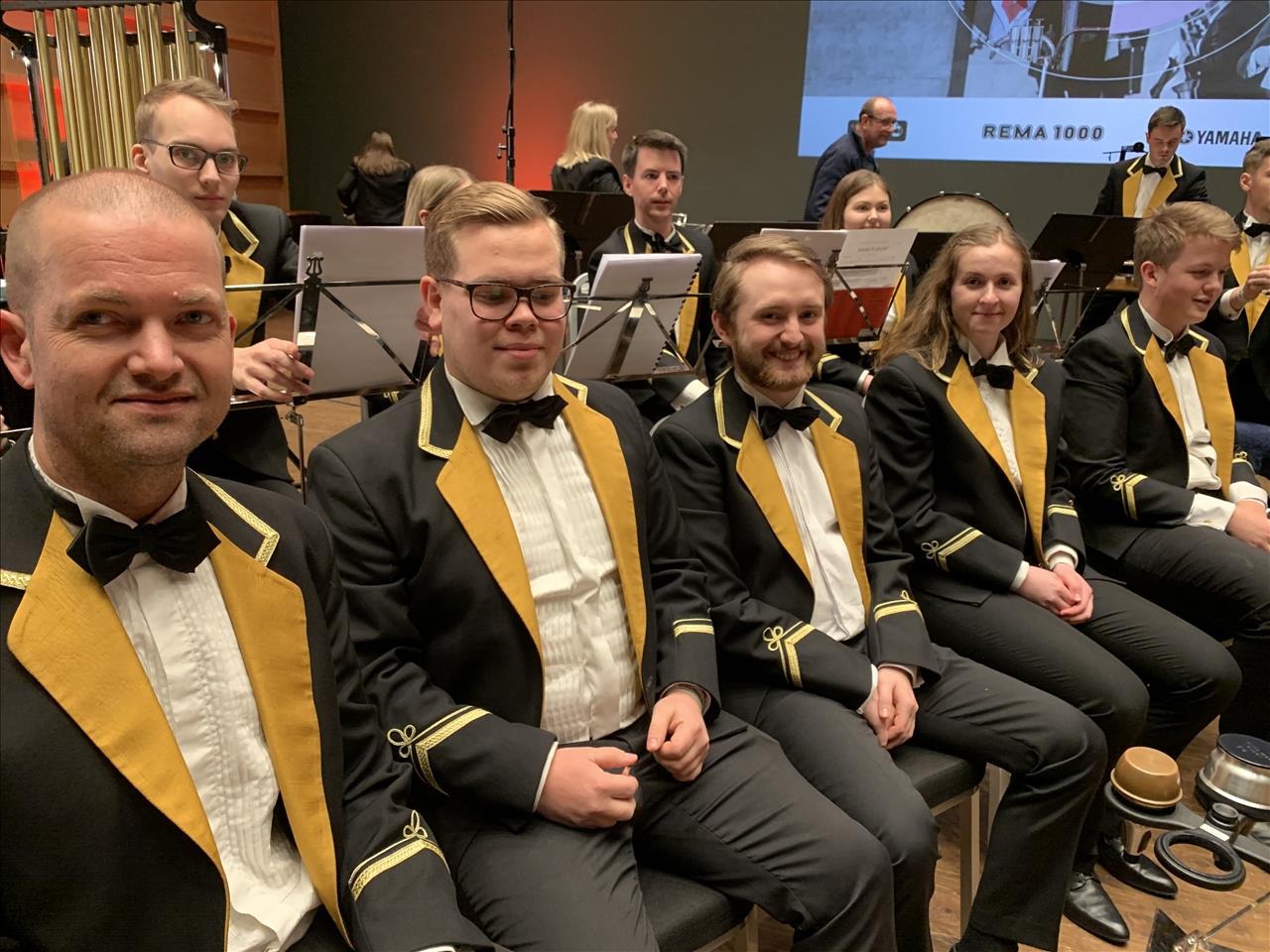
10. Krohnengen (Prof Nicholas Childs)
A darkly hued, impressively constructed account — one that kept its cold, dramatic pulse beating from first note until last.
There was a spiteful viciousness when required balanced by a frozen delicacy that brought an air of mystery and deathly surrealism to the fore — backed by razor sharp perc section and confident lead lines. MD had this one under his control for sure — nothing missed.
The flowing lines had a tender emotion too — led by connected flugel and trom and fine cornet and top notch euph. Just the odd moment of unease, but this drew you back towards the deep pool — the build to the 'danse macabre', surreal in the tolling of the bell.
Then there was no holding back — pulsating ever manically to an ending that cannot be denied, to draw an engrossing account to a close.
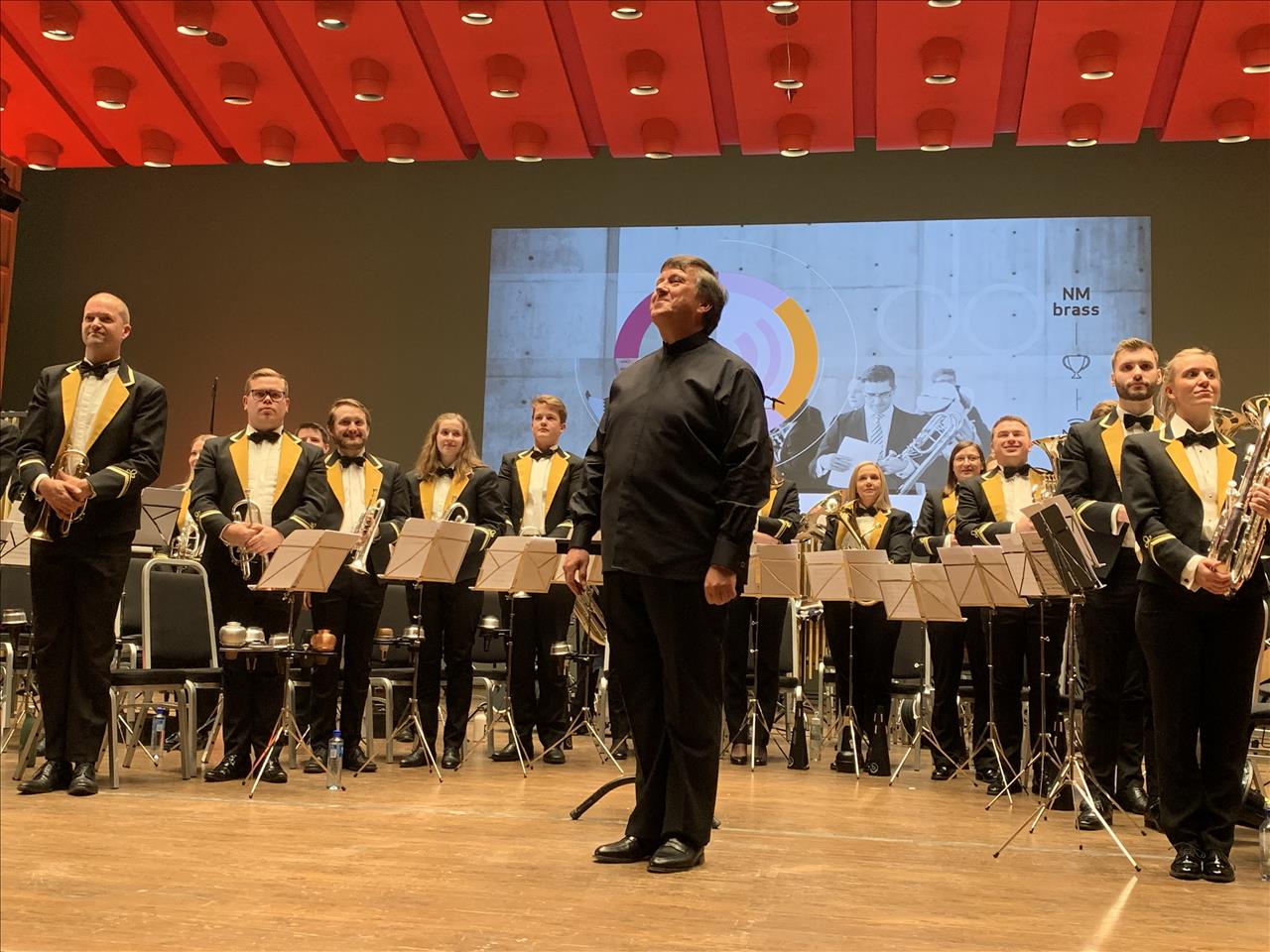
- Friday 7, 20:38:08
Elite Division:
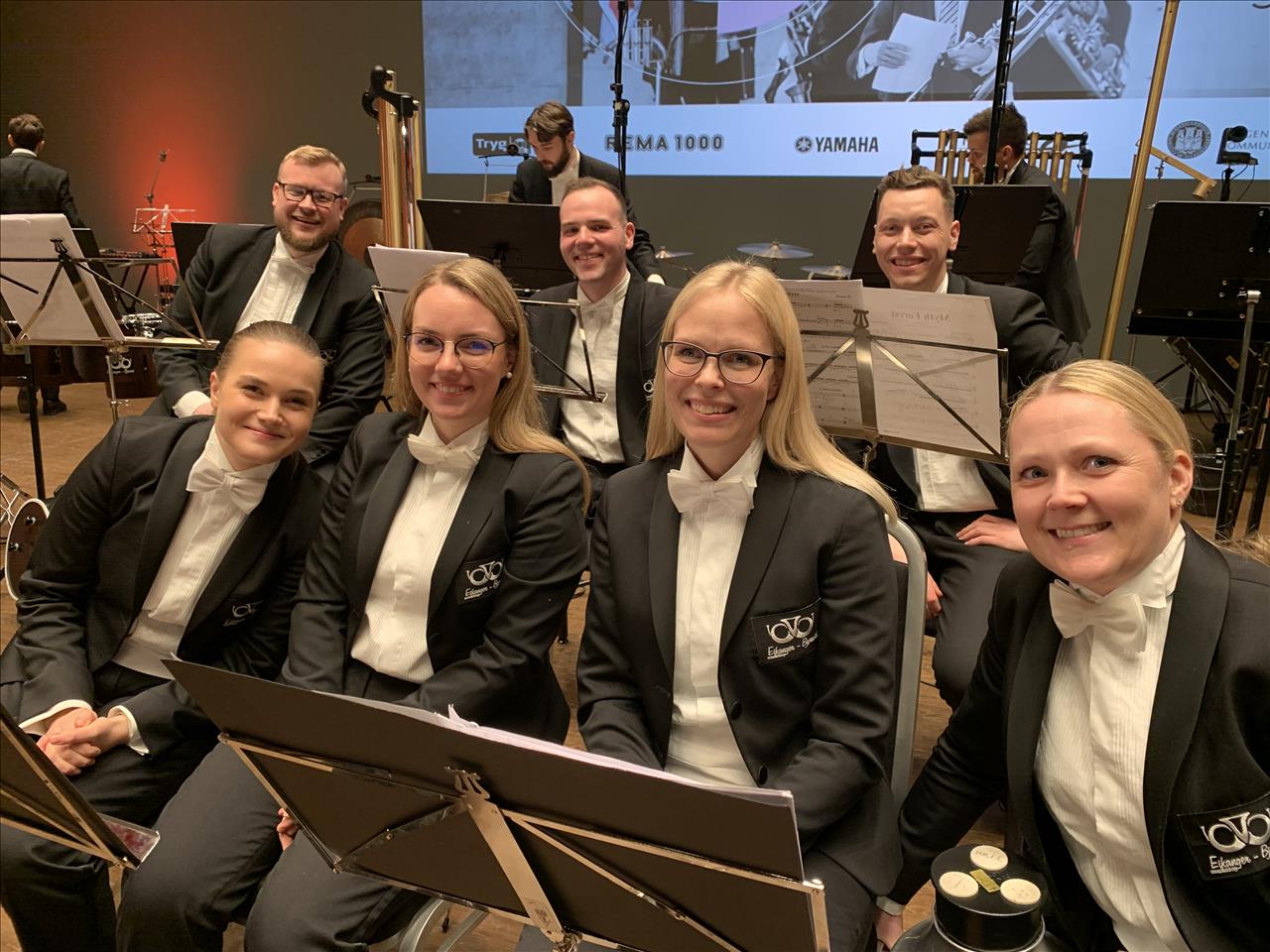
9. Eikanger Bjorsvik Musikklag (Ingar Bergby)
Layer upon layer upon layer of frozen tonality and ensemble compactness — but each so clearly defined yet interlocked to be as unbreakable as Antarctic sheet ice.
MD shaped and moulded this into the exact form he wanted — the music drawing the listener ever deeper under the waters of the dead pool. The flickers of life were motifs of decay and death — each note having meaning and effect. Trom and flugel sensed each other's movement — the feeling of loss palpable but curiously so warmly emotive.
Those layers never wavered even in the densest textures — the cornet and euph played with such decisiveness as the sulphurous waters bubbled below them. There really was something other worldly about this.
The 'danse macabre' was an equine romp — full pelt, headlong into the abyss — the MD cracking the whip in his dead eyed deliverance.
Utterly compelling playing this — utterly and totally.
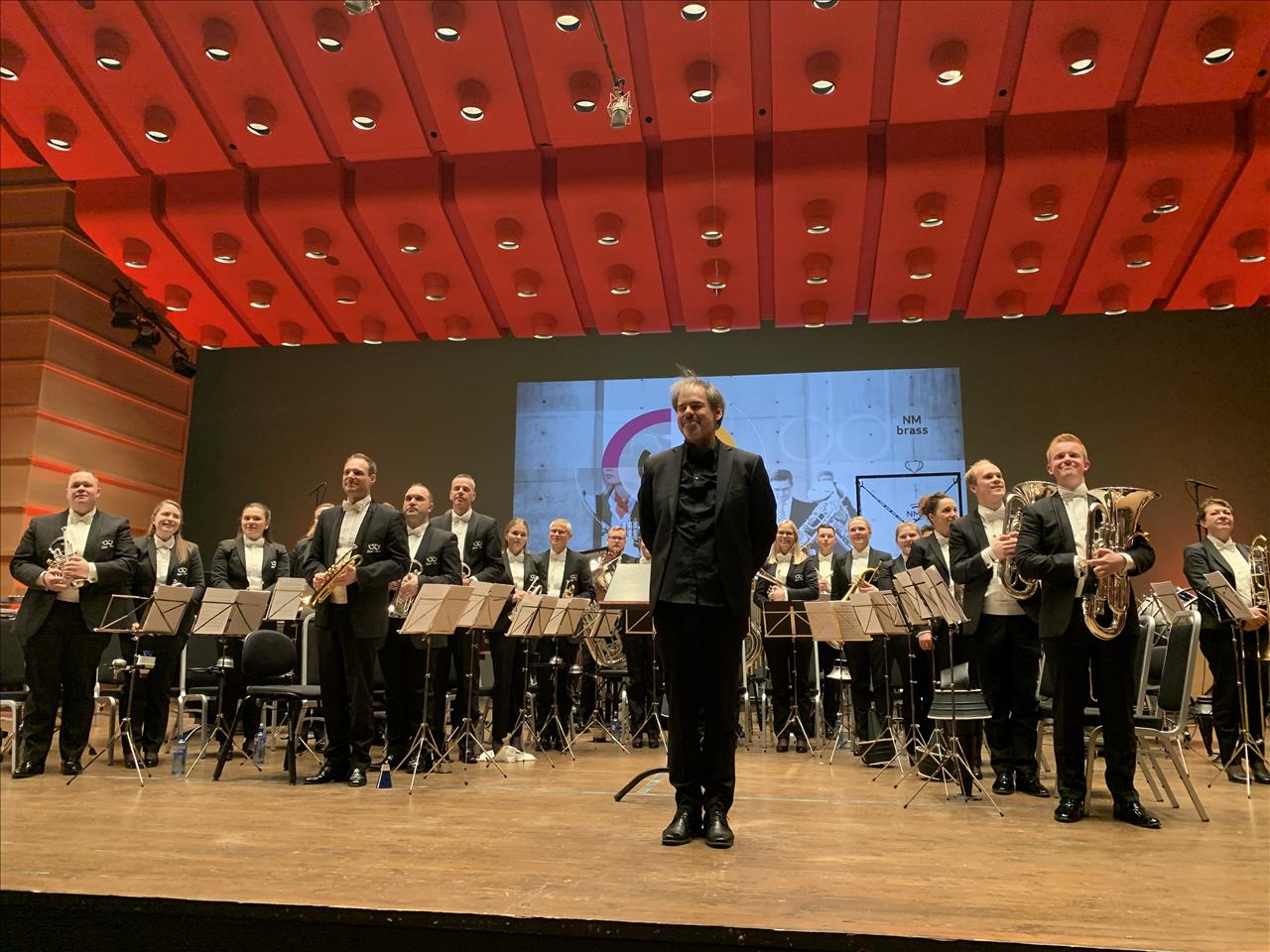
- Friday 7, 20:00:57
Elite Division:
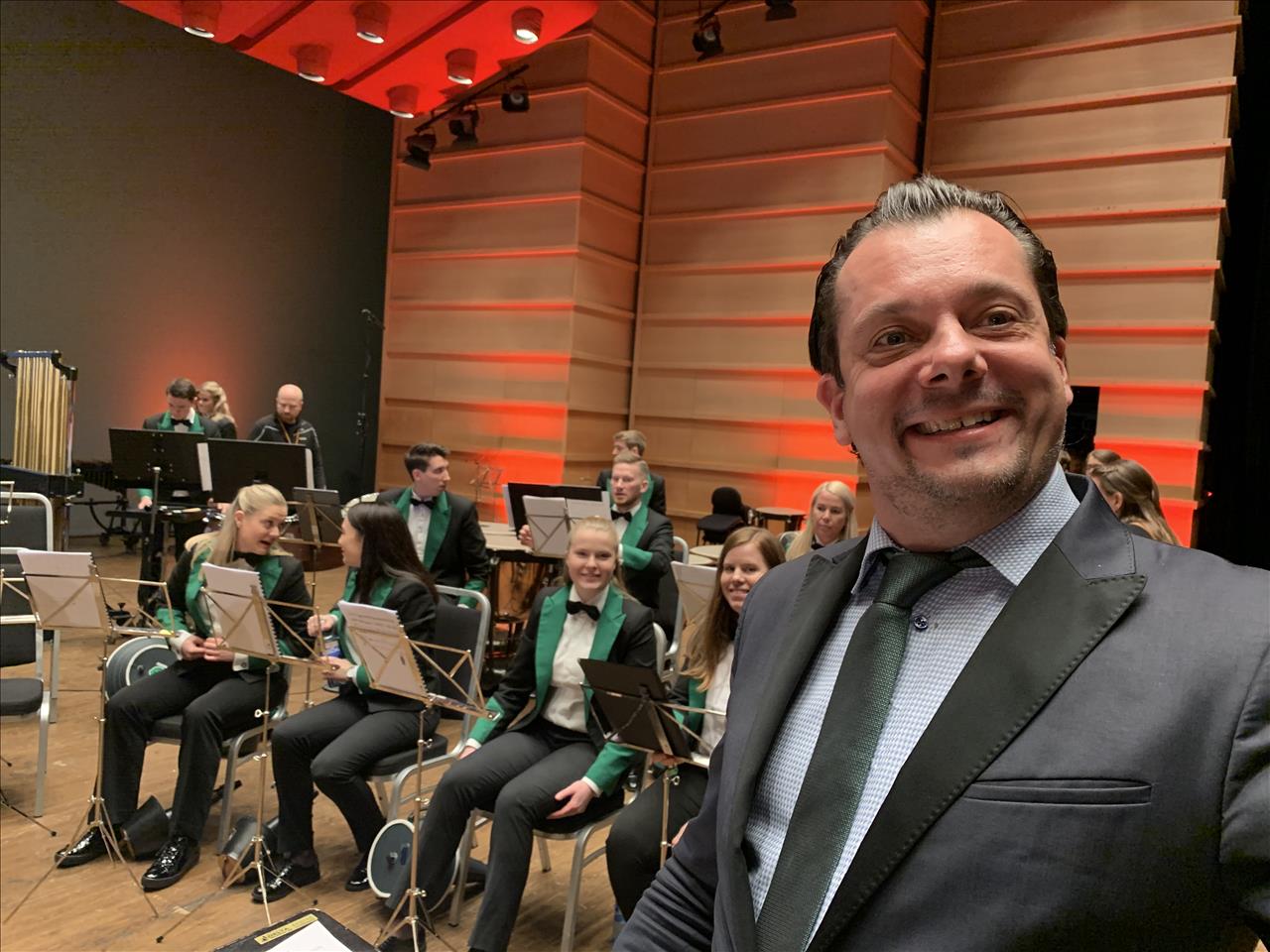
8. Manger Musikklag (Peter Sebastian Szilvay)
There was a shaft of icy despair that ran through this performance — deathly in its frozen beauty, but also connected to the deepest depths of the abyss like Lucifer's personal elevator.
MD was a cross between Aleister Crowley (albeit with a full mop of jet black hair) and Beelzebub too — drawing such rich streams of sinister malevolence from the score. The ensemble had a tar-like tonality that had an oily shimmer aided by the lead lines (with a super trom/fluel duet). The flow of the music was so viscous — always finding new places to go.
Cornet and euph played with disciplined excellence before the graves were opened and all hell broke loose — the 'danse macabre' all that and more — spiteful and unbending, racing to the very edge of doom — urged to the last by the MDs diabolical intent.
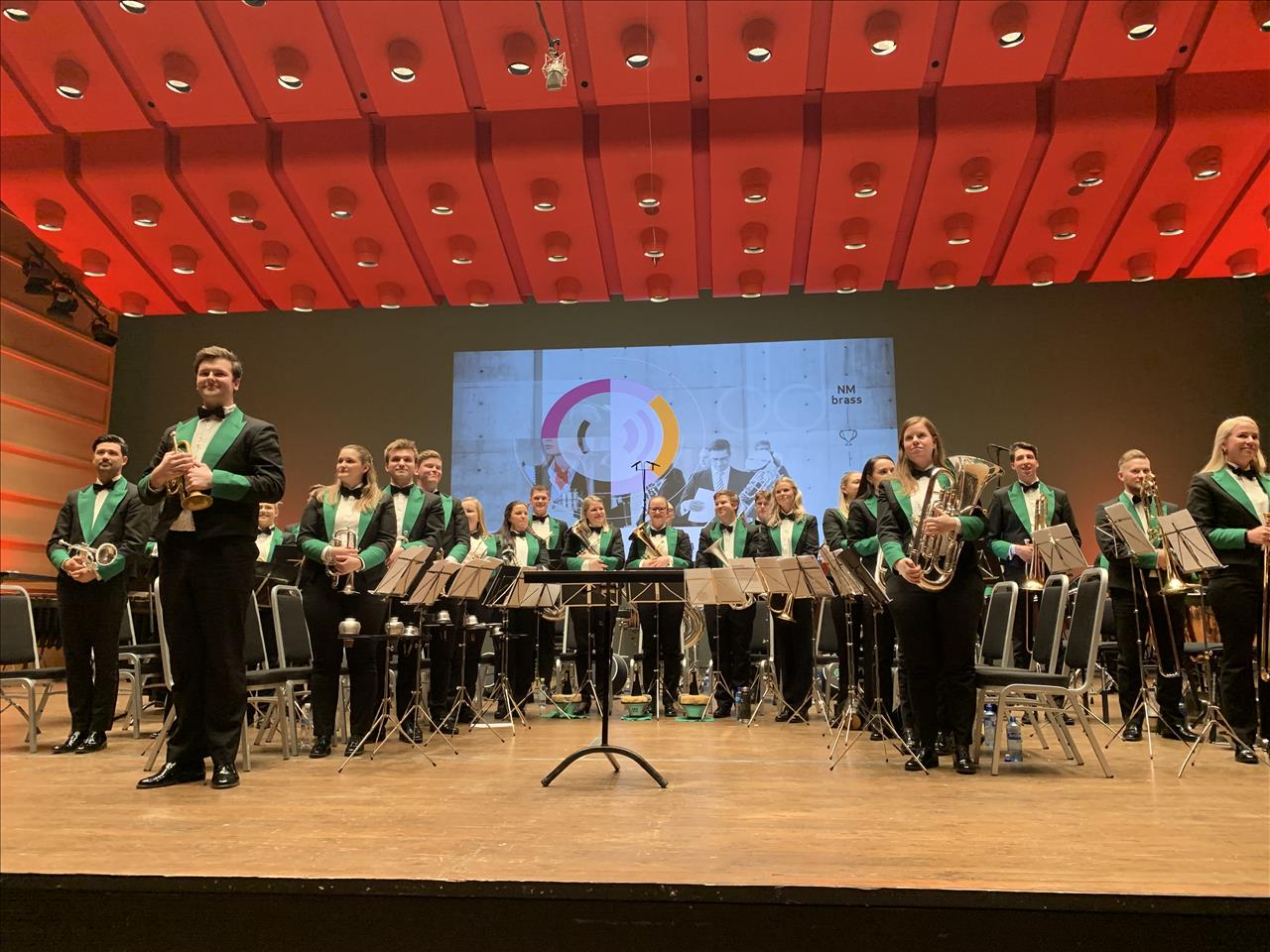
- Friday 7, 19:32:25
Elite Division:
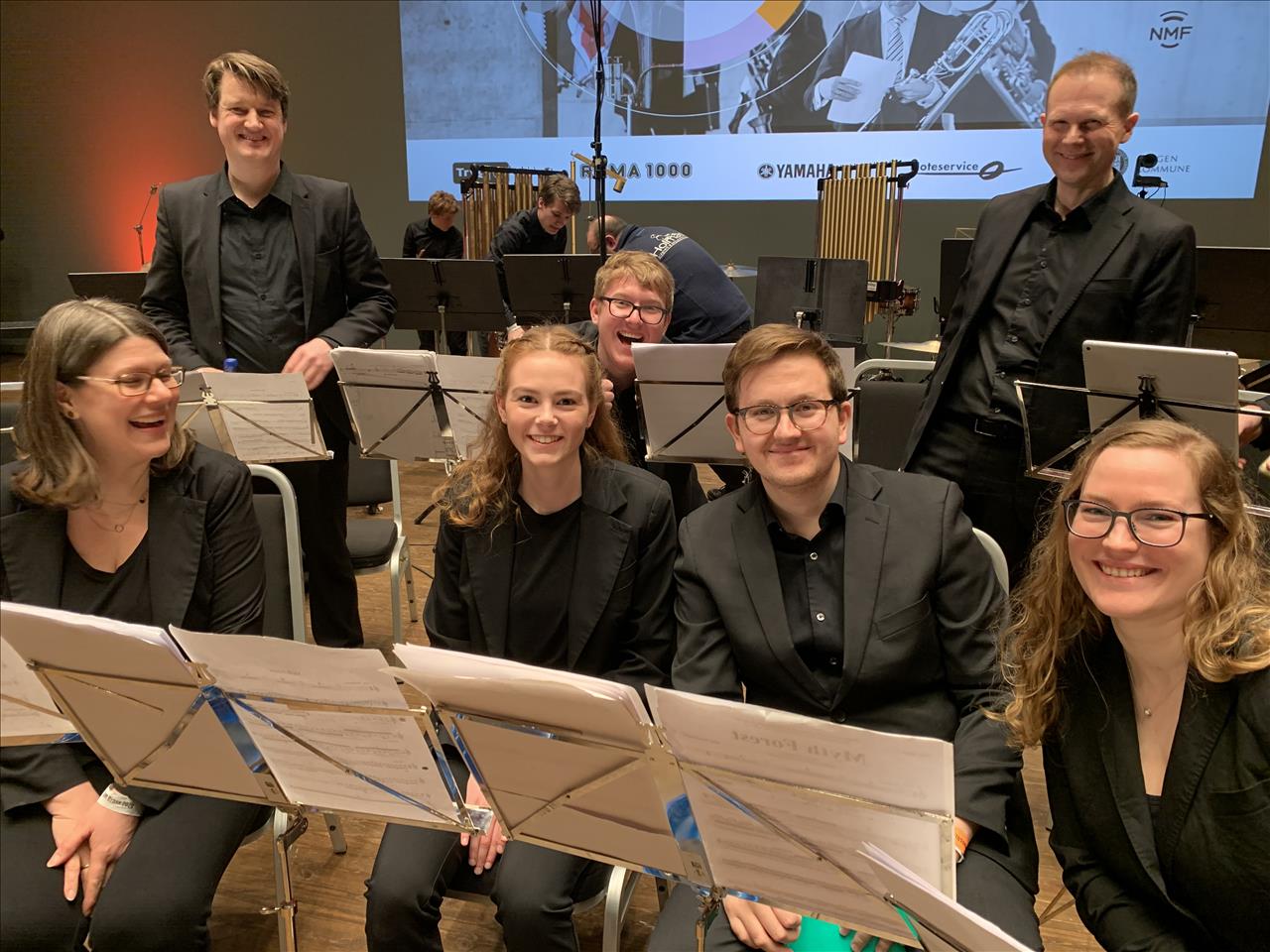
7. Oslofjord Brass (Frode Amundsen)
A performance of well measured sensitivities — from the stark and forbidding to the frozen delicacy of crisp edged leaves that have fallen beneath your feet as you trudge towards the sulphurous dead pool.
Everything was laid out with a purpose — no psychological misapprehensions at all — just good, solid, high class playing flowing coldly but freely. The musical aesthetic was admirable — led by the MD and aided by classy lead lines — esp cornet and euph.
The finale could have just done with a darker edge of malevolence as the music headed into the endless abyss, but it was all there to be heard and feared — a cold hand ready to push you that extra step into the Stygian watery grave.
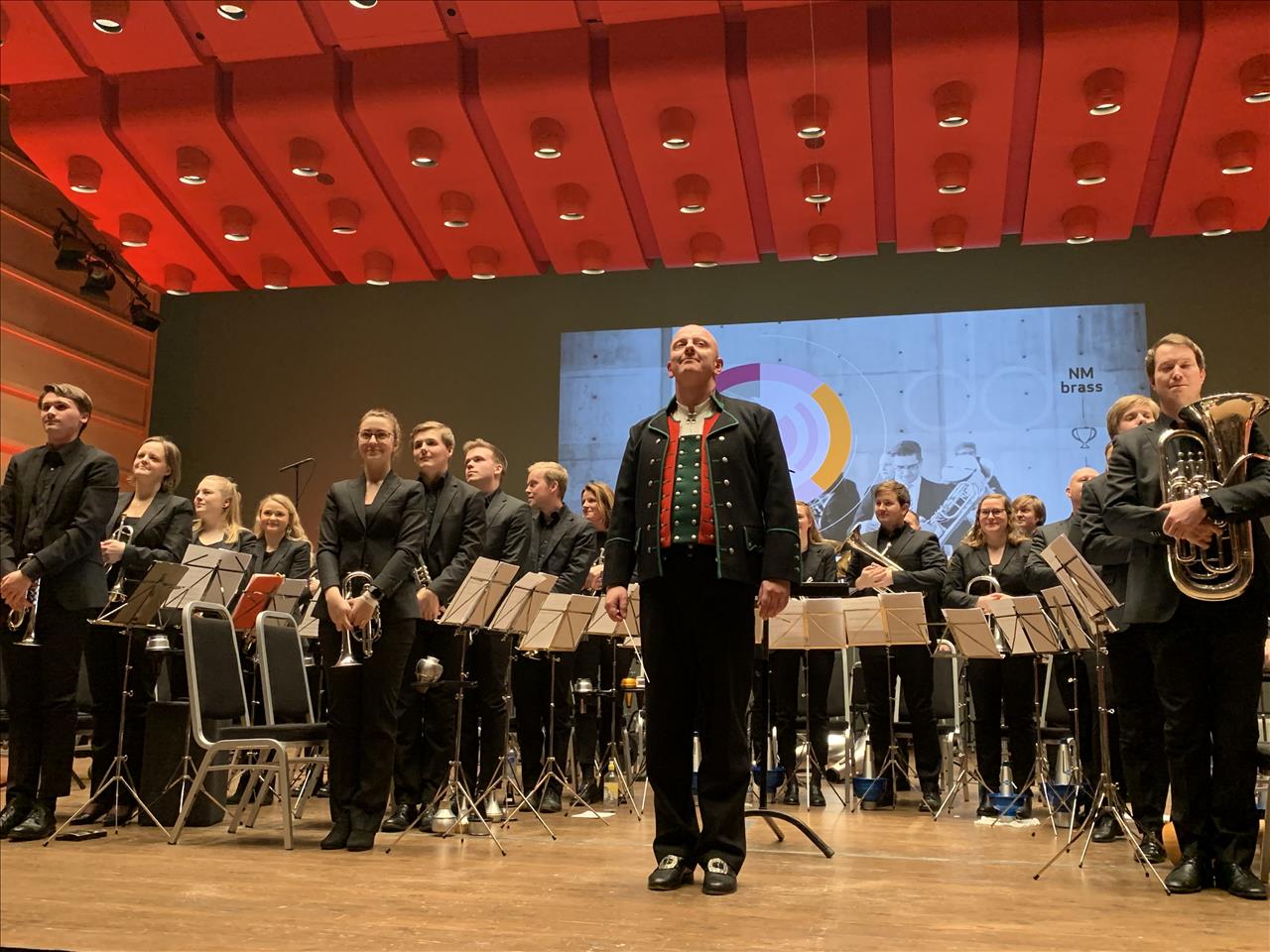
- Friday 7, 19:02:45
Elite Division:
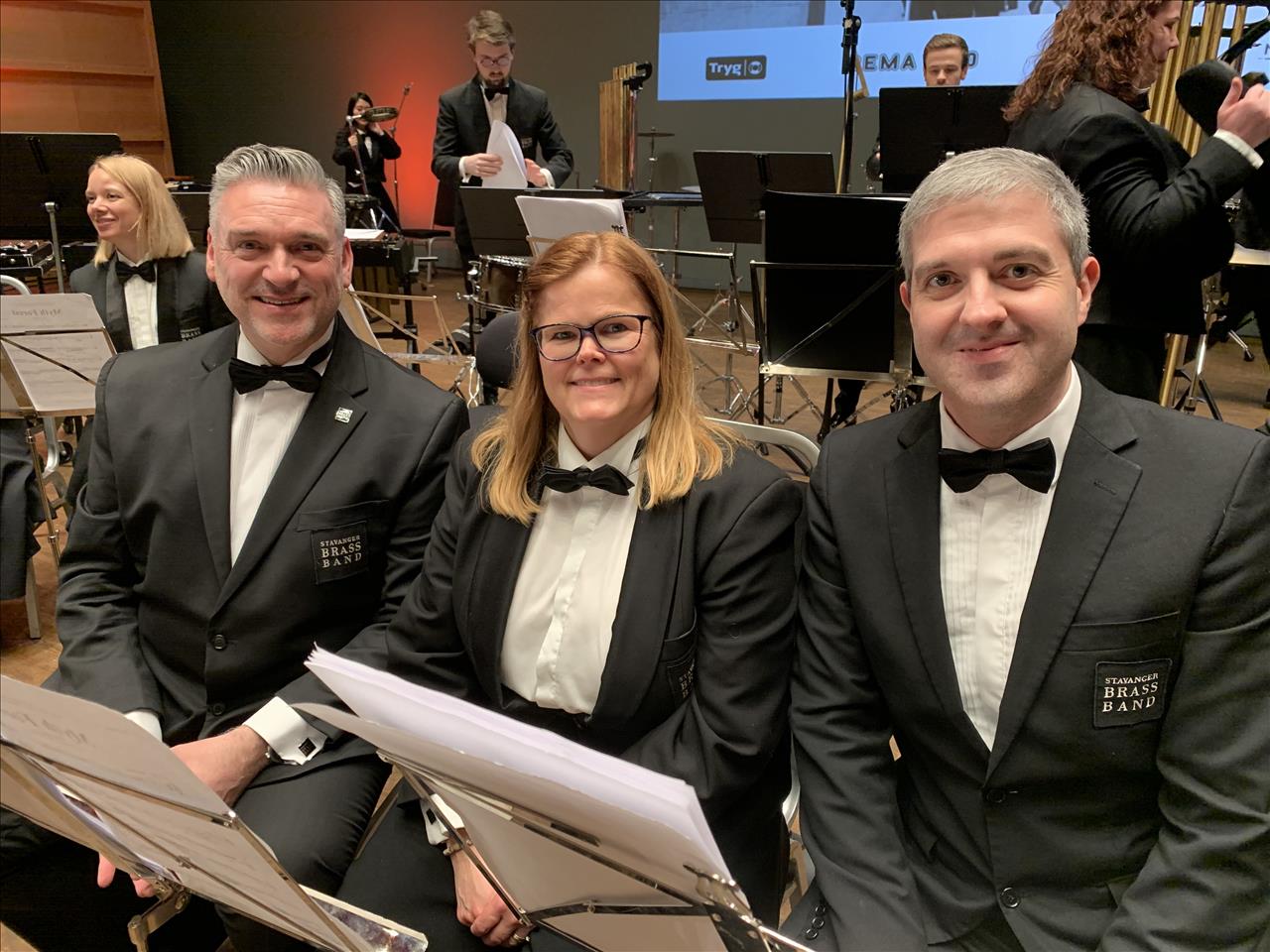
6. Stavanger Brass (Allan Withington)
Funereal splendour laced with cold acidity. Blimey — this could have dry-freezed the flesh off the bones — right from a despairing opening that ached with malevolence.
As dark and sharp as the MDs suit — death walking amongst us — sinister, unyielding and all embracing. The standing trom/flugel duet was like two mourners at an open grave. There was such a cold beauty to the playing built to a monumental climax.
The music found a bubbling intensity aided by the classiest of lead lines, and underwent a form of cold fusion to a 'danse macabre' finale that drew the last vestiges of life from the body as you sank beneath the water — your final breath frozen before your eyes.
Even the Grim Reaper would have twitched a bit on that. Diabolically brilliant.
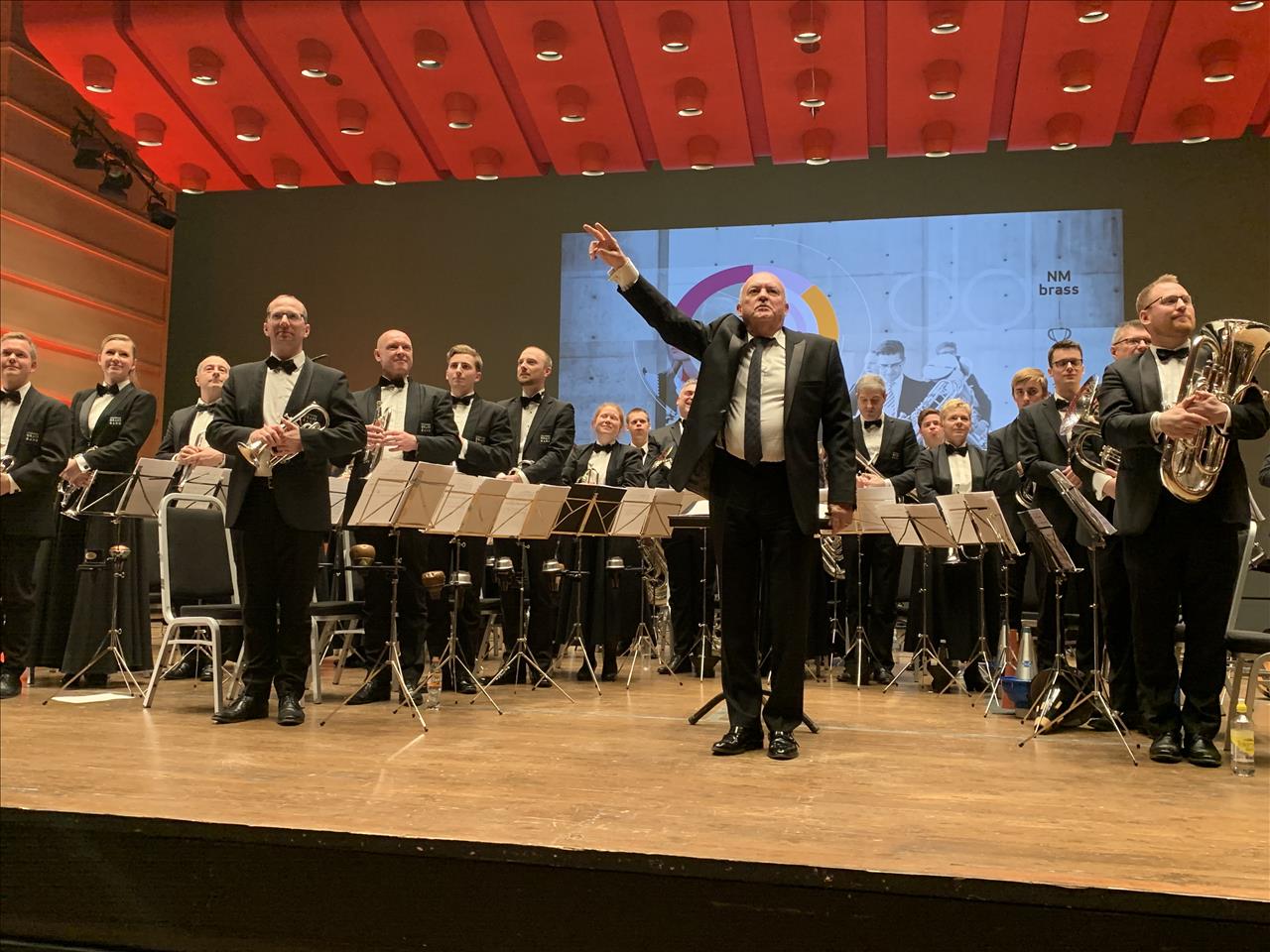
- Friday 7, 18:52:03
Short break
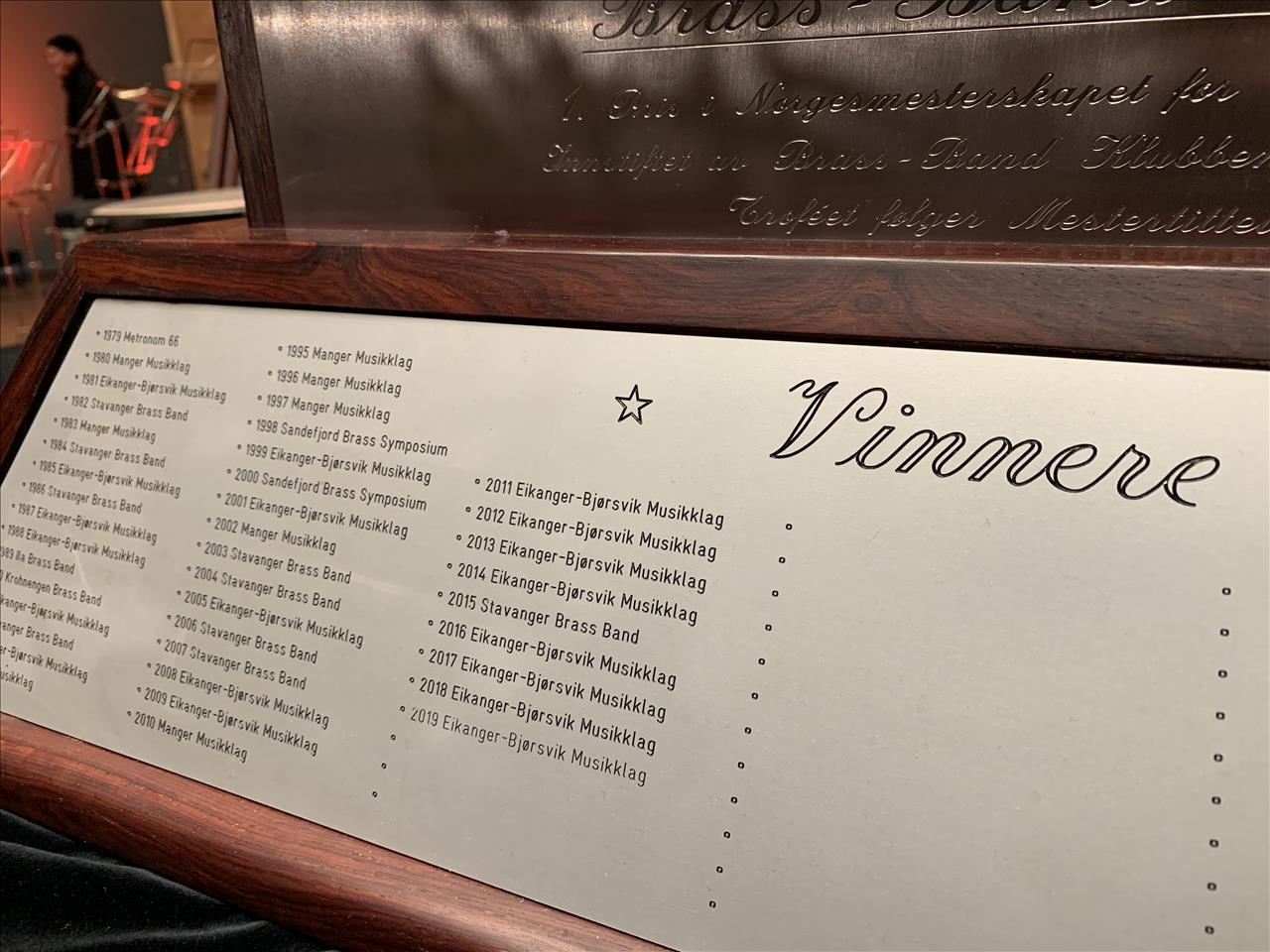
The adjudicators are being given a short comfort break before it all starts again around 7.00pm local time.
It's all up for grabs at the moment — so we will wait and see what the second half brings before making any prediction.
- Friday 7, 18:06:55
Elite Division:
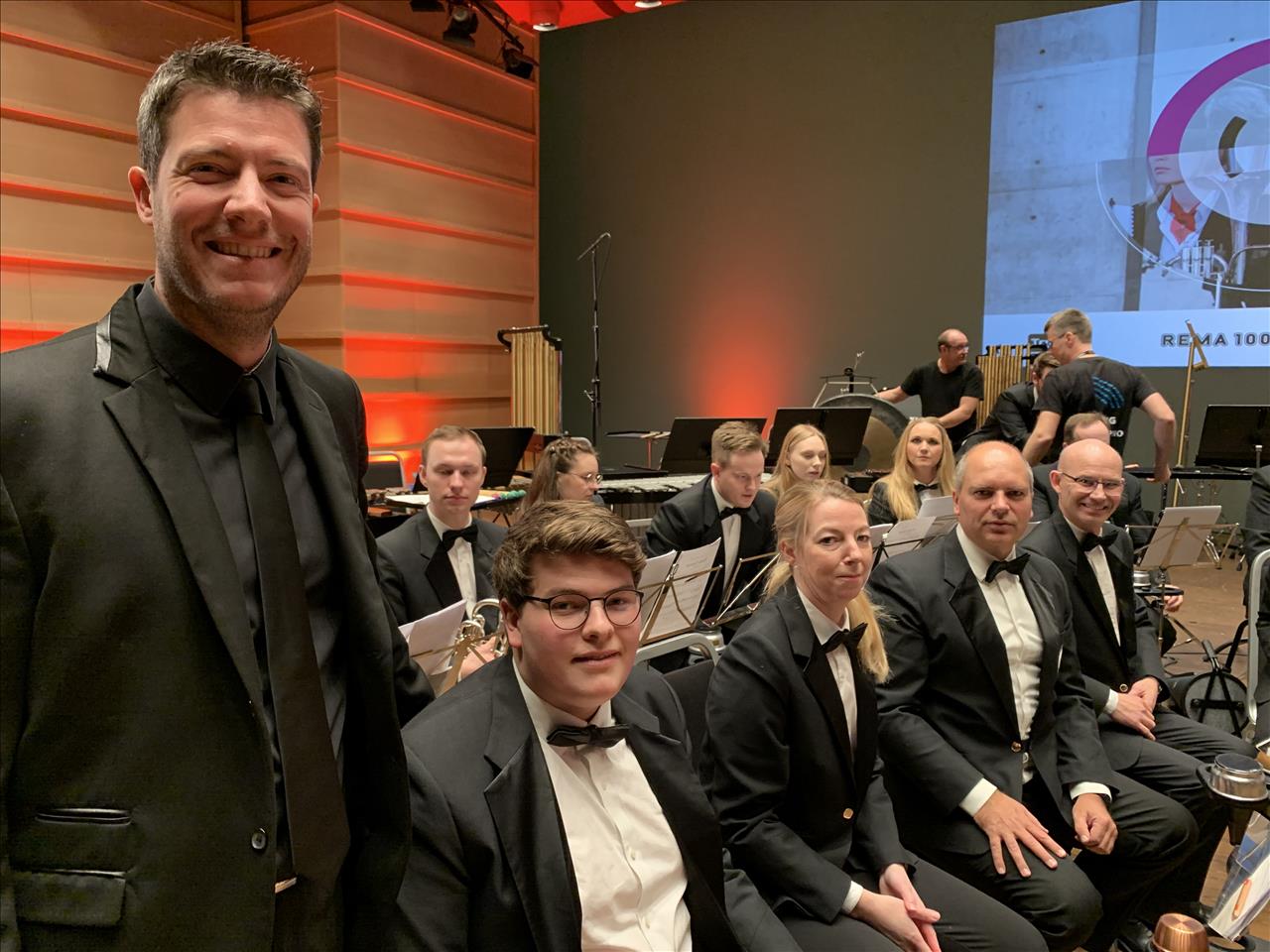
5. Jaren Hornmusikkforening (Florent Didier)
The broadest lines of engagement with the score displayed here — but they hemmed in all the gory, ice chilled music like the bloodiest, Bloody Mary in a shot glass.
No doubt 'le cheval est mort' — dispatched with a touch of Gallic refinement too — nothing overplayed, over exaggerated or misplaced. The elongated solo lines had a tenderness to compliment the solid ensemble of sonorous tonality.
A very different approach this — the finale a fleet-hooved dance of death, almost whimsical but knowing in sentiment — a fait acompli leading to inevitable demise to close a sometimes troubled but always enticing account of dark undercurrents of thought and deed.
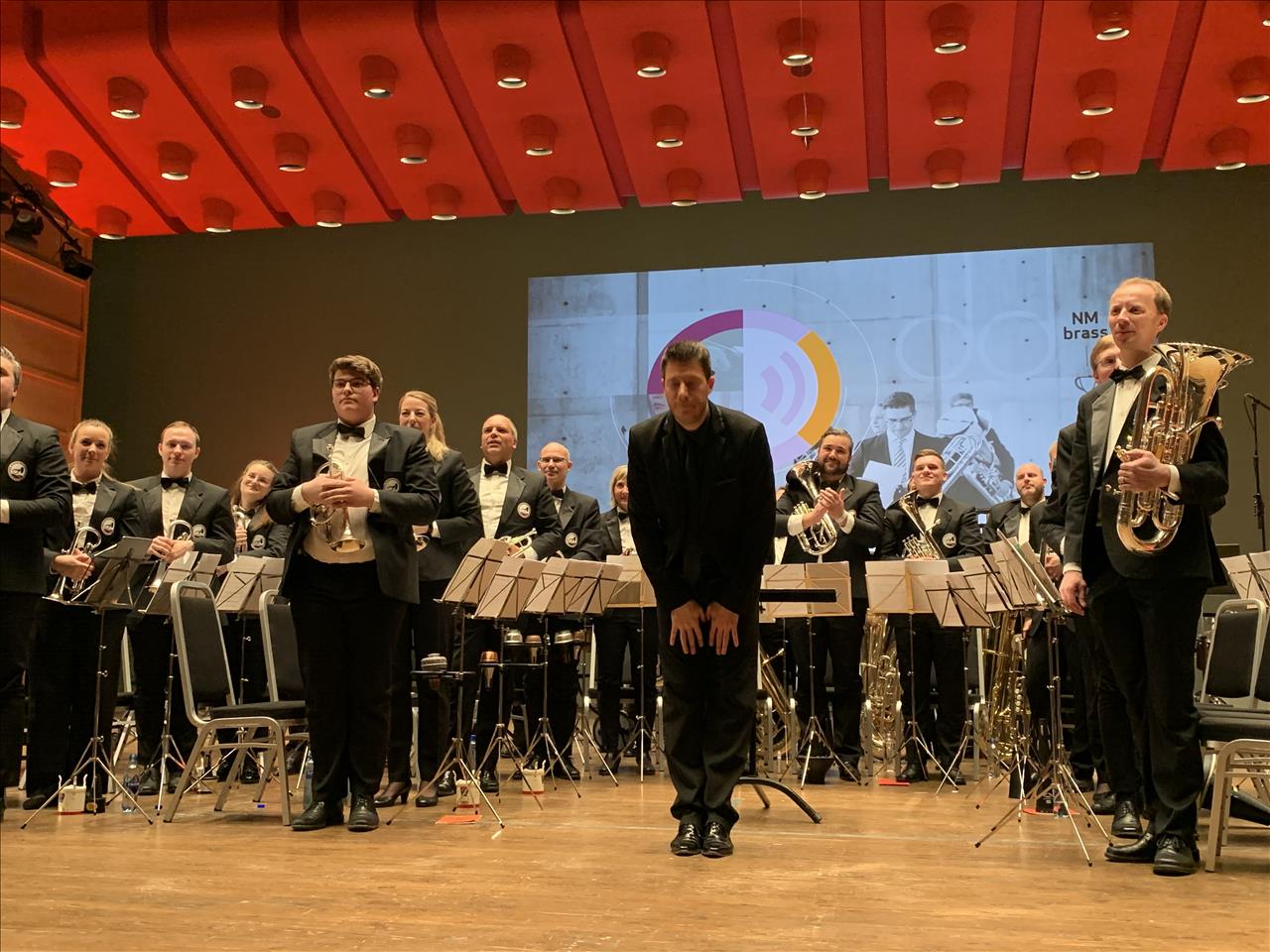
- Friday 7, 17:33:52
Elite Division:
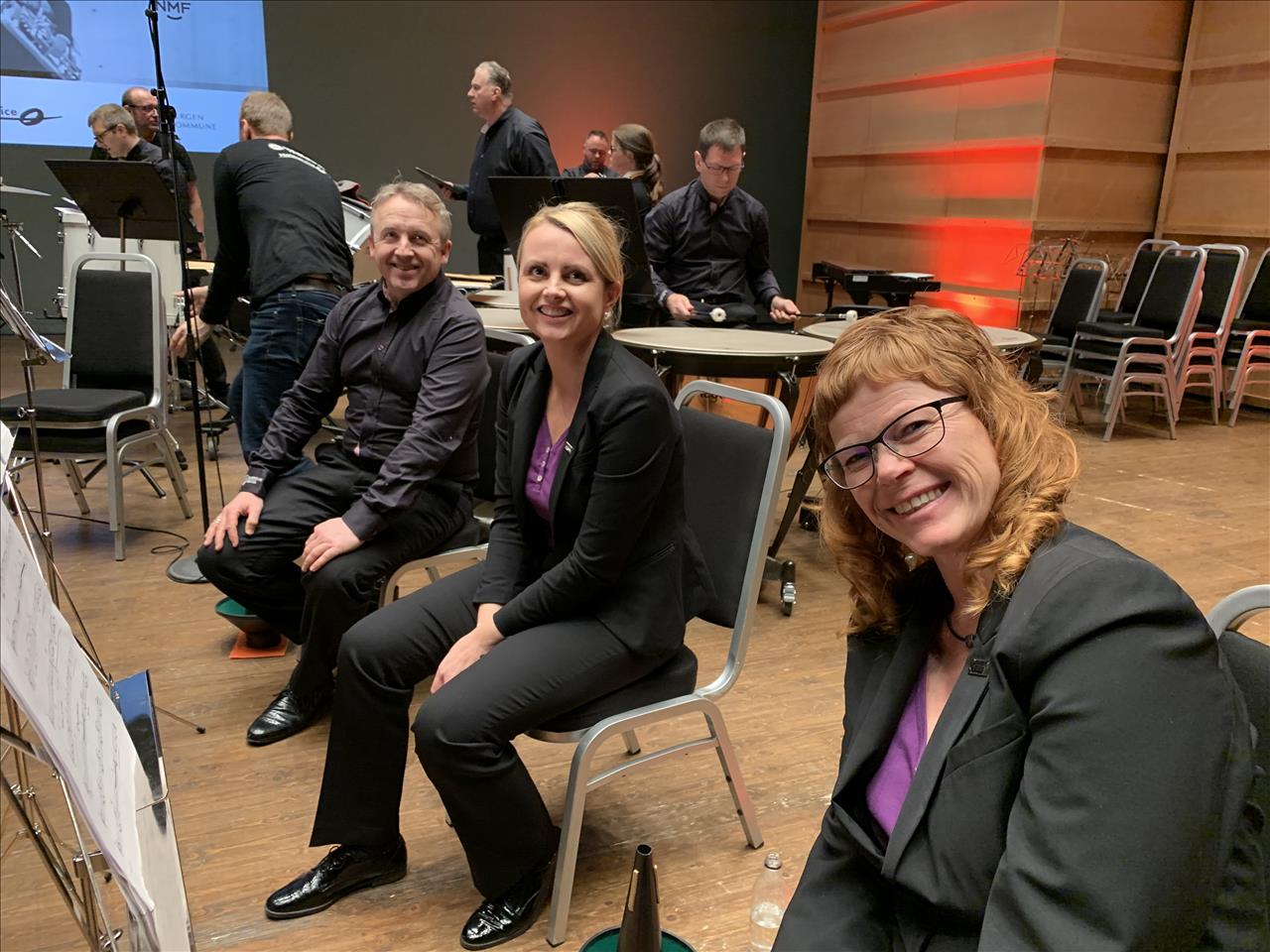
4. Bjorsvik Brass (Andreas Hanson)
The full kaleidoscopic treatment — no monochrome mystery or surreal thoughts of Nietzsche — this was charnel house stuff — an equine throat slitting with the MDS most elegant baton, followed by old Shergar being dumped into the lake like a bag full of rotting offal.
Lots of boldness, plenty of icy fear and ensemble playing of glacial form and fluidity. Soloists (esp euph and cornet) revelled in the spotlight — all under the spell of the MDs superb, almost sinister musicality. Dark this — Bible black pitch-tar dark.
The MD conducts like Hannibal Lecter — cutting the music into beefy chunks — whilst still oozing life though.
The malevolent, supple dance caught an hypnotic pulse that never let go — drawing you further and further to the edge of that abyss.
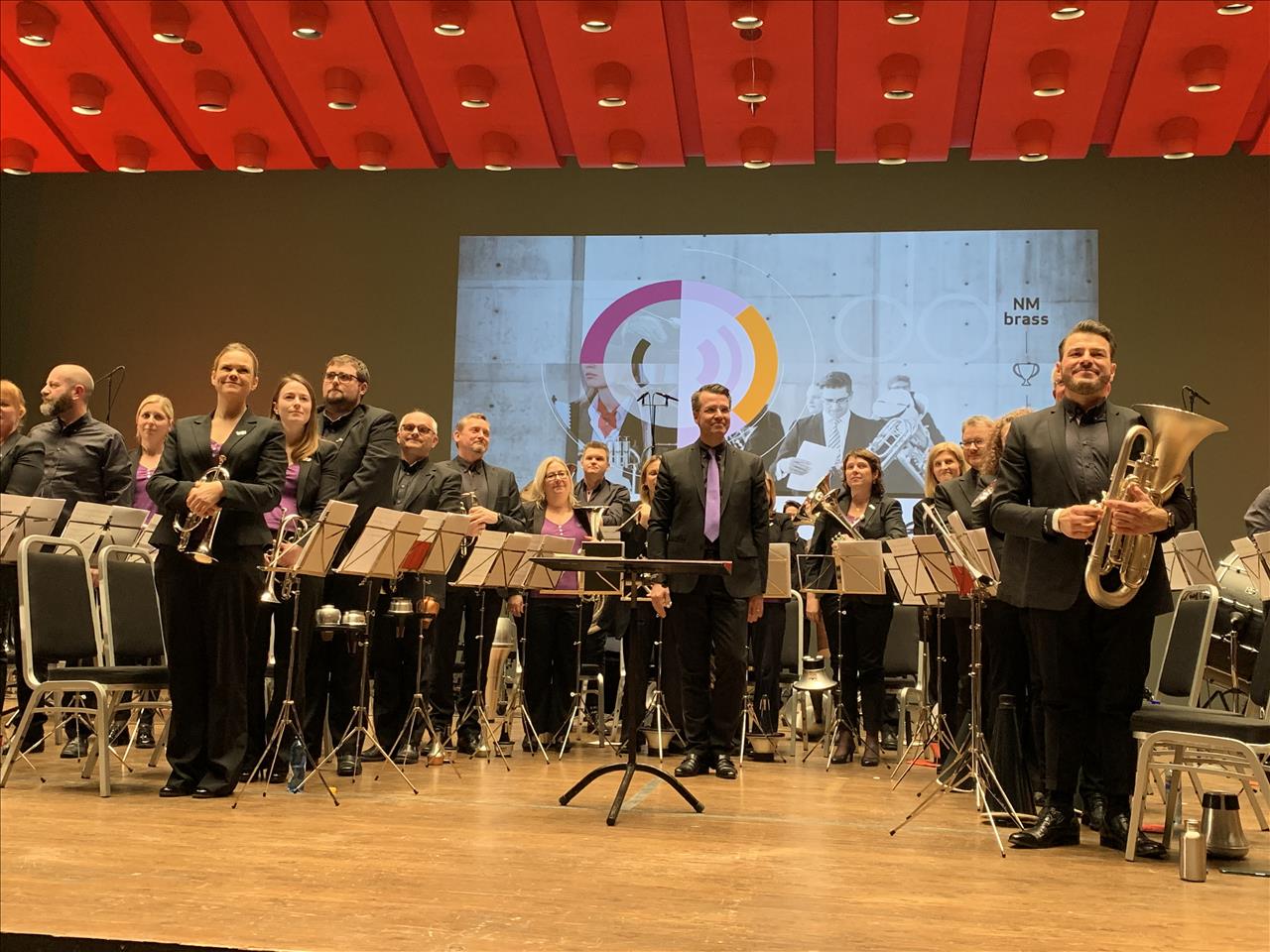
- Friday 7, 17:03:40
Elite Division:
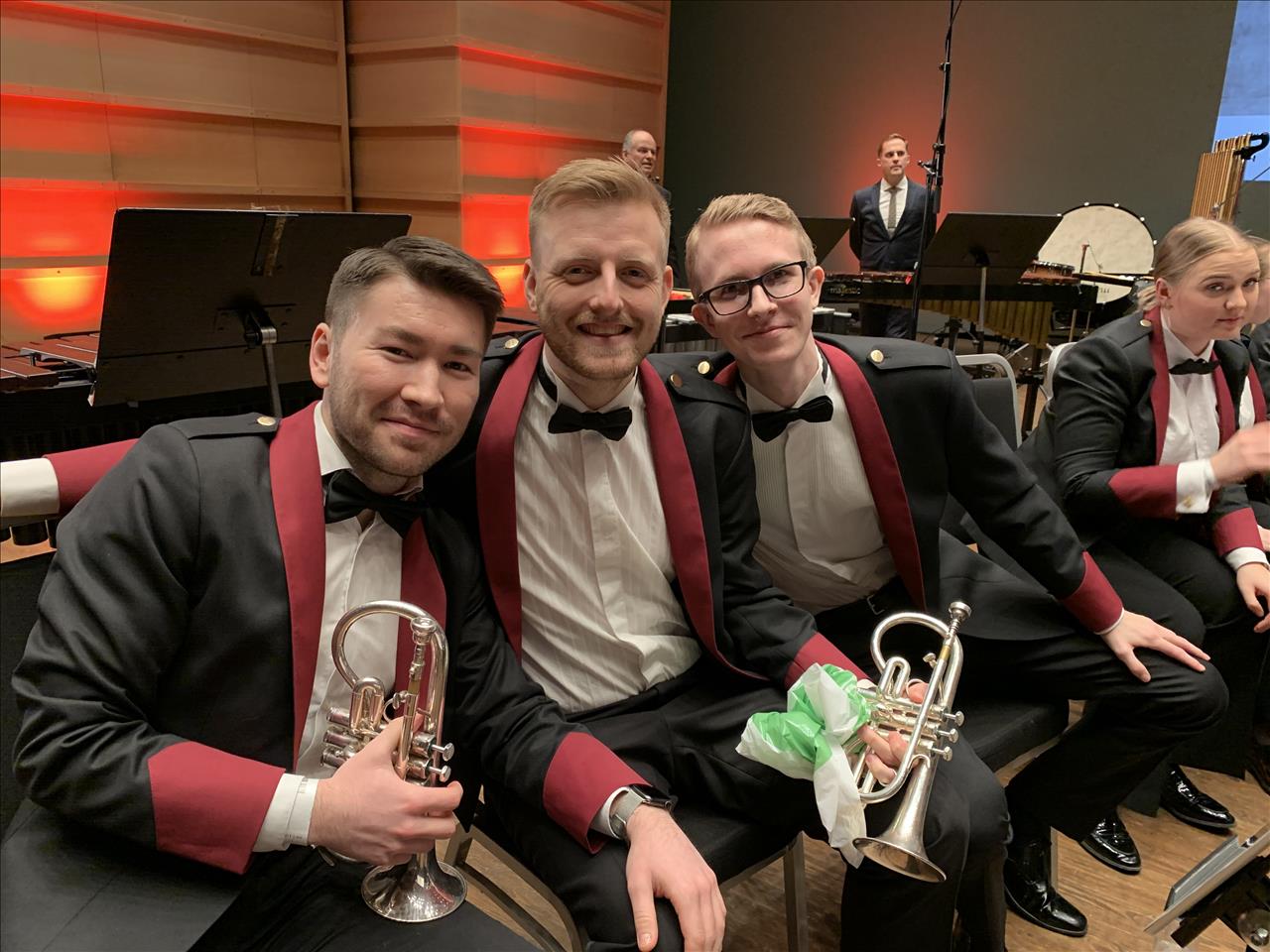
3. Kleppe Musikklag (Philip Hannevik)
A more free form, almost lyrical rendition this — a reflection of the MDs confident scoreless approach from the middle; someway between the forensic and psychotic — a horse killed with tender mercies before being disposed of to rot in the murky depths.
There was a bubbling intensity to the music, but it was one that had a tonal warmth and passion. Flugel flittered from position to position like a blow fly laying its eggs in open wounds and soloists added to the picture.
Just the occasional moments of unease troubled the imagery but the dance of death finale had a growing troubled intensity — as the protagonist was drawn ever close to their icy fate and that dramatic deadly denouement.
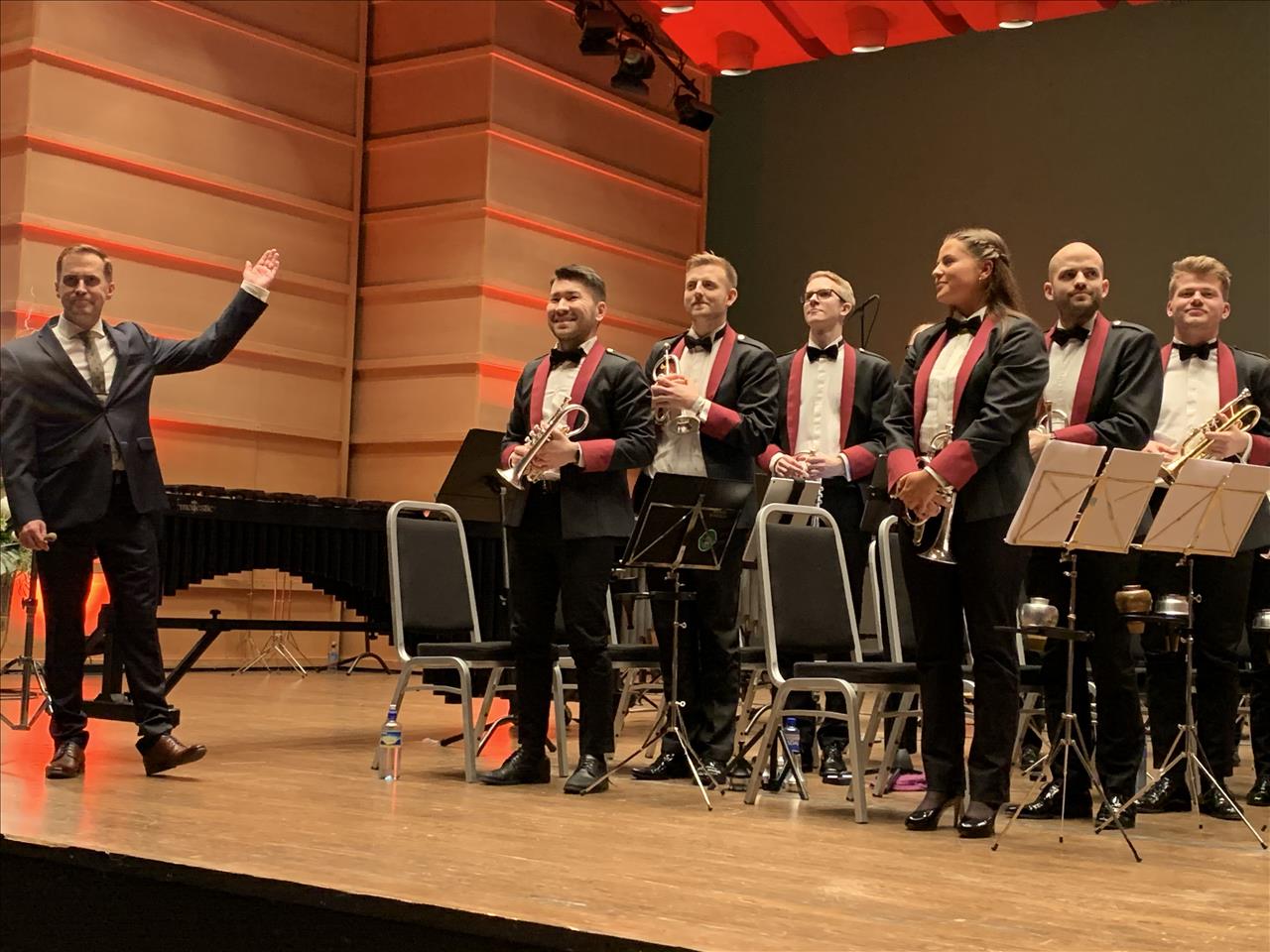
- Friday 7, 16:33:50
Elite Division:
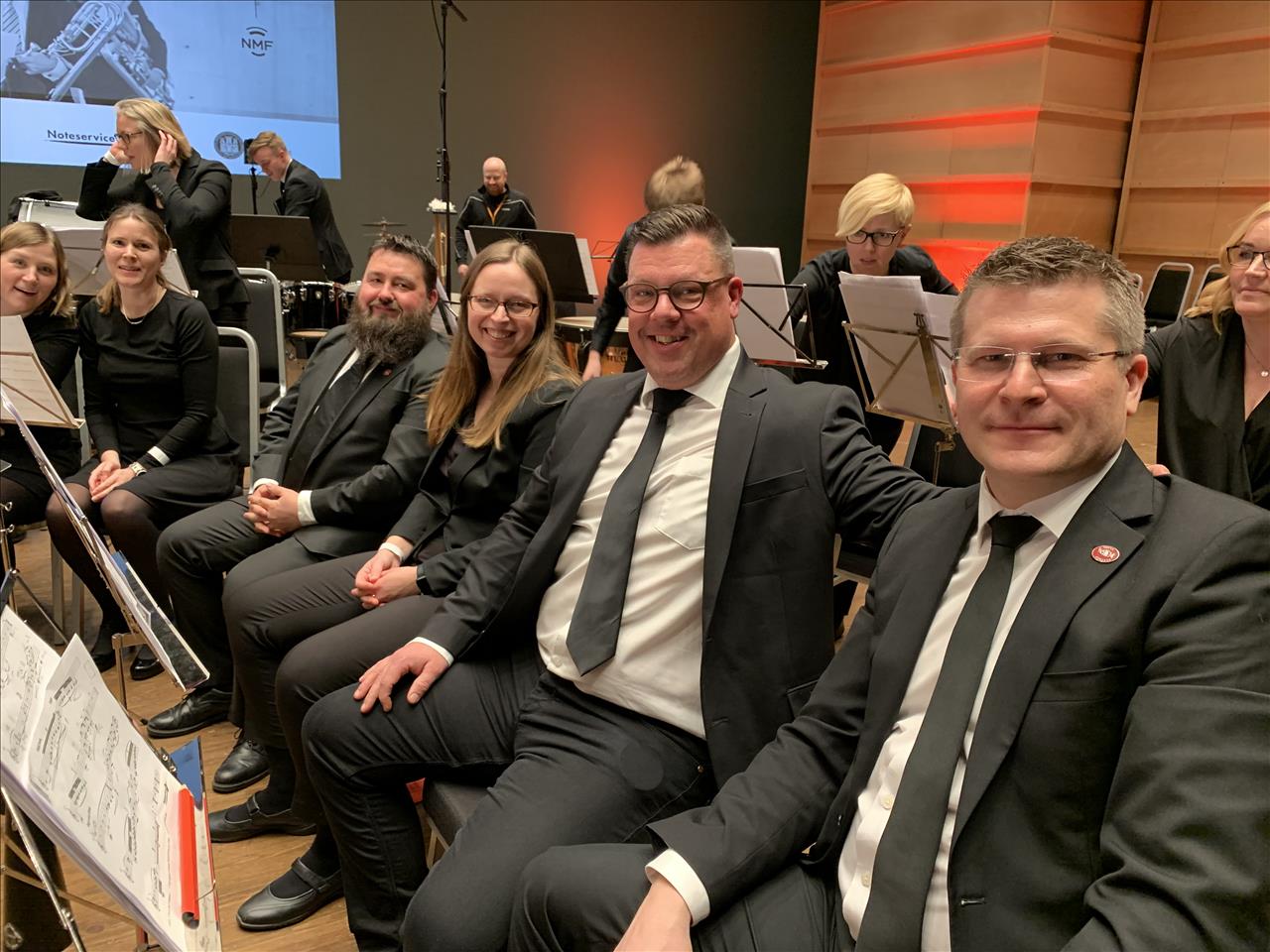
2. Tertnes Brass (Martin Winter)
This was a performance right out of the blackest imaginings of the MD — chilled viscera and congealed blood flow from the word go. No doubting what went on here at the pond of death.
There was also an acute awareness about the playing — super middle lines from flugel and horns adding the texture to the sharp bladed cornets and bludgeoning lower brass — resulting in so much clarity. Impish cornet contrasted with bravura euph and plaintive troms.
The dance of death finale had a hint of anguished madness too — keeping that surreal feel of gory happenings to come right at the point of the Mds dagger like baton which he points right into guts of the music. Super stuff.
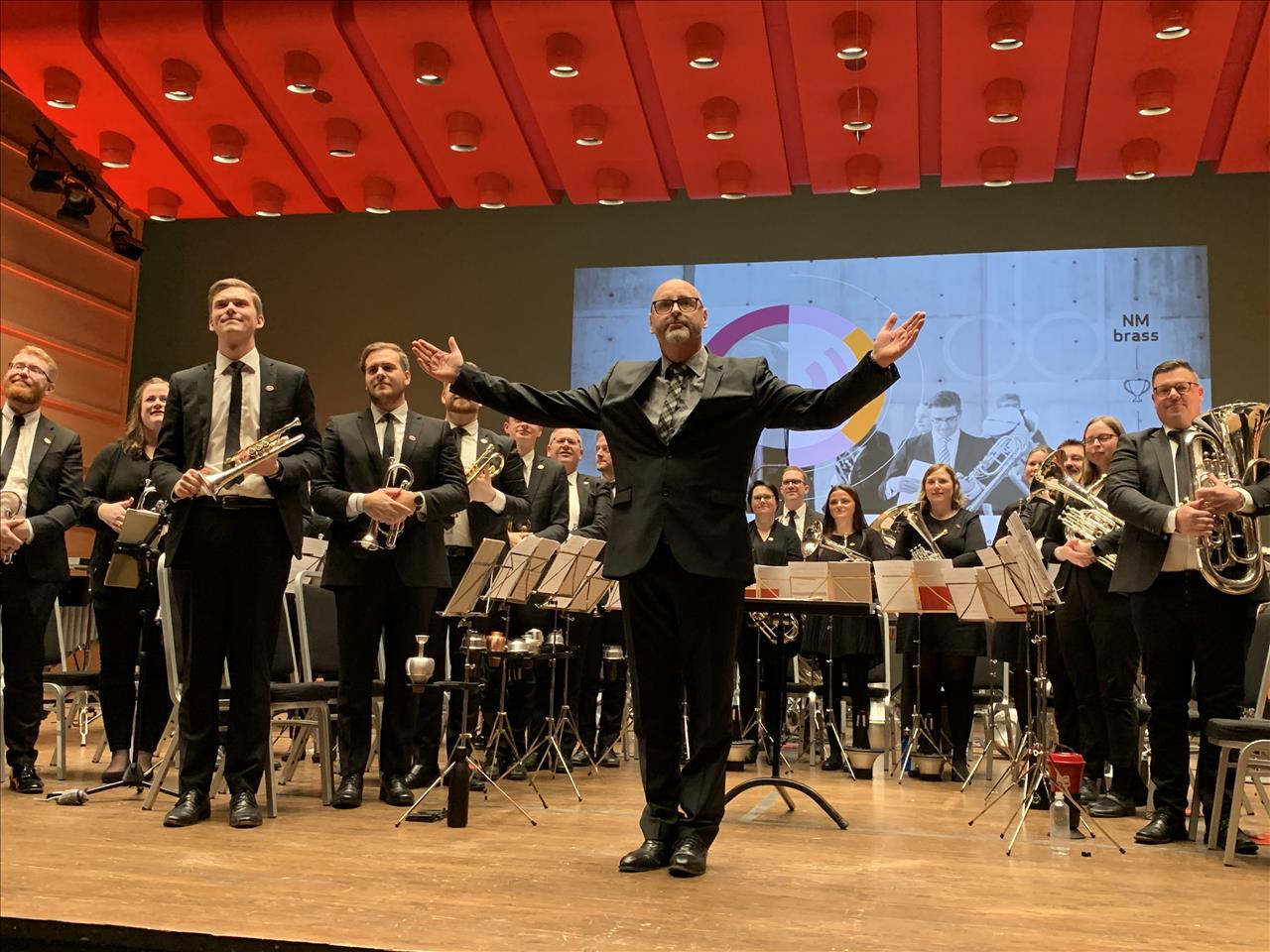
- Friday 7, 16:03:13
Elite Division:
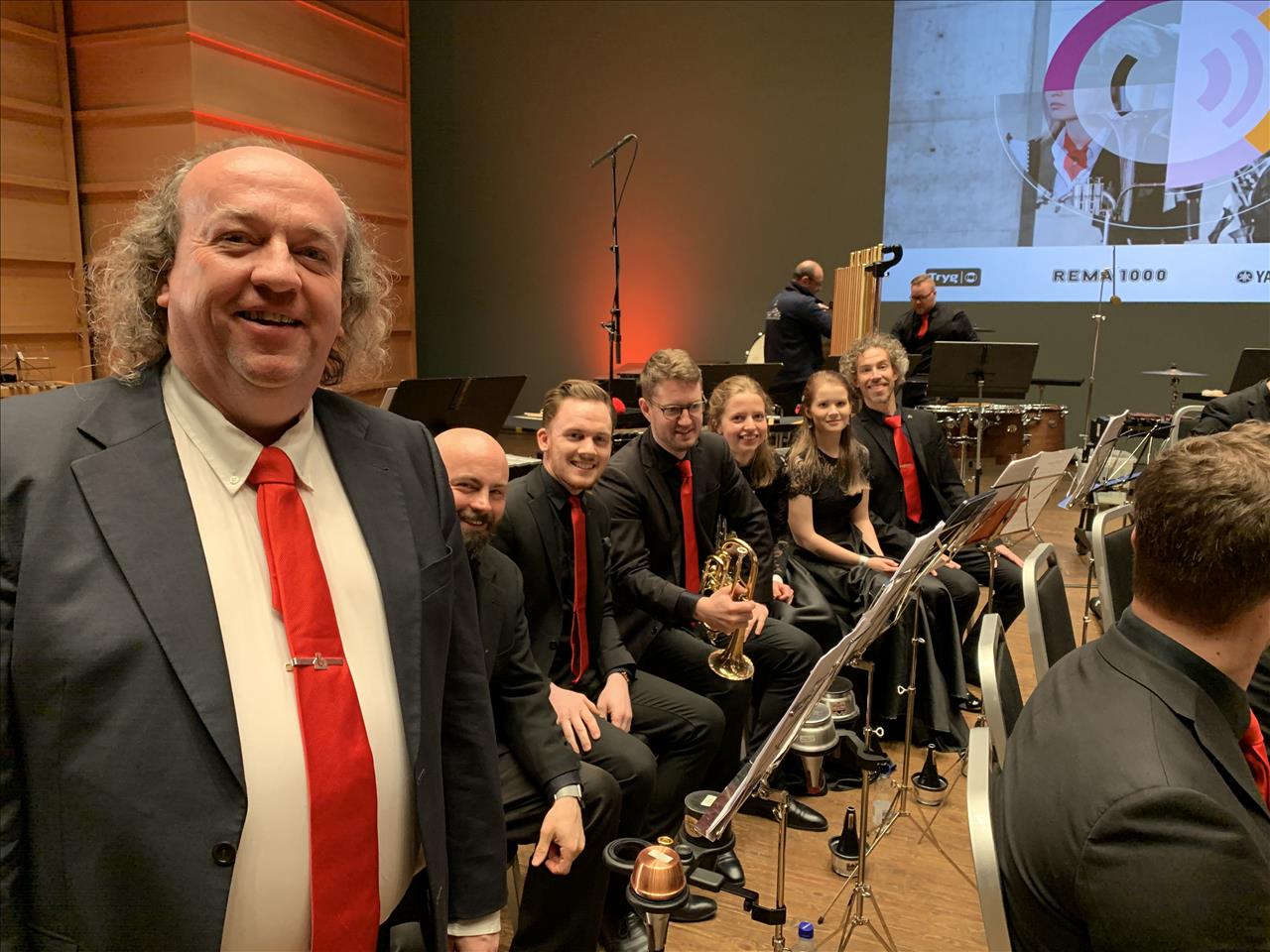
1. Oslo Brass (Ivan Meylemans)
A performance of wide, icy expanse and glacial drift this — right from the frosty, fragile edged opening.
The MD really captured the dark, disturbing essence of the music, drawing a palpable feel of impending danger and potential demise. Great colouring of the textures and balances — all played at an almost imperceptible flow.
Excellent solo lines brought a sharp focus (esp euph), but it was that underlying sense of coldness that permeated everything — even that dance-like ending. It was like looking into the lifeless pupils of that floating dead horse staring back deep into your soul.
That sent a chill down the spine in the best way possible.
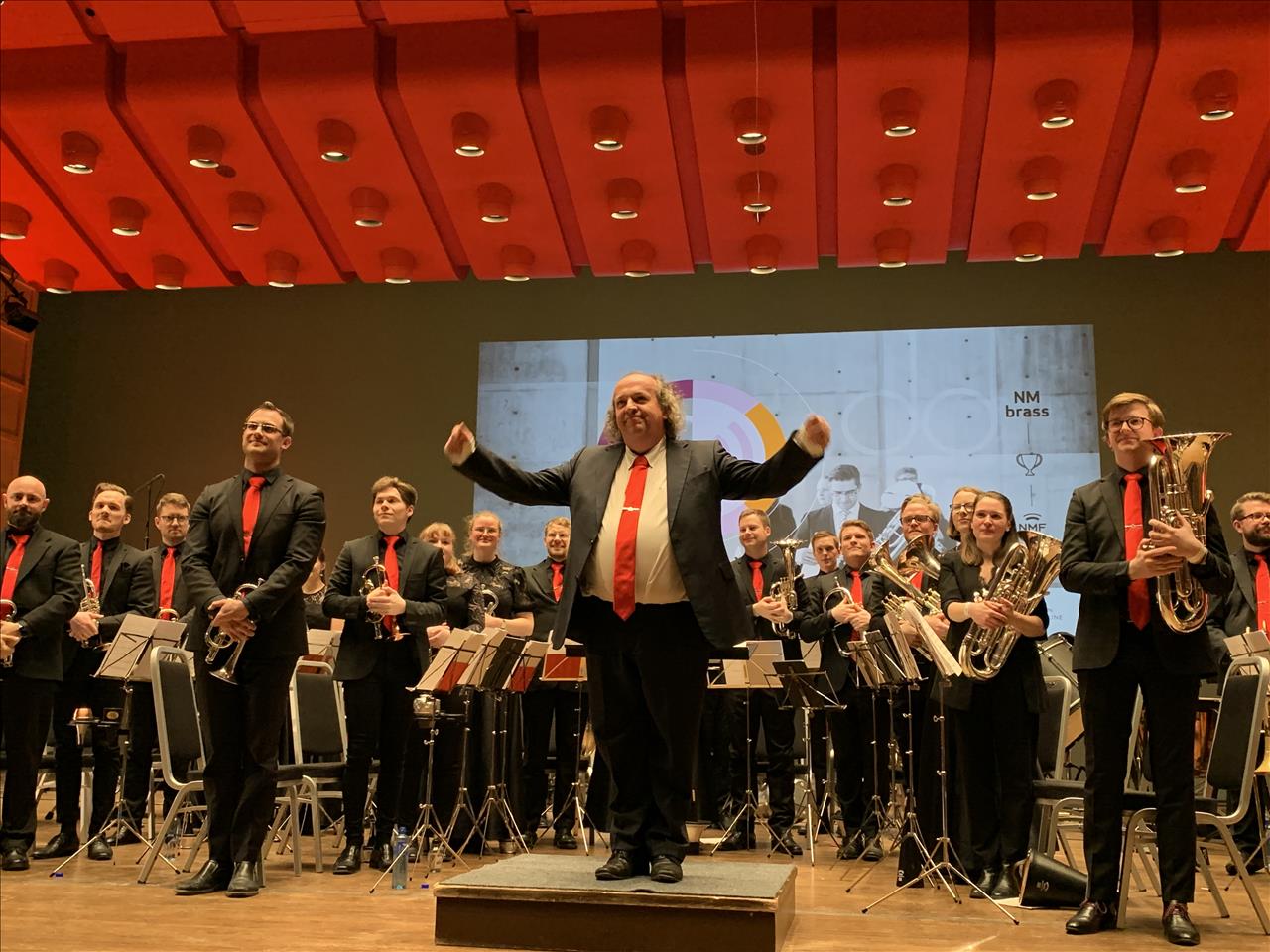
- Friday 7, 15:05:37
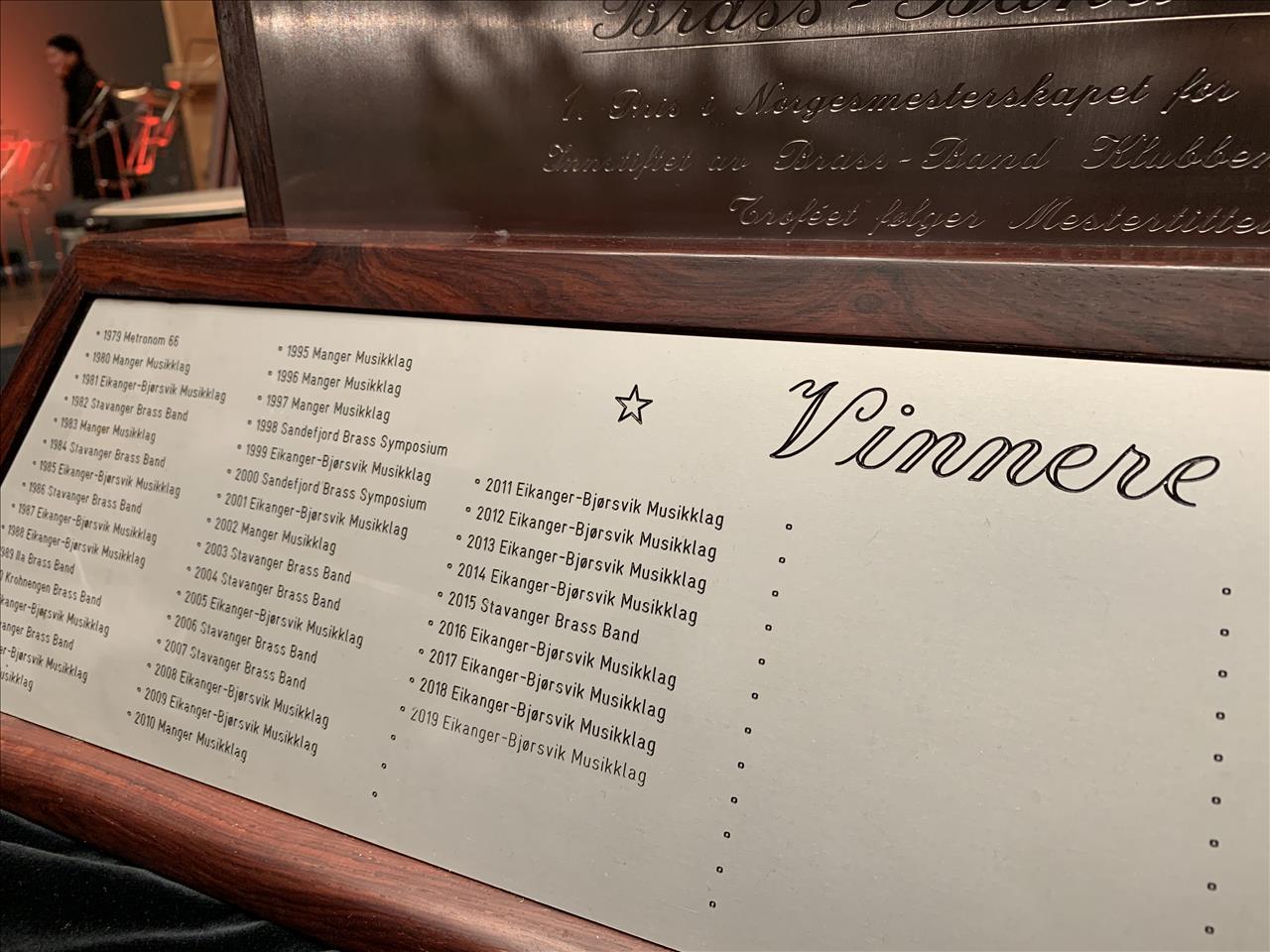
Elite Division:
Adjudicators:
Set Work: Bjorn Sagstad, Kim Lofthouse, Arsene Duc
Friday 7th February (4.00pm)1. Oslo Brass (Ivan Meylemans)
2. Tertnes Brass (Martin Winter)
3. Kleppe Musikklag (Philip Hannevik)
4. Bjorsvik Brass (Andreas Hanson)
5. Jaren Hornmusikkforening (Florent Didier)
6. Stavanger Brass (Allan Withington)
7. Oslofjord Brass (Frode Amundsen)
8. Manger Musikklag (Peter Sebastian Szilvay)
9. Eikanger Bjorsvik Musikklag (Ingar Bergby)
10. Krohnengen (Prof Nicholas Childs) - Friday 7, 14:55:55
Dark water and a dead horse...
Myth Forest (Hestefallstjonn) (Stig Nordhagen)
‘When you look into the abyss, the abyss also looks into you’- Friedrich Nietzsche
Stig Nordhagen's evocative work is inspired by the unworldly mystery of a Stygian frozen lake near to his home, called Hestefallstjenn.
It is a reflection on the feelings that permeate the conscious and subconscious mind when standing on its edge, peering into the dark, tar like waters that seem to have no end; a crepuscular journey to the margins of a gloomy, malodorous body of water bubbling with a menacing miasma of sulphurous intent—all with the corpse of a frozen, putrefied horse floating in it too.
And that is what the music portrays — with hooves on.
You can almost taste the sweet smell of decay in your nostrils as the sun slowly begins to warm the moist Nordic soil in the opening section, ‘Sunburst: The sun rises and rays of light shatter the morning mist’.
‘Bugs and Birds: Insects, small and large, come to life; birds are seeking water’, reveals that despite the apparent inhospitable nature, life still flickers across the meniscus tension of the lake’s surface.
However, there are no plump fruity blossoms to feast on, as a horrendously difficult vibraphone lead and taxing lines for horns and baritone show: They are the manic peckings of hungry fauna and blowflies feasting on a rotting equine cadaver.
As the composer peers ever deeper into the murky waters at his feet, the fulcrum is revealed in, ‘Black Water Abyss: The black and abysmal water holds many secrets.’
This is deeply disturbing writing — as if memories of a terrible tragedy are being played out in the mind.
The language is stark, distorted, unsettling; an undercurrent of an aching pulse that grows in emotional intensity before finally exploding in a vivid fugato.
The music dissipates into transition (featuring lead lines for euphonium, baritone, flugel and trombone), before emerging with hopefulness signified by the uplifting arpeggios of ‘Water Lilies: Water lilies are rising from the murky water, stretching for light’.
Here you are reminded of the painter Monet, and his cataract impaired vision of beauty as the plants seek what is an elusive path towards the warmth of the sun.
Rich textures are explored with the composer once again giving the lead to the darker timbres of the euphonium and baritone.
However, there is no peaceful resolution—the music turning once more to melancholia in ‘Echo from the other side: The echo does not always send back the answer you want.’
The final section is almost supernatural in intent: ‘The creatures of the forest are dancing into the night’; a dislocated, demanding waltz, full of menacing purpose, as the creatures both real and imaginary, gradually reclaim their rightful place in the Hestefallstjonn pond — eyes blazing with diabolic intent as the sun finally retreats meekly behind the ever darkening horizon.
It brings to an end a wonderfully engrossing work, written by a composer who offers a fascinating detour in scoring technique — although you wouldn’t want to be left alone on a bleak Nordic night with your thoughts to offer cold comfort on the banks of this particular Myth Forest pond...
This is music that leaves an icy expression on your countenance, laced with impending fears of a personal terminus - as if you are being drawn, like that poor beast, inexorably towards your own frozen death — your last breath freezing before your eyes as you slowly sink below the surface.
Iwan Fox
- Friday 7, 14:20:24
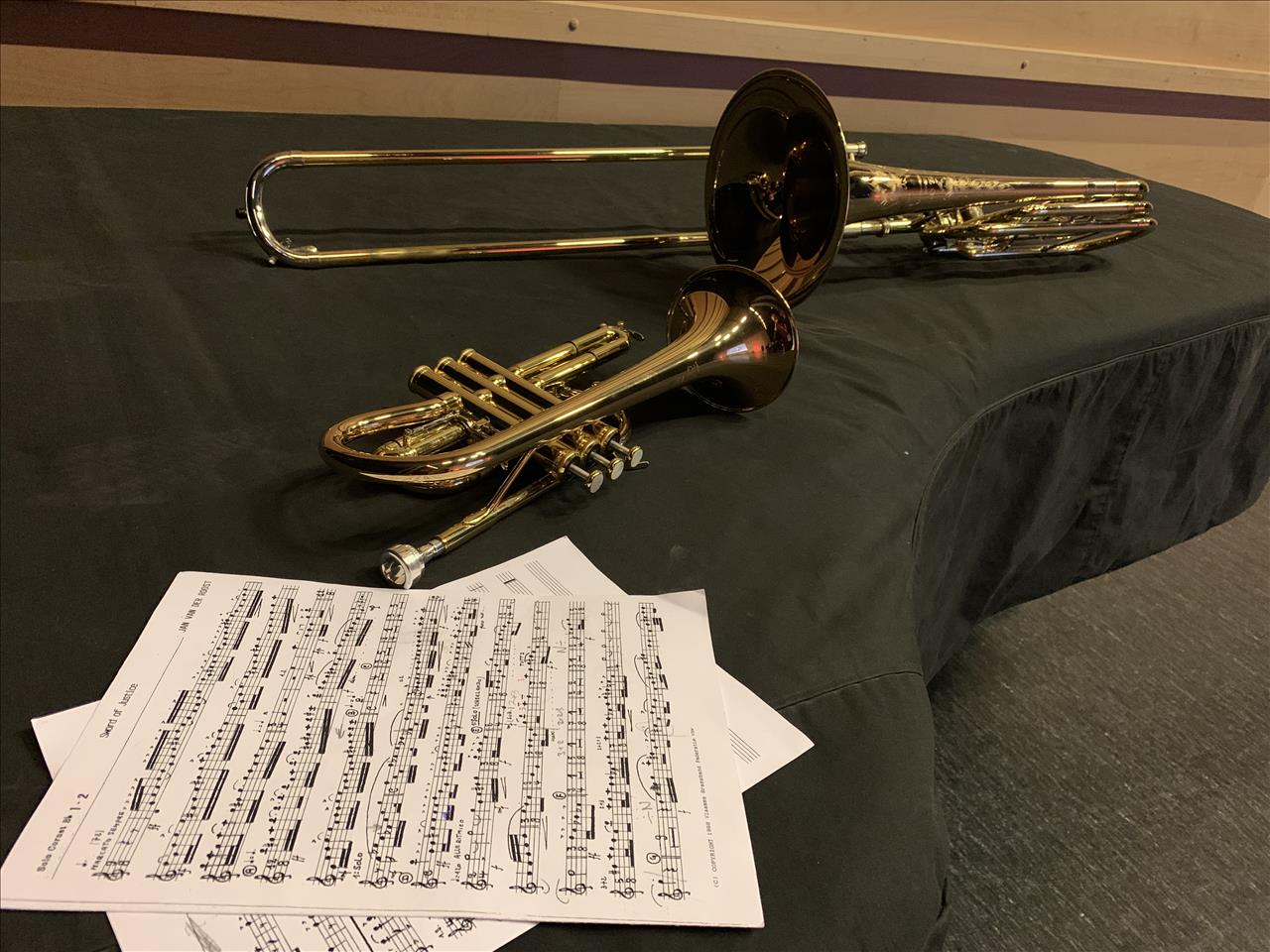
Getting to the halfway point
Its going to be a 12 hour day of action here at the Grieg Hall — with the first band on at 9.00am this morning and the last due to take the stage at 9.00pm this evening.
There will be a break before the Elite contenders take to the stage for the set-work discipline — with it due to start at 4.00pm local time.
In the meantime there has been plenty to enjoy popping in to hear the action in the Second and Fifth Sections.
As always no little amount of ambition on show — with a couple of Fifth Division contenders getting to grips with the likes of Oliver Waespi's 'The Graces of Love' and Thierry Deleruyelle's 'Viking Age' not to mention Bertrand Moren's 'Mountain Views'. All pretty good efforts as well.
In the Second division its been splendidly optimistic playing too — with a couple of bands just biting off a bit too much than they could chew.
Interesting new piece from Jonathan Bates too — with a dark, but exciting portrait of the great Nordic Antarctic explorer Amundsen. That will certainly be played again.
- Friday 7, 12:52:45
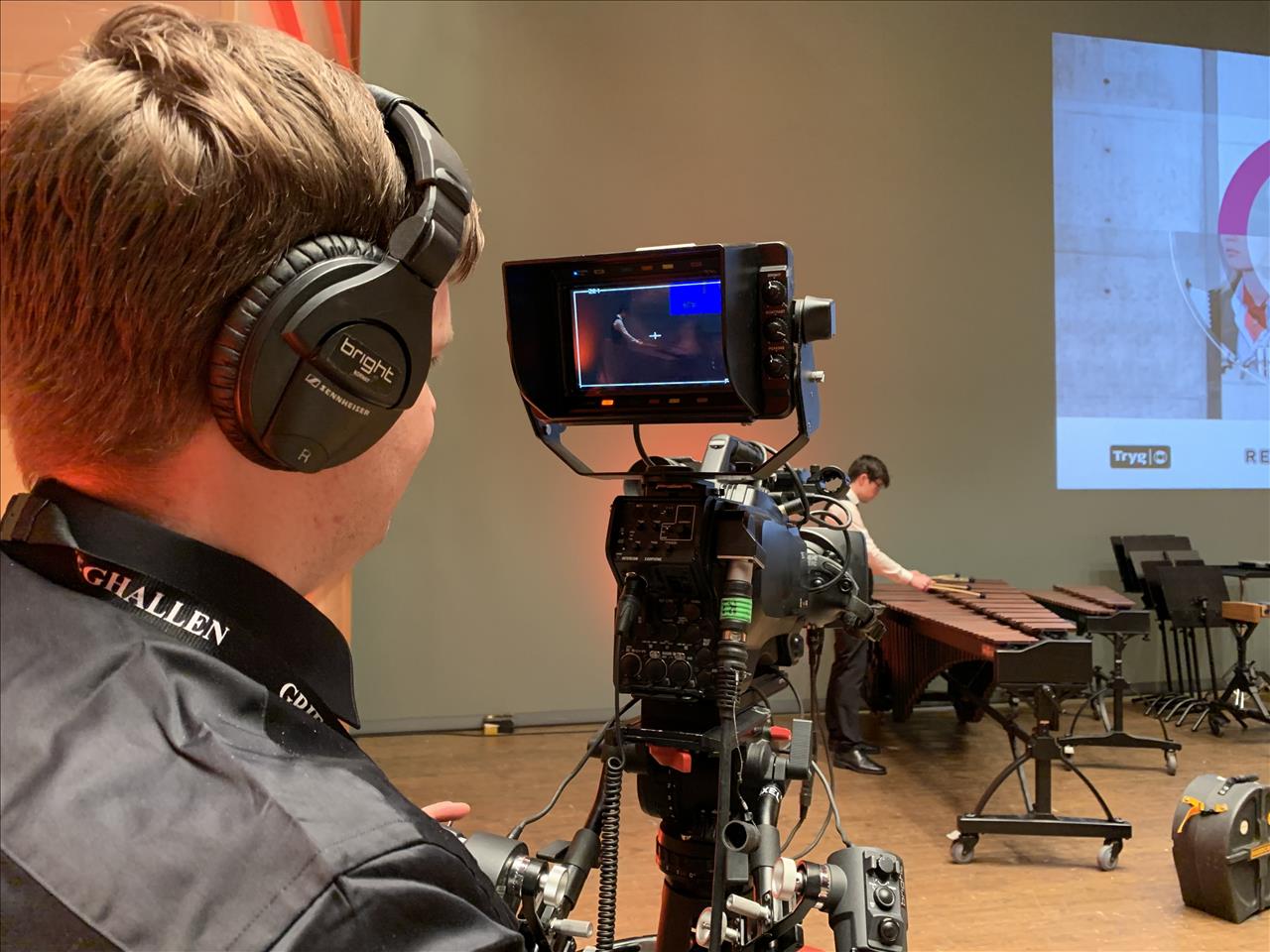
Beamed around the world...
The Norwegian's have been the pioneers of live-broadcasting of their event — this being the 11th time that it has been broadcast on-line.
This year they have a growing audience around the world — with people from the UK, USA and Australia already sat enjoying the music.
As always it is very well organised and produced — so click on the links above and make sure you enjoy the music making yourselves — its well worth the Krone...
- Friday 7, 12:11:24
Moving along slowly...
The Norwegians run their event to a strict timetable — and so we are on time in the main Grieg Hall with the Second Division, with band number 8 of 13 just about ready to take to the stage. In the Peer Gynt Hall we are up to band number 7 out of 11.
Lots to enjoy and admire — from the ambition of Tertnes Amatorkorps under Tormod Flaten playing 'English Heritage' to the wisest of wise old owls in Morten E Hansen leading Alexander Brassband in a super rendition of 'Brass Metamorphosis' by James Curnow.
We've just had a bit of Eric Ball too with 'Journey into Freedom' with a new work by Jonathan Bates to come inspired by the great Nordic explorer, 'Amundsen'.
- Friday 7, 12:04:17
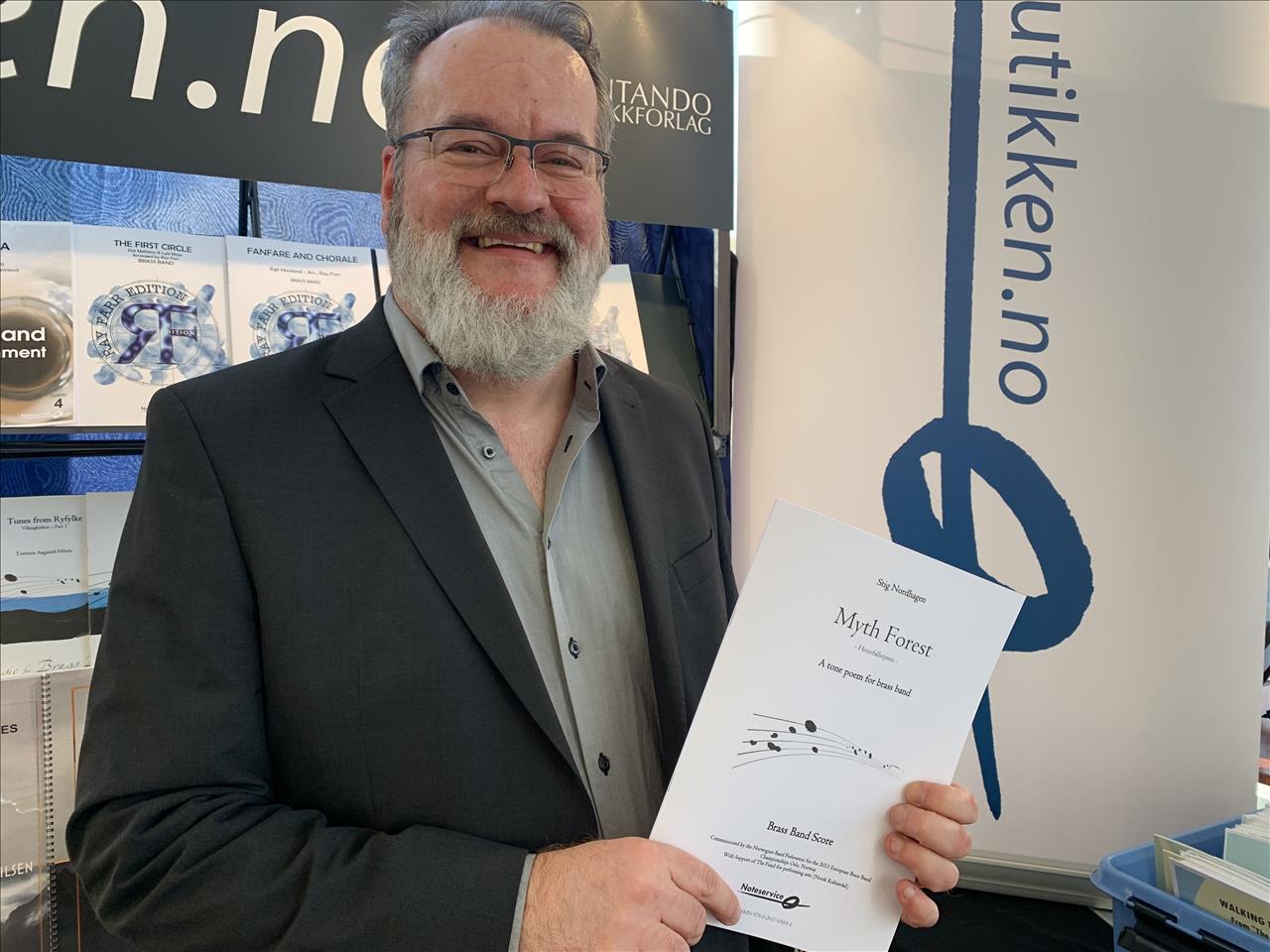
The Myth man...
Composer Stig Nordhagen has been signing study scores of his brilliantly evocative Elite Division test-piece, 'Myth Forest' here in Bergen.
The bands will be grappling with it later today — and looking deep into the dark, icy waters of the Hestefallstjonn lake — and that frozen corpse of a putrid horse that floats on top....
Now that's what we call a test piece....
- Friday 7, 11:14:56
The Vikings...
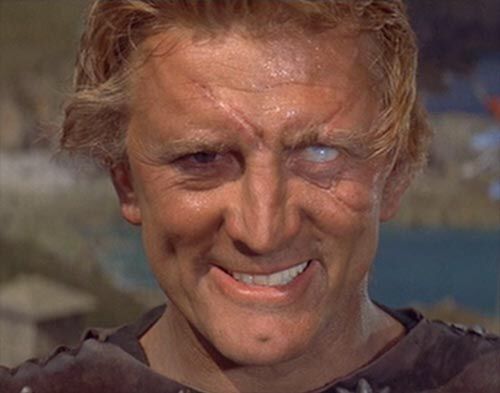
Seems rather appropriate that at least one band has given us music that reminds us all of the Norwegians' battling heritage — literally so with George Lloyd's 'English Heritage' — which is underpinned by a thematic melody right out of the 1958 film, 'The Vlkings'.
Somebody should be looking down from high then and enjoying himself...
- Friday 7, 10:22:38
Early morning delights...
There is always an eclectic selection of music played at this event — and if the first three bands in the Second Division are anything to go by we will be enjoying a veritable smorgasbord of repertoire today.
Where else would you get 'The Binding of the Wolf' conducted by the composer Torstein Aagaard-Nilsen himself, followed by a cracking account of the filmatic scope of 'Sinfonieta No 3' by Etienne Crausaz and then the classic 'Rhapsody in Brass' by Dean Goffin.
Talking of which — what a wonderful piece it remains — its musical integrity as strong as ever almost 80 years after it was written. The craftsmanship of the writing is superb.
Lots more to enjoy then — but what a super star to a long day.
- Friday 7, 09:00:19
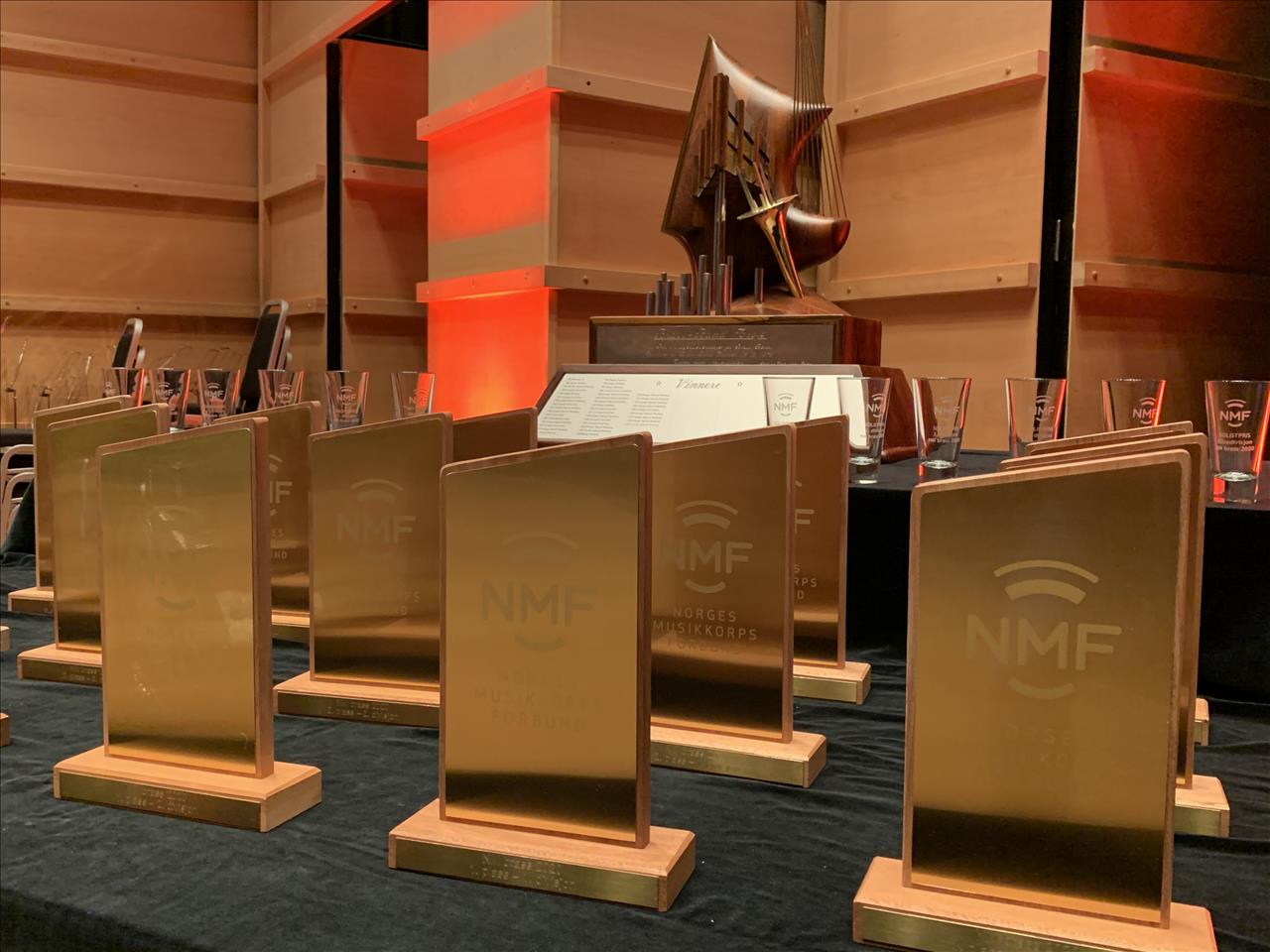
Good morning from Bergen...
The first post-Brexit brass band contest for 4BR — and given that it starts at 9.00am here in Bergen (8.00am) in the UK, its just like home... No one likes playing at this time in the morning...
Still — plenty to look forward to with the Second Division kicking things off here in the main Grieg Hall and the Fifth Division taking place in the Peer Gynt Hall.
We'll be flirting between the two this morning to get a flavour of what is going on and enjoying the music — which as always here, mixes ambition with brilliant ability.... 95% of the time...
- Friday 7, 07:02:54
Two days of action...
Elite Division:
Adjudicators:
Set Work: Rex Martin, Lito Fontana, Sheona White
Friday 7th February (4.00pm)
Own Choice: Bjorn Sagstad, Kim Lofthouse, Arsene DucSaturday 8th February (2.45pm)
Set Work/Own Choice = TotalCompeting bands:
Bjorsvik Brass (Andreas Hanson)
Eikanger Bjorsvik Musikklag (Ingar Bergby)
Jaren Hornmusikkforening (Florent Didier)
Kleppe Musikklag (Philip Hannevik)
Krohnengen (Prof Nicholas Childs)
Manger Musikklag (Peter Sebastian Szilvay)
Oslo Brass (Ivan Meylemans)
Oslofjord Brass (Frode Amundsen)
Stavanger Brass (Allan Withington)
Tertnes Brass (Martin Winter)
Soloist Prize (Own Choice):
Section Award: (Set Work):The winning band receives invitation to represent Norway at the 2021 European Championships
First Division:
Saturday 8th February
8.30am
Adjudicators: Bjorn Sagstad, Katrina Marzella, Arsene DucDraw:
1. Molde Brass (Russell Gray)
2. Sola Brass Band (Gwyn Evans)
3. Askoy Brass Band (Reid Gilje)
4. Tomra Brass Band (Frans Violet)
5. Radoy Brass (Bjorn Breistein)
6. Brottum Brass (Ray Farr)
7. Rong Brass (Erik Janssen)
8. Hasle Brass (Robert Solberg Nilsen)
9. Sandefjord Brass Symposium (Helge Haukas)
10. Flesland Musikklag (Thor-Arne Pedersen)
11. Musikkorpset Gjallarhorn (Adam Cooke)
12. Ila Brass (Magnus Brandseth)Solo Prize:
Section Award:Second Division:
Friday 7th February
9.00am
Adjudicators: Lito Fontana, Katrina Marzella1. Jolster Musikklag (Torstein Aagaard-Nilsen)
2. Oster Brass (David Morton)
3. Krohnengen Old Stars (Oyvind Raknes Nikolaisen)
4 Alexander Brass Band (Morten E Hansen)
5. Tertnes Amatorkorps (Tormod Flaten)
6. Tysnes Musikklag (Yngve Nikolaisen)
7. Nes Musikkforening (Thorbjorn Lunde)
8. Orskog Brass (Jonathan Bates)
9. Folleso Musikklag (Thorgeir Thunestvedt)
10. Manger Old Star Brass (Margaret Antrobus)
11. Sorum Musikklag (Elsine Haugstad)
12. Fjell Brass (Joseph Cook)
13. Lindas Brass (Vidar Nordli)Solo Prize:
Section Award:Third Division:
Friday 7th February (4.00pm)
Adjudicators: Rex Martin, Sheona White1. Gjovik Bybrass (Morten Fagerjord)
2. Bjorvika Brass Band (Robert Solberg Nilsen)
3. Stangaland Brass (Paul Hughes)
4. Stavanger Kommunes Korps (Morten Ovrebekk)
5. Tromso Brass (Maria Nygard Molund)
6. Haukas Musikklag (Yngve Nikolaisen)
7. Norheimsund Musikklag (Patrik Randefalk)
8. Trondheim Politis Brassband (Espen Andersen)
9. Skui Brassband (Hans Andreas Kjolberg)
10. Laksevag Musikkforening (Fredrick Schjelderup)
11. Sagvag Musikklag (Tom Davoren)
12. Bergen Brass Band (Thor-Arne Pedersen)
13. Lyshornet Brass (Oyvind Raknes Nikolaisen)
14. Valdres Brass (Rune Furoy Johansen)
15. Agder Brass (Eirik Gjerdevik)Solo Prize:
Section Award:Fourth Division:
Saturday 8th February (9.30am)
Adjudicators: Kim Lofthouse, Selmer Simonsen1. Filadelfia Hornorkester Drammen (Pal Andre G Worren)
2. Floro Hornmusikk (Torgeir Halvorsen)
3. Indre Torungen Brass Ensemble (Lars Bjornar Strengenes)
4. Fraena Musikkorps (Jens Kristian Mordal)
5. Grenland Brass (Tommy Sorby)
6. Moen Musikkforening (Ole Kristian Egge)
7. Tysvaer Brass (Martin Kinn)
8. Gjesdal Brass Band (Jonas Skartveit Rogne)
9. Kjolsdalen Musikklag (Arvid Anthun)
10. Hetlevik Musikklag (Sturle Berntsen)
11. IMI Brass (Halvor Gaard)
12. Saksumdal Musikkforening (Andres Halla)
13. Flora-Bremanger Brassband (Johnny Saelemyr)
14. Frei Hornmusikk (Stein Age Sorlie)Solo Prize:
Section Award:Fifth Division:
Friday 7th February (9.30am)
Adjudicators: Bengt Florvag, Svein Henrik Giske1. Fla Musikkorps (Odd Steinar Morkved)
2. Sotra Brass (Ben Hirons)
3. Riska Brass Band (Espen Westbye)
4. Skeie Brass (Nigel Fielding)
5. Langhus Brass (Tomas Austestad)
6. Randaberg Musikkorps (Pal Magne Austernes-Underhaug)
7. Lismarka/Mesnali Brass (Andres Halla)
8. Fjordbrass-Lavik (Jason Burn)
9. Holmestrand Ungdomskorps (Arild Ovrum)
10. Brumunddal Brass (Gunnar Roen)
11. Otta Musikkforening (Per Kritian Syversen)Solo Prize:
Section Award: - Friday 7, 00:15:26
When and where:
Friday 7
Elite Division — Set work: 1600 — Griegsalen
2 Division: start 0900 — Griegsalen
3 Division: start — 1600 — Peer Gynt-sal
5 Division: start — 0900 — Peer Gynt-salSaturday 8
Elite Division Own Choice: start — 1445 — Griegsalen
1 Division: start — 0830 — Griegsalen
4. Division: start — 0930 — Peer Gynt-sal

2020 Norwegian National Championships
As it happened
All the action from the 2020 Norwegian National Championships — as it happened.
Support us for less than a cup of coffee...
4BR wants to ensure that the brass band movement remains vibrant and relevant. We also want to be able to question, challenge and critically examine those who run and play in it, producing high quality journalism that informs as well as entertains our readers.
So if like us you value a strong, independent perspective on the brass band world - then why not consider becoming a supporter and help make our future and that of a burgeoning brass band movement more secure.
So one less cappuccino then?












